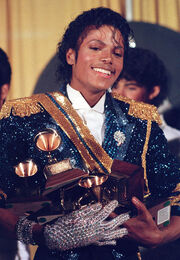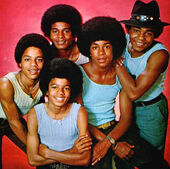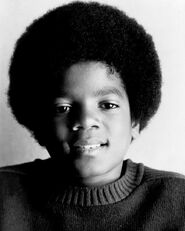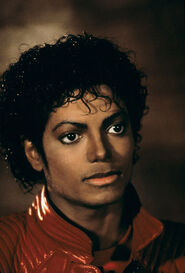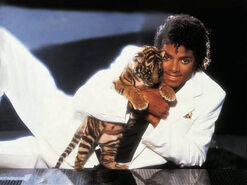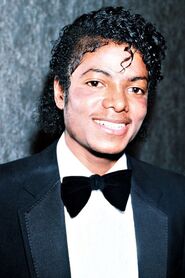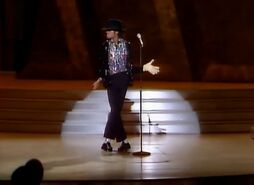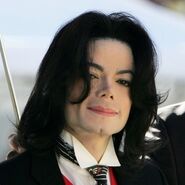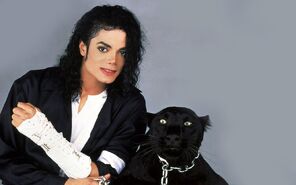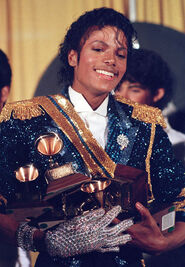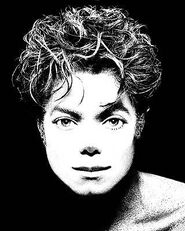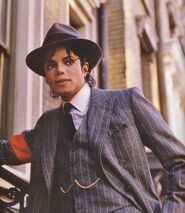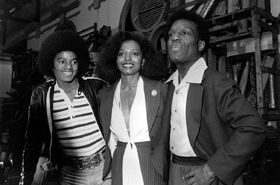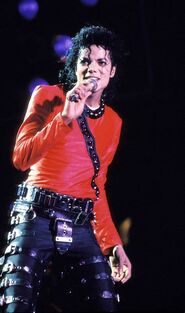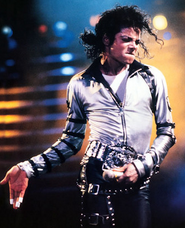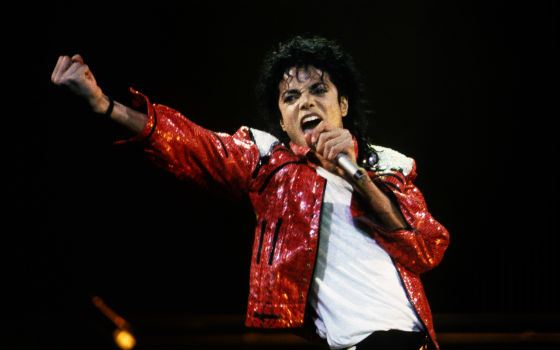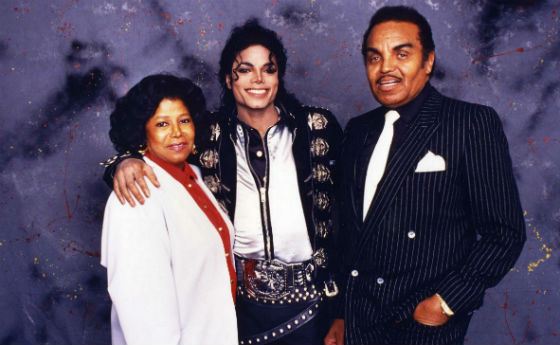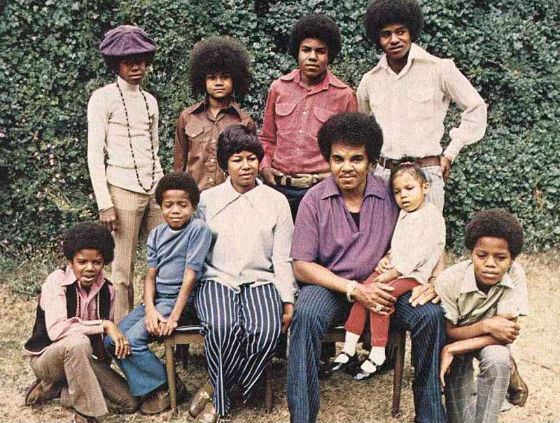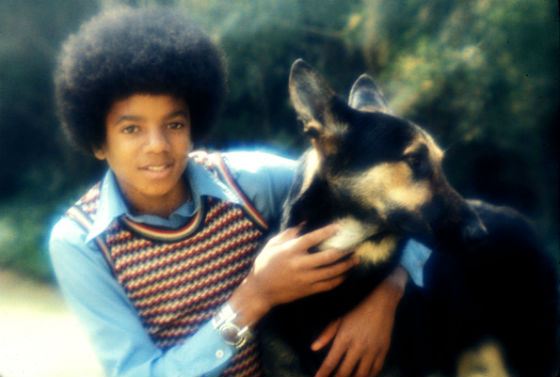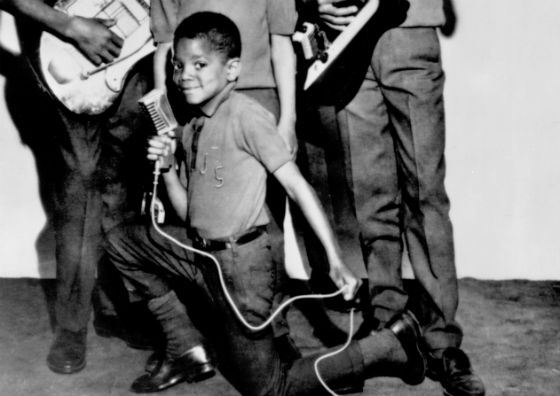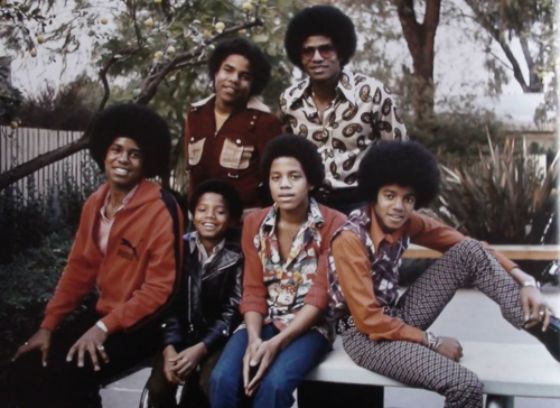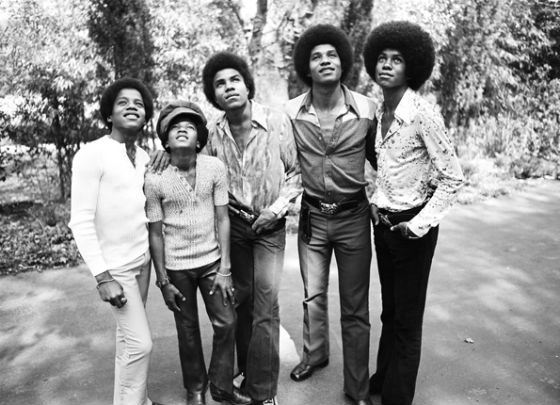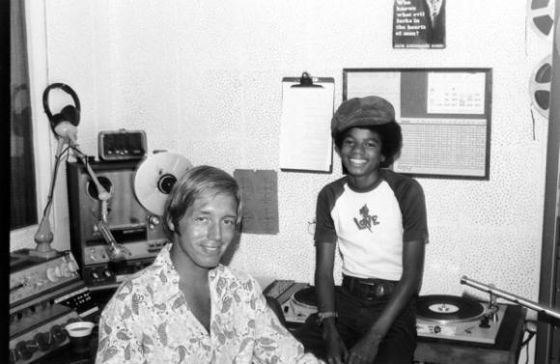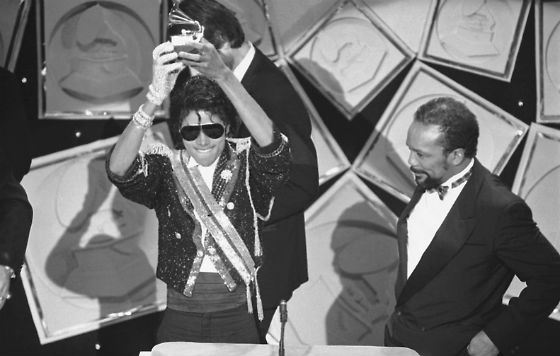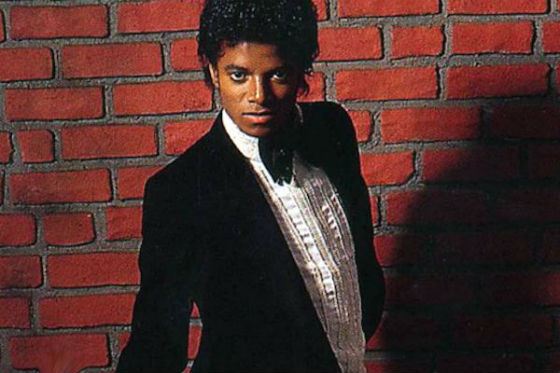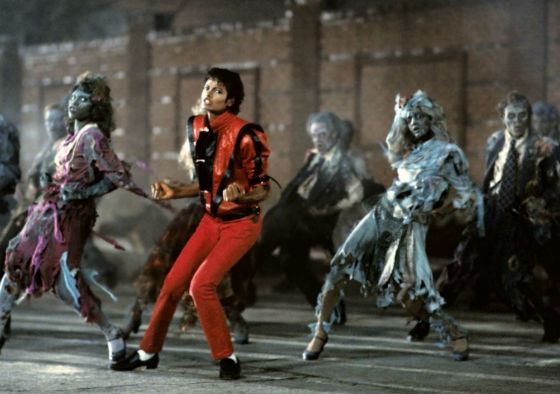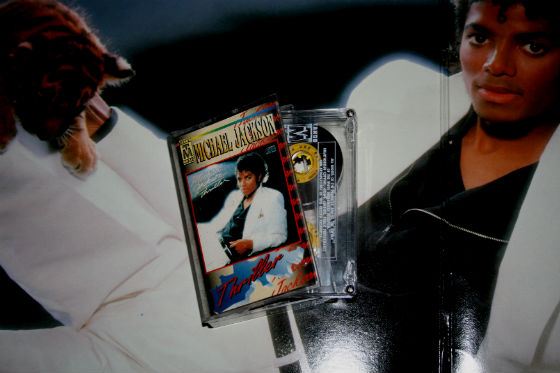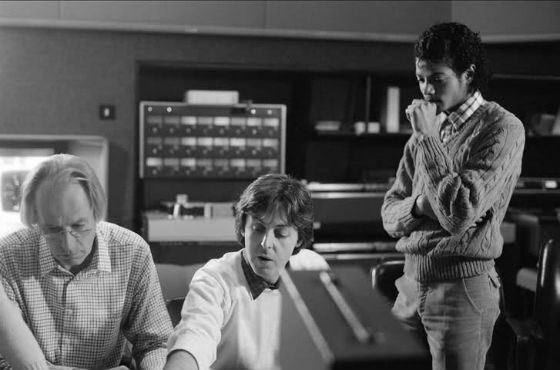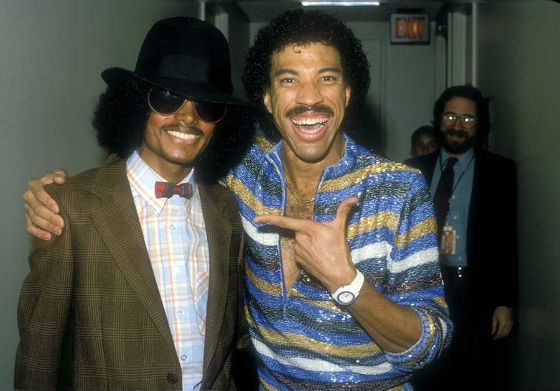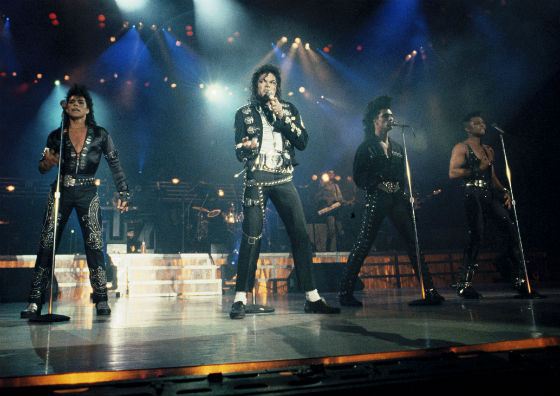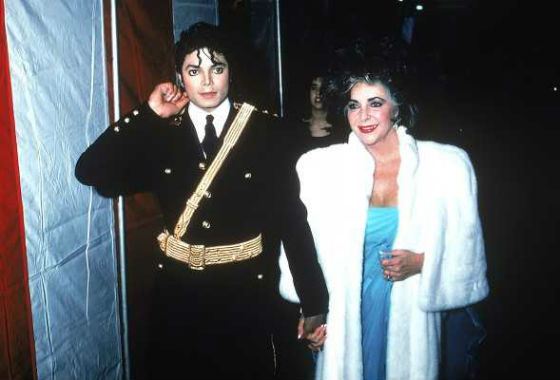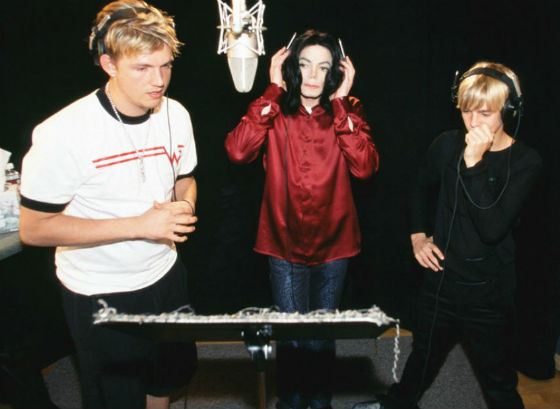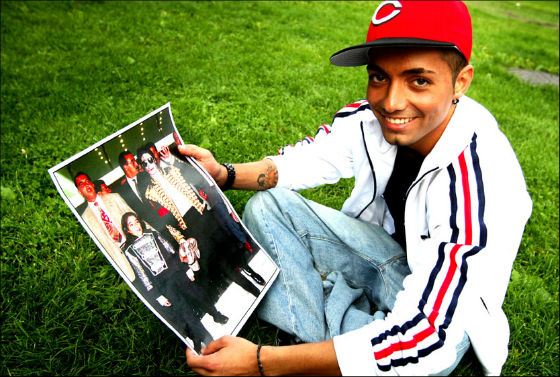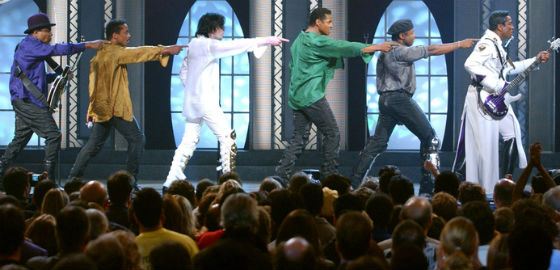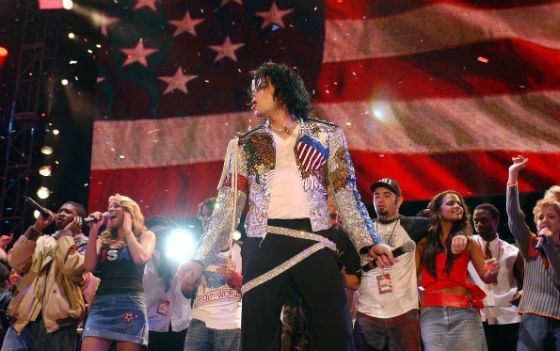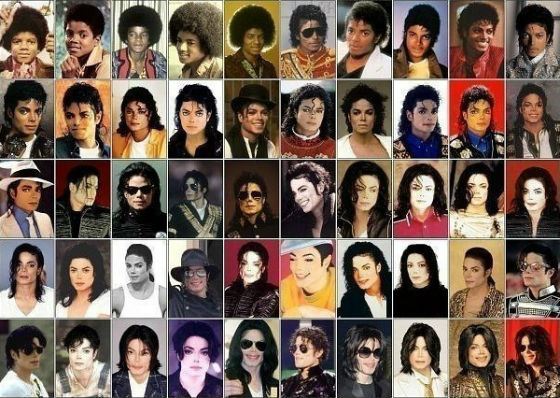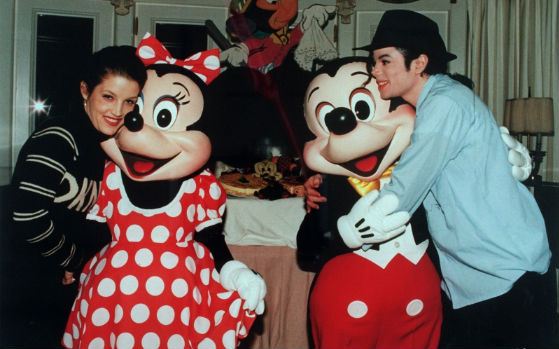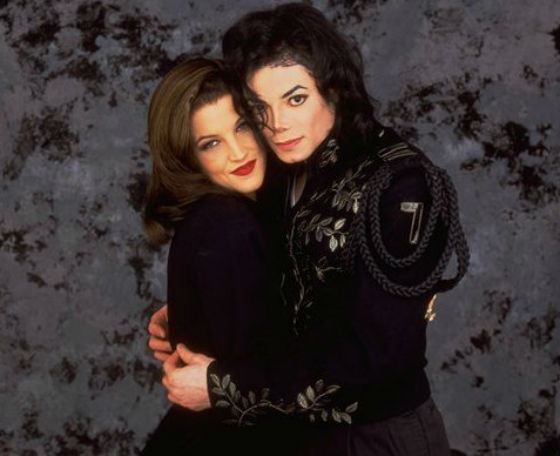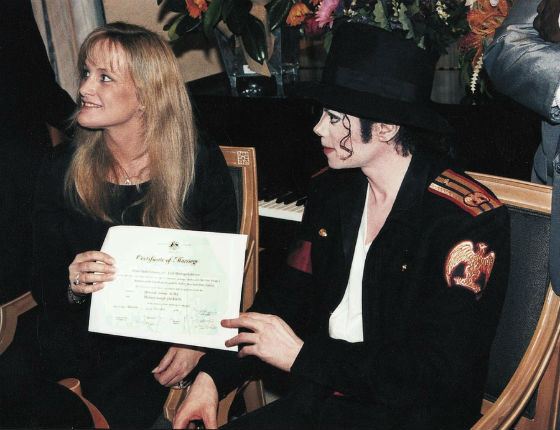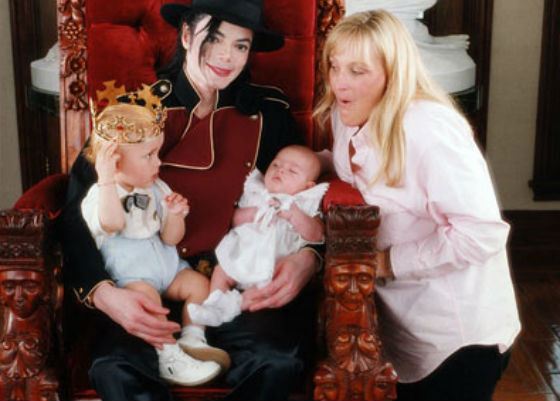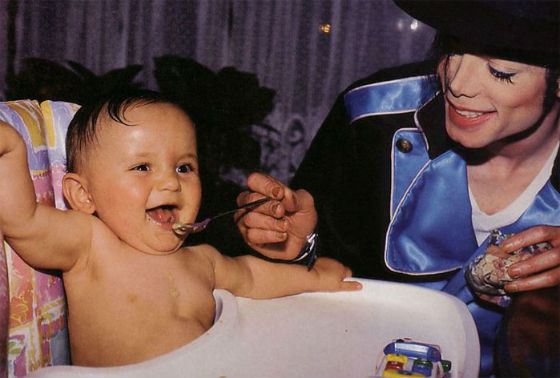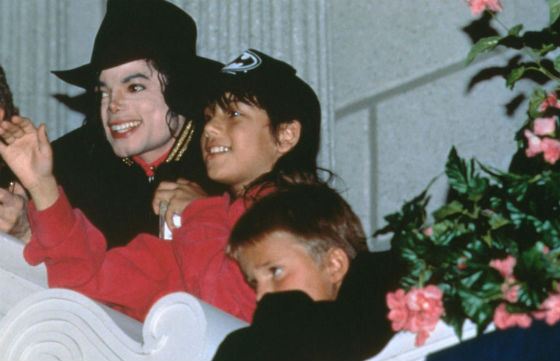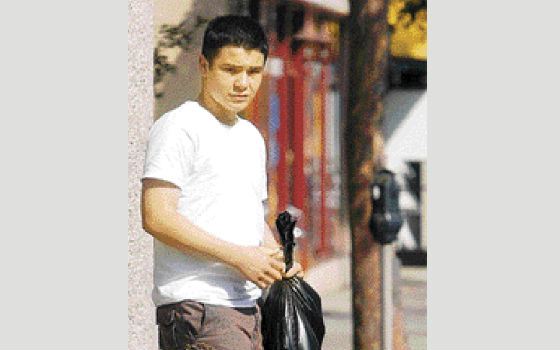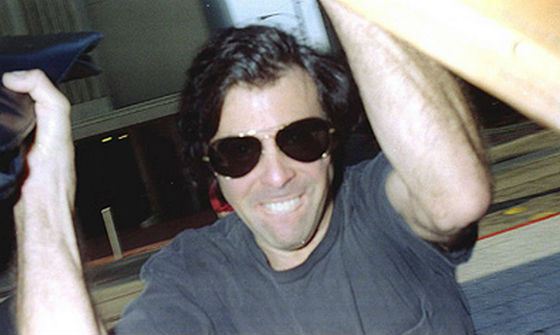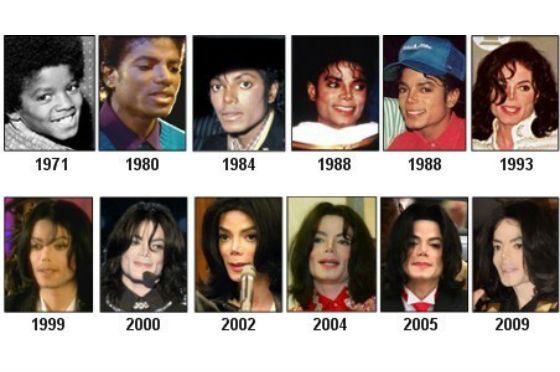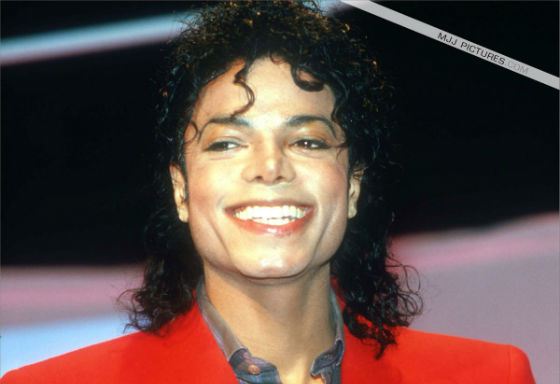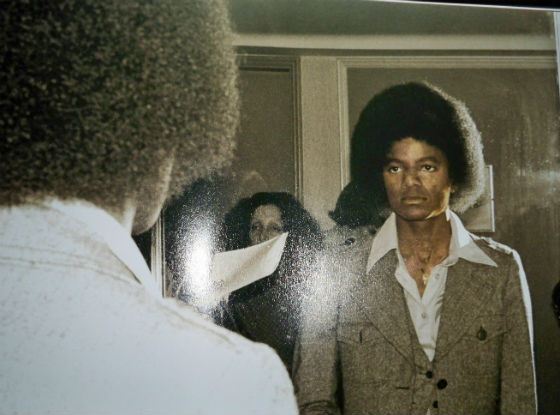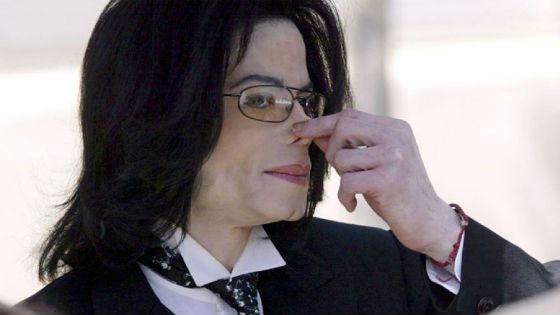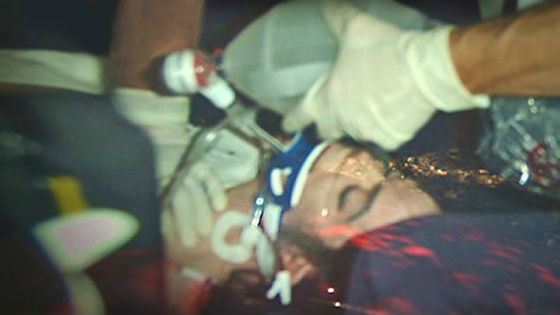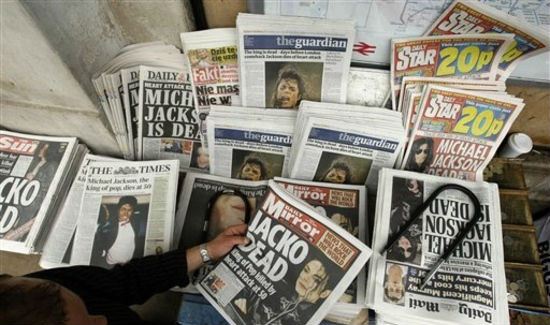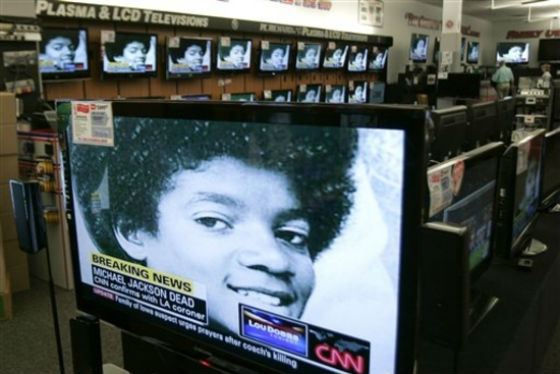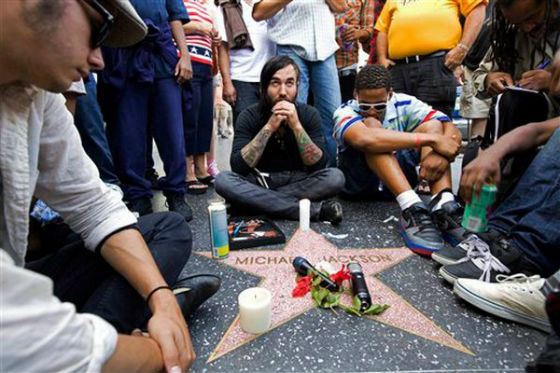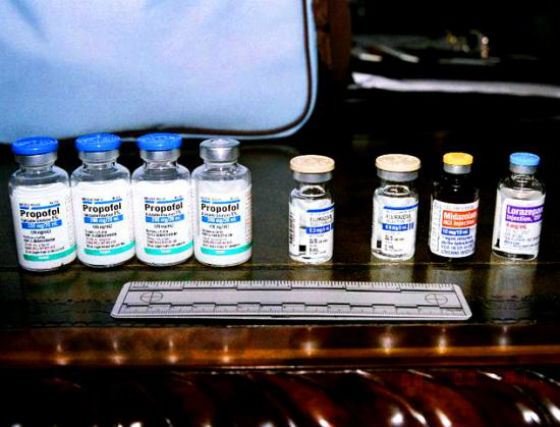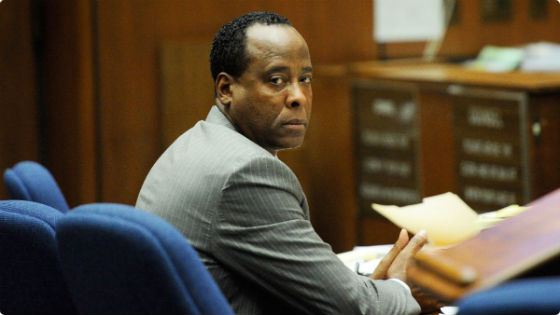Michael Jackson was an American singer, songwriter and legendary dancer. He was and is still known as the king of the pop scene. He became the idol of millions and was a grandee who had hundreds of different prizes among which there were 15 Grammy awards.
However, Michael’s childhood was not so happy. He was the seventh son in the family. His father was often cruel to him and regularly beat Michael and his brothers. Nevertheless, the cruelty of the father did not stop young Jackson from expressing his talent. His debut was in 1964 as a part of «The Jackson 5» in which he played music with his brothers.
In 1970 Michael Jackson decided to become an independent artist and separated from his brothers. In 1973 he recorded his first four albums. At that time he also created and showed the world his miraculous moonwalk. In 1982 the album “Thriller” came out and brought Jackson an unexpected fame. The album made Michael a superstar and was being copied all over the world.
In 2009 after a long pause Michael decided to organise his last world tour. An unbelievable and absolutely exciting show was being prepared. However, the tour did not take place. Michael Jackson died on June, 25 2009. His death is still a mystery as there are many theories among which the most popular is that he was killed on purpose. Anyway, his death shocked millions of people, his fans became depressive and some of them even committed suicide.
After that Michael Jackson was officially recognized as a legend and an icon of American Music. It was admitted that he made a significant contribution to the development of popular music, video, dance and fashion.
Перевод:
Майкл Джексон был американским певцом, автором песен и легендарным танцором. Он был и по сей день считается королем поп-музыки. Он стал идолом для миллионов людей и был признанным артистом, получившим сотни наград, 15 из которых были премии Грэмми.
Однако детство Майкла не было таким счастливым. Он был седьмым сыном в семье. Его отец часто был жестоким и постоянно бил Майкла и его братьев. Тем не менее, жестокость отца не стала преградой таланту молодого Джексона. В 1964 году он дебютировал на сцене в составе «The Jackson 5», в которой играл с братьями.
В 1970 Майкл Джексон решил стать самостоятельным артистом и отделился от своих братьев. В 1973 он записал свои первые 4 альбома. В то же время он создал и показал миру свою удивительную лунную походку. В 1982 вышел альбом «Триллер» и принес Джексону неожиданную славу. Альбом сделал Майкла суперзвездой и копировался по всему миру.
В 2009 году, после долгого перерыва, Майкл решил организовать свое последнее мировое турне. Невероятное и совершенно захватывающее шоу готовилось для турне. Однако оно не состоялось. 25 июня 2009 года Майкл Джексон умер. Его смерть по сей день – тайна, поскольку существует множество теорий, самой популярной из которых является та, согласно которой, он был убит намеренно. В любом случае, его смерть шокировала миллионы людей, его фанаты подверглись депрессивному состоянию и некоторые из них даже покончили жизнь самоубийством.
После смерти Майкл Джексон был официально признан легендой и иконой американской музыки. Было признано, что он внес значительный вклад в развитие поп-музыки, клипов, танцев и моды.
Выражения и слова:
Grandee –признанный авторитет (в своей профессии)
To separate from – отделиться от…
To record an album – записать альбом
world tour – мировое турне
to take place – состояться
to committ suicide – покончить жизнь самоубийством
to be recognized – быть признанным
to make a contribution – внести вклад
Michael Joseph Jackson (August 29, 1958 – June 25, 2009) was an American singer, songwriter, dancer, and philanthropist. Dubbed the «King of Pop», he is regarded as one of the most significant cultural figures of the 20th century. Over a four-decade career, his contributions to music, dance, and fashion, along with his publicized personal life, made him a global figure in popular culture. Jackson influenced artists across many music genres; through stage and video performances, he popularized complicated dance moves such as the moonwalk, to which he gave the name, as well as the robot. He is the most awarded musician in history.
|
Michael Jackson |
|
|---|---|

Jackson performing in Vienna in 1988 |
|
| Born |
Michael Joseph Jackson August 29, 1958 Gary, Indiana, U.S. |
| Died | June 25, 2009 (aged 50)
Los Angeles, California, U.S. |
| Cause of death | Acute propofol and benzodiazepine intoxication |
| Burial place | Forest Lawn Memorial Park, Glendale, California, U.S. |
| Other names | Michael Joe Jackson |
| Occupations |
|
| Spouses |
|
| Children | 3, including Paris |
| Parents |
|
| Family | Jackson |
| Awards | Full list |
| Musical career | |
| Genres |
|
| Instrument(s) | Vocals |
| Years active | 1964–2009 |
| Labels |
|
| Formerly of | The Jackson 5 |
| Website | michaeljackson.com |
| Signature | |
 |
The eighth child of the Jackson family, Jackson made his public debut in 1964 with his older brothers Jackie, Tito, Jermaine, and Marlon as a member of the Jackson 5 (later known as the Jacksons). Jackson began his solo career in 1971 while at Motown Records. He became a solo star with his 1979 album Off the Wall. His music videos, including those for «Beat It», «Billie Jean», and «Thriller» from his 1982 album Thriller, are credited with breaking racial barriers and transforming the medium into an artform and promotional tool. He helped propel the success of MTV and continued to innovate with videos for the albums Bad (1987), Dangerous (1991), HIStory: Past, Present and Future, Book I (1995), and Invincible (2001). Thriller became the best-selling album of all time, while Bad was the first album to produce five U.S. Billboard Hot 100 number-one singles.[nb 1]
From the late 1980s, Jackson became a figure of controversy and speculation due to his changing appearance, relationships, behavior, and lifestyle. In 1993, he was accused of sexually abusing the child of a family friend. The lawsuit was settled out of civil court; Jackson was not indicted due to lack of evidence. In 2005, he was tried and acquitted of further child sexual abuse allegations and several other charges. The FBI found no evidence of criminal conduct on Jackson’s behalf in either case. In 2009, while he was preparing for a series of comeback concerts, This Is It, Jackson died from an overdose of propofol administered by his personal physician, Conrad Murray, who was convicted in 2011 of involuntary manslaughter. His death triggered reactions around the world, creating unprecedented surges of Internet traffic and a spike in sales of his music. A televised memorial service to Jackson, held at the Staples Center in Los Angeles, was viewed by an estimated over 2.5 billion people globally.
Jackson is one of the best-selling music artists of all time, with estimated sales of over 400 million records worldwide.[nb 2] He had 13 Billboard Hot 100 number-one singles (more than any other male artist in the Hot 100 era) and was the first artist to have a top-ten single in the Billboard Hot 100 in five different decades. He is regarded by the RIAA as the highest-selling individual music artist of all time worldwide. His honors include 15 Grammy Awards, 6 Brit Awards, a Golden Globe Award, and 39 Guinness World Records, including the «Most Successful Entertainer of All Time». Jackson’s inductions include the Rock and Roll Hall of Fame (twice), the Vocal Group Hall of Fame, the Songwriters Hall of Fame, the Dance Hall of Fame (the only recording artist to be inducted), and the Rhythm and Blues Music Hall of Fame.
Life and career
Early life and the Jackson 5 (1958–1975)
Jackson’s childhood home in Gary, Indiana, pictured in March 2010
Michael Joseph Jackson[9][10] was born in Gary, Indiana, on August 29, 1958.[11][12] He was the eighth of ten children in the Jackson family, a working-class African-American family living in a two-bedroom house on Jackson Street.[13][14] His mother, Katherine Esther Jackson (née Scruse), played clarinet and piano, had aspired to be a country-and-western performer, and worked part-time at Sears.[15] She was a Jehovah’s Witness.[16] His father, Joseph Walter «Joe» Jackson, a former boxer, was a crane operator at U.S. Steel and played guitar with a local rhythm and blues band, the Falcons, to supplement the family’s income.[17][18] Joe’s great-grandfather, July «Jack» Gale, was a US Army scout; family lore held that he was also a Native American medicine man.[19] Michael grew up with three sisters (Rebbie, La Toya, and Janet) and five brothers (Jackie, Tito, Jermaine, Marlon, and Randy).[17] A sixth brother, Marlon’s twin Brandon, died shortly after birth.[20]
In 1964, Michael and Marlon joined the Jackson Brothers—a band formed by their father which included Jackie, Tito, and Jermaine—as backup musicians playing congas and tambourine.[21][22] Michael said his father told him he had a «fat nose»,[23] and physically and emotionally abused him during rehearsals. He recalled that Joe often sat in a chair with a belt in his hand as he and his siblings rehearsed, ready to punish any mistakes.[16][24] Joe acknowledged that he regularly whipped Michael.[25] Katherine said that although whipping came to be considered abuse, it was a common way to discipline children when Michael was growing up.[26][27] Jackie, Tito, Jermaine and Marlon denied that their father was abusive and said that the whippings, which were harder on Michael because he was younger, kept them disciplined and out of trouble.[28] Michael said his youth was lonely and isolated.[29]
Later in 1965, Michael began sharing lead vocals with Jermaine, and the group’s name was changed to the Jackson 5.[30] In 1965, the group won a talent show; Michael performed the dance to Robert Parker’s 1965 song «Barefootin'» and sang the Temptations’ «My Girl».[31] From 1966 to 1968, the Jacksons 5 toured the Midwest; they frequently played at a string of black clubs known as the Chitlin’ Circuit as the opening act for artists such as Sam & Dave, the O’Jays, Gladys Knight, and Etta James. The Jackson 5 also performed at clubs and cocktail lounges, where striptease shows were featured, and at local auditoriums and high school dances.[32][33] In August 1967, while touring the East Coast, they won a weekly amateur night concert at the Apollo Theater in Harlem.[34]
Michael Jackson (center) as a member of the Jackson 5 in 1972. The group were among the first African American performers to attain a crossover following.[35]
The Jackson 5 recorded several songs for a Gary record label, Steeltown Records; their first single, «Big Boy», was released in 1968.[36] Bobby Taylor of Bobby Taylor & the Vancouvers brought the Jackson 5 to Motown after they opened for Taylor at Chicago’s Regal Theater in 1968. Taylor produced some of their early Motown recordings, including a version of «Who’s Lovin’ You».[37] After signing with Motown, the Jackson family relocated to Los Angeles.[38] In 1969, Motown executives decided Diana Ross should introduce the Jackson 5 to the public—partly to bolster her career in television—sending off what was considered Motown’s last product of its «production line».[39] The Jackson 5 made their first television appearance in 1969 in the Miss Black America pageant, performing a cover of «It’s Your Thing».[40] Rolling Stone later described the young Michael as «a prodigy» with «overwhelming musical gifts» who «quickly emerged as the main draw and lead singer».[41]
In January 1970, «I Want You Back» became the first Jackson 5 song to reach number one on the US Billboard Hot 100; it stayed there for four weeks. Three more singles with Motown topped the chart: «ABC», «The Love You Save», and «I’ll Be There».[42] In May 1971, the Jackson family moved into a large house at Hayvenhurst, a two-acre estate in Encino, California.[43] During this period, Michael developed from a child performer into a teen idol.[44] Between 1972 and 1975, he released four solo studio albums with Motown: Got to Be There (1972), Ben (1972), Music & Me (1973), and Forever, Michael (1975).[45] «Got to Be There» and «Ben», the title tracks from his first two solo albums, sold well as singles, as did a cover of Bobby Day’s «Rockin’ Robin».[46]
Michael maintained ties to the Jackson 5.[45] The Jackson 5 were later described as «a cutting-edge example of black crossover artists».[47] They were frustrated by Motown’s refusal to allow them creative input.[48] Jackson’s performance of their top five single «Dancing Machine» on Soul Train popularized the robot dance.[49]
Move to Epic and Off the Wall (1975–1981)
The Jackson 5 left Motown in 1975, signing with Epic Records and renaming themselves the Jacksons.[50] Their younger brother Randy joined the band around this time; Jermaine stayed with Motown and pursued a solo career.[51] The Jacksons continued to tour internationally, and released six more albums between 1976 and 1984. Michael, the group’s main songwriter during this time, wrote songs such as «Shake Your Body (Down to the Ground)» (1978), «This Place Hotel» (1980), and «Can You Feel It» (1980).[52]
In 1977, Jackson moved to New York City to star as the Scarecrow in The Wiz, a musical film directed by Sidney Lumet, alongside Diana Ross, Nipsey Russell, and Ted Ross.[53] The film was a box-office failure.[54] Its score was arranged by Quincy Jones,[55] who later produced three of Jackson’s solo albums.[56] During his time in New York, Jackson frequented the Studio 54 nightclub, where he heard early hip hop; this influenced his beatboxing on future tracks such as «Working Day and Night».[57] In 1978, Jackson broke his nose during a dance routine. A rhinoplasty led to breathing difficulties that later affected his career. He was referred to Steven Hoefflin, who performed Jackson’s operations.[58]
Jackson’s fifth solo album, Off the Wall (1979), established him as a solo performer and helped him move from the bubblegum pop of his youth to more complex sounds.[44] It produced four top 10 entries in the US: «Off the Wall», «She’s Out of My Life», and the chart-topping singles «Don’t Stop ‘Til You Get Enough» and «Rock with You».[59] The album reached number three on the US Billboard 200 and sold over 20 million copies worldwide.[60] In 1980, Jackson won three American Music Awards for his solo work: Favorite Soul/R&B Album, Favorite Soul/R&B Male Artist, and Favorite Soul/R&B Single for «Don’t Stop ‘Til You Get Enough».[61][62] He also won a Grammy Award for Best Male R&B Vocal Performance for 1979 with «Don’t Stop ‘Til You Get Enough».[63] In 1981, Jackson was the American Music Awards winner for Favorite Soul/R&B Album and Favorite Soul/R&B Male Artist.[64] Jackson felt Off the Wall should have made a bigger impact, and was determined to exceed expectations with his next release.[65] In 1980, he secured the highest royalty rate in the music industry: 37 percent of wholesale album profit.[66]
Thriller and Motown 25: Yesterday, Today, Forever (1982–1983)
Jackson recorded with Queen singer Freddie Mercury from 1981 to 1983, recording demos of «State of Shock», «Victory» and «There Must Be More to Life Than This». The recordings were intended for an album of duets but, according to Queen’s manager Jim Beach, the relationship soured when Jackson brought a llama into the recording studio,[68] and Jackson was upset by Mercury’s drug use.[69] The songs were released in 2014.[70] Jackson went on to record «State of Shock» with Mick Jagger for the Jacksons’ album Victory (1984).[71]
In 1982, Jackson contributed «Someone in the Dark» to the audiobook for the film E.T. the Extra-Terrestrial. Jackson’s sixth album, Thriller, was released in late 1982. It was the best-selling album worldwide in 1983,[72][73] and became the best-selling album of all time in the US[74] and the best-selling album of all time worldwide, selling an estimated 70 million copies.[75][76] It topped the Billboard 200 chart for 37 weeks and was in the top 10 of the 200 for 80 consecutive weeks. It was the first album to produce seven Billboard Hot 100 top-10 singles, including «Billie Jean», «Beat It», and «Wanna Be Startin’ Somethin'».[77]
On March 25, 1983, Jackson reunited with his brothers for Motown 25: Yesterday, Today, Forever, an NBC television special. The show aired on May 16 to an estimated audience of 47 million, and featured the Jacksons and other Motown stars.[78] Jackson’s solo performance of «Billie Jean» earned him his first Emmy Award nomination.[79] Wearing a glove decorated with rhinestones,[80] he debuted his moonwalk dance, which Jeffrey Daniel had taught him three years earlier, and it became his signature dance in his repertoire.[81] Jackson had originally turned down the invitation to the show, believing he had been doing too much television. But at the request of Motown founder Berry Gordy, he performed in exchange for an opportunity to do a solo performance.[82] Rolling Stone reporter Mikal Gilmore called the performance «extraordinary».[44] Jackson’s performance drew comparisons to Elvis Presley’s and the Beatles’ appearances on The Ed Sullivan Show.[83] Anna Kisselgoff of The New York Times praised the perfect timing and technique involved in the dance.[84] Gordy described being «mesmerized» by the performance.[85]
At the 26th Annual Grammy Awards, Thriller won eight awards, and Jackson won an award for the E.T. the Extra-Terrestrial storybook. Winning eight Grammys in one ceremony is a record he holds with the band Santana.[63] Jackson and Quincy Jones won the award for Producer of the Year (Non-Classical). Thriller won Album of the Year (with Jackson as the album’s artist and Jones as its co-producer), and the single won Best Pop Vocal Performance (Male) award for Jackson. «Beat It» won Record of the Year and Best Rock Vocal Performance (Male). «Billie Jean» won two Grammy awards: Best R&B Song and Best R&B Vocal Performance (Male), with Jackson as songwriter and singer respectively.[63]
Thriller won the Grammy for Best Engineered Recording (Non Classical), acknowledging Bruce Swedien for his work on the album.[86] At the 11th Annual American Music Awards, Jackson won another eight awards and became the youngest artist to win the Award of Merit.[87] He also won Favorite Male Artist, Favorite Soul/R&B Artist, and Favorite Pop/Rock Artist. «Beat It» won Favorite Soul/R&B Video, Favorite Pop/Rock Video and Favorite Pop/Rock Single. The album won Favorite Soul/R&B Album and Favorite Pop/Rock Album.[87][88] Thriller‘s sales doubled after the release of an extended music video, Michael Jackson’s Thriller, which sees Jackson dancing with a horde of zombies.[89][90]
The success transformed Jackson into a dominant force in global pop culture, and cemented his status as the «king of pop».[90] Jackson had the highest royalty rate in the music industry at that point, with about $2 for every album sold (equivalent to $5 in 2021), and was making record-breaking profits. Dolls modeled after Jackson appeared in stores in May 1984 for $12 each.[91] In the same year, The Making of Michael Jackson’s Thriller, a documentary about the music video, won a Grammy for Best Music Video (Longform).[63] Time described Jackson’s influence at that point as «star of records, radio, rock video. A one-man rescue team for the music business. A songwriter who sets the beat for a decade. A dancer with the fanciest feet on the street. A singer who cuts across all boundaries of taste and style and color too.»[91] The New York Times wrote «in the world of pop music, there is Michael Jackson and there is everybody else».[92]
On May 14, 1984, President Ronald Reagan gave Jackson an award recognizing his support of alcohol and drug abuse charities,[93] and in recognition of his support for the Ad Council’s and the National Highway Traffic Safety Administration’s Drunk Driving Prevention campaign. Jackson allowed the campaign to use «Beat It» for its public service announcements.[94]
Pepsi incident and other commercial activities (1984–1985)
Jackson inside the White House with the Reagans
In November 1983, Jackson and his brothers partnered with PepsiCo in a $5 million promotional deal that broke records for a celebrity endorsement (equivalent to $13,603,408 in 2021). The first Pepsi campaign, which ran in the US from 1983 to 1984 and launched its «New Generation» theme, included tour sponsorship, public relations events, and in-store displays. Jackson helped to create the advertisement, and suggested using his song «Billie Jean», with revised lyrics, as its jingle.[95]
On January 27, 1984, Michael and other members of the Jacksons filmed a Pepsi commercial overseen by Phil Dusenberry,[96] a BBDO ad agency executive, and Alan Pottasch, Pepsi’s Worldwide Creative Director, at the Shrine Auditorium in Los Angeles. During a simulated concert before a full house of fans, pyrotechnics accidentally set Jackson’s hair on fire, causing second-degree burns to his scalp. Jackson underwent treatment to hide the scars and had his third rhinoplasty shortly thereafter.[97]
Pepsi settled out of court, and Jackson donated the $1.5 million settlement to the Brotman Medical Center in Culver City, California; its now-closed Michael Jackson Burn Center was named in his honor.[98][99] Jackson signed a second agreement with Pepsi in the late 1980s for $10 million. The second campaign covered 20 countries and provided financial support for Jackson’s Bad album and 1987–88 world tour. Jackson had endorsements and advertising deals with other companies, such as LA Gear, Suzuki, and Sony, but none were as significant as his deals with Pepsi.[95]
The Victory Tour of 1984 headlined the Jacksons and showcased Jackson’s new solo material to more than two million Americans. It was the last tour he did with his brothers.[100] Following controversy over the concert’s ticket sales, Jackson donated his share of the proceeds, an estimated $3 to 5 million, to charity.[101] During the last concert of the Victory Tour at the Dodger Stadium in Los Angeles, Jackson announced his split from The Jacksons during «Shake Your Body».[102]
His charitable work continued with the release of «We Are the World» (1985), co-written with Lionel Richie,[103] which raised money for the poor in the US and Africa.[104] It earned $63 million (equivalent to $158,728,032 in 2021),[104] and became one of the best-selling singles of all time, with 20 million copies sold.[105] It won four Grammy Awards in 1985, including Song of the Year for Jackson and Richie as its writers.[103] The project’s creators received two special American Music Awards honors: one for the creation of the song and another for the USA for Africa idea. Jackson, Jones, and promoter Ken Kragen received special awards for their roles in the song’s creation.[103][106][107][108]
Jackson collaborated with Paul McCartney in the early 1980s, and learned that McCartney was making $40 million a year from owning the rights to other artists’ songs.[104] By 1983, Jackson had begun buying publishing rights to others’ songs, but he was careful with his acquisitions, only bidding on a few of the dozens that were offered to him. Jackson’s early acquisitions of music catalogs and song copyrights such as the Sly Stone collection included «Everyday People» (1968), Len Barry’s «1–2–3» (1965), and Dion DiMucci’s «The Wanderer» (1961) and «Runaround Sue» (1961).
In 1984, Robert Holmes à Court announced he was selling the ATV Music Publishing catalog comprising the publishing rights to nearly 4,000 songs, including most of the Beatles’ material.[109] In 1981, McCartney had been offered the catalog for £20 million ($40 million).[104][110] Jackson submitted a bid of $46 million on November 20, 1984.[109] When Jackson and McCartney were unable to make a joint purchase, McCartney did not want to be the sole owner of the Beatles’ songs, and did not pursue an offer on his own.[111][110] Jackson’s agents were unable to come to a deal, and in May 1985 left talks after having spent more than $1 million and four months of due diligence work on the negotiations.[109]
In June 1985, Jackson and Branca learned that Charles Koppelman’s and Marty Bandier’s The Entertainment Company had made a tentative offer to buy ATV Music for $50 million; in early August, Holmes à Court contacted Jackson and talks resumed. Jackson’s increased bid of $47.5 million (equivalent to $119,675,897 in 2021) was accepted because he could close the deal more quickly, having already completed due diligence.[109] Jackson agreed to visit Holmes à Court in Australia, where he would appear on the Channel Seven Perth Telethon.[112] His purchase of ATV Music was finalized on August 10, 1985.[104][109]
Increased tabloid speculation (1986–1987)
Jackson’s skin had been medium-brown during his youth, but from the mid-1980s gradually grew paler. The change drew widespread media coverage, including speculation that he had been bleaching his skin.[113][114][115] His dermatologist, Arnold Klein, said he observed in 1983 that Jackson had vitiligo,[116] a condition characterized by patches of the skin losing their pigment and sensitivity to sunlight. He also identified discoid lupus erythematosus in Jackson. He diagnosed Jackson with lupus that year,[116] and with vitiligo in 1986.[117] Vitiligo’s drastic effects on the body can cause psychological distress. Jackson used fair-colored makeup,[118] and possibly skin-bleaching prescription creams,[119] to cover up the uneven blotches of color caused by the illness. The creams would depigment the blotches, and, with the application of makeup, he could appear very pale.[120] Jackson said he had not purposely bleached his skin and could not control his vitiligo, adding, «When people make up stories that I don’t want to be who I am, it hurts me.»[121] He became friends with Klein and Klein’s assistant, Debbie Rowe. Rowe later became Jackson’s second wife and the mother of his first two children.[122]
In his 1988 autobiography and a 1993 interview, Jackson said he had had two rhinoplasty surgeries and a cleft chin surgery but no more than that. He said he lost weight in the early 1980s because of a change in diet to achieve a dancer’s body.[123] Witnesses reported that he was often dizzy, and speculated he was suffering from anorexia nervosa. Periods of weight loss became a recurring problem later in his life.[124] After his death, Jackson’s mother said that he first turned to cosmetic procedures to remedy his vitiligo, because he did not want to look like a «spotted cow». She said he had received more than the two cosmetic surgeries he claimed and speculated that he had become addicted to them.[125]
In 1986, tabloids reported that Jackson slept in a hyperbaric oxygen chamber to slow aging, and pictured him lying in a glass box. The claim was untrue, and tabloids reported that he spread the story himself.[126] They also reported that Jackson took female hormone shots to keep his voice high and facial hair wispy, proposed to Elizabeth Taylor and possibly had a shrine of her, and had cosmetic surgery on his eyes. Jackson’s manager Frank DiLeo denied all of them, except for Jackson having a chamber. DiLeo added «I don’t know if he sleeps in it. I’m not for it. But Michael thinks it’s something that’s probably healthy for him. He’s a bit of a health fanatic.»[127]
When Jackson took his pet chimpanzee Bubbles to tour in Japan, the media portrayed Jackson as an aspiring Disney cartoon character who befriended animals.[128] It was also reported that Jackson had offered to buy the bones of Joseph Merrick (the «Elephant Man»).[129] In June 1987, the Chicago Tribune reported Jackson’s publicist bidding $1 million for the skeleton to the London Hospital Medical College on his behalf. The college maintained the skeleton was not for sale. DiLeo said Jackson had an «absorbing interest» in Merrick, «purely based on his awareness of the ethical, medical and historical significance.»[130]
In September 1986, using the false hyperbaric chamber story, the British tabloid The Sun branded Jackson «Wacko Jacko», a name Jackson came to despise.[10][131] The Atlantic noted that the name «Jacko» has racist connotations, as it originates from Jacko Macacco, a monkey used in monkey-baiting matches at the Westminster Pit in the early 1820s, and «Jacko» was used in Cockney slang to refer to monkeys in general.[132]
Jackson worked with George Lucas and Francis Ford Coppola on the 17-minute $30 million 3D film Captain EO, which ran from 1986 at Disneyland and Epcot, and later at Tokyo Disneyland and Euro Disneyland.[133] After having been removed in the late 1990s, it returned to the theme park for several years after Jackson’s death.[134] In 1987, Jackson disassociated himself from the Jehovah’s Witnesses.[135] Katherine Jackson said this might have been because some Witnesses strongly opposed the Thriller video.[136] Michael had denounced it in a Witness publication in 1984.[137]
Bad, autobiography, and Neverland (1987–1990)
Jackson’s first album in five years, Bad (1987), was highly anticipated, with the industry expecting another major success.[138] It became the first album to produce five US number-one singles: «I Just Can’t Stop Loving You», «Bad», «The Way You Make Me Feel», «Man in the Mirror», and «Dirty Diana». Another song, «Smooth Criminal», peaked at number seven.[59] Bad won the 1988 Grammy for Best Engineered Recording – Non Classical and the 1990 Grammy Award for Best Music Video, Short Form for «Leave Me Alone».[63][86] Jackson won an Award of Achievement at the American Music Awards in 1989 after Bad generated five number-one singles, became the first album to top the charts in 25 countries and the best-selling album worldwide in 1987 and 1988.[139][140] By 2012, it had sold between 30 and 45 million copies worldwide.[141][142]
The Bad world tour ran from September 12, 1987, to January 14, 1989.[143] In Japan, the tour had 14 sellouts and drew 570,000 people, nearly tripling the previous record for a single tour.[144] The 504,000 people who attended seven sold-out shows at Wembley Stadium set a new Guinness World Record.[145]
In 1988, Jackson released his autobiography, Moonwalk, with input from Stephen Davis and Jacqueline Kennedy Onassis.[146] It sold 200,000 copies,[147] and reached the top of the New York Times bestsellers list.[148] Jackson discussed his childhood, the Jackson 5, and the abuse from his father.[149] He attributed his changing facial appearance to three plastic surgeries, puberty, weight loss, a strict vegetarian diet, a change in hairstyle, and stage lighting.[150][123] In June, Jackson was honoured with the Grand Vermeil Medal of the City of Paris by the then Mayor of Paris Jacques Chirac during his stay in the city as part of the Bad world tour.[151][152] In October, Jackson released a film, Moonwalker, which featured live footage and short films starring Jackson and Joe Pesci. In the US it was released direct-to-video and became the best-selling video cassette in the country.[153][154] The RIAA certified it as eight times Platinum in the US.[155]
In March 1988, Jackson purchased 2,700 acres (11 km2) of land near Santa Ynez, California, to build a new home, Neverland Ranch, at a cost of $17 million (equivalent to $38,950,760 in 2021).[156] He installed a Ferris wheel, a carousel, a movie theater and a zoo.[156][157][158] A security staff of 40 patrolled the grounds.[157] Shortly afterwards, he appeared in the first Western television advertisement in the Soviet Union.[159]
Jackson became known as the «King of Pop», a nickname that Jackson’s publicists embraced.[24][160][161] When Elizabeth Taylor presented him with the Soul Train Heritage Award in 1989, she called him «the true king of pop, rock and soul.»[162] President George H. W. Bush designated him the White House’s «Artist of the Decade».[163] From 1985 to 1990, Jackson donated $455,000 to the United Negro College Fund,[164] and all profits from his single «Man in the Mirror» went to charity.[165] His rendition of «You Were There» at Sammy Davis Jr.’s 60th birthday celebration won Jackson a second Emmy nomination.[79] Jackson was the bestselling artist of the 1980s.[166]
Dangerous and public social work (1991–1993)
In March 1991, Jackson renewed his contract with Sony for $65 million (equivalent to $129,317,127 in 2021), a record-breaking deal,[167] beating Neil Diamond’s renewal contract with Columbia Records.[168] In 1991, he released his eighth album, Dangerous, co-produced with Teddy Riley.[169] It was certified eight times platinum in the US, and by 2018 had sold 32 million copies worldwide.[170][171] In the US, the first single, «Black or White», was the album’s highest-charting song; it was number one on the Billboard Hot 100 for seven weeks and achieved similar chart performances worldwide.[172] The second single, «Remember the Time» peaked at number three on the Billboard Hot 100 singles chart.[173] At the end of 1992, Dangerous was the best-selling album of the year worldwide and «Black or White» the best-selling single of the year worldwide at the Billboard Music Awards.[166] In 1993, he performed «Remember the Time» at the Soul Train Music Awards in a chair, saying he twisted his ankle during dance rehearsals.[174] In the UK, «Heal the World» made No. 2 on the charts in 1992.[175]
Jackson founded the Heal the World Foundation in 1992. The charity brought underprivileged children to Jackson’s ranch to use the theme park rides, and sent millions of dollars around the globe to help children threatened by war, poverty, and disease. That July, Jackson published his second book, Dancing the Dream, a collection of poetry. The Dangerous World Tour ran between June 1992 and November 1993 and grossed $100 million (equivalent to $187,583,506 in 2021); Jackson performed for 3.5 million people in 70 concerts, all of which were outside the US.[177] Part of the proceeds went to Heal the World Foundation.[178] Jackson sold the broadcast rights of the tour to HBO for $20 million, a record-breaking deal that still stands.[179]
Following the death of HIV/AIDS spokesperson and friend Ryan White, Jackson pleaded with the Clinton administration at Bill Clinton’s inaugural gala to give more money to HIV/AIDS charities and research[180][181] and performed «Gone Too Soon», a song dedicated to White, and «Heal the World» at the gala.[182] Jackson visited Africa in early 1992; on his first stop in Gabon he was greeted by more than 100,000 people, some of them carrying signs that read «Welcome Home Michael»,[183] and was awarded an Officer of the National Order of Merit from President Omar Bongo.[184][185] During his trip to Ivory Coast, Jackson was crowned «King Sani» by a tribal chief. He thanked the dignitaries in French and English, signed documents formalizing his kingship, and sat on a golden throne while presiding over ceremonial dances.[183]
In January 1993, Jackson performed at the Super Bowl XXVII halftime show in Pasadena, California. The NFL sought a big-name artist to keep ratings high during halftime following dwindling audience figures.[186][187] It was the first Super Bowl whose half-time performance drew greater audience figures than the game. Jackson played «Jam», «Billie Jean», «Black or White», and «Heal the World». Dangerous rose 90 places in the US albums chart after the performance.[113]
Jackson gave a 90-minute interview with Oprah Winfrey on February 10, 1993. He spoke of his childhood abuse at the hands of his father; he believed he had missed out on much of his childhood, and said that he often cried from loneliness. He denied tabloid rumors that he had bought the bones of the Elephant Man, slept in a hyperbaric oxygen chamber, or bleached his skin, and stated for the first time that he had vitiligo. After the interview, Dangerous re-entered the US albums chart in the top 10, more than a year after its release.[24][113]
In January 1993, Jackson won three American Music Awards: Favorite Pop/Rock Album (Dangerous), Favorite Soul/R&B Single («Remember the Time»), and was the first to win the International Artist Award of Excellence.[188][189] In February, he won the «Living Legend Award» at the 35th Annual Grammy Awards in Los Angeles.[63] He attended the award ceremony with Brooke Shields.[190] Dangerous was nominated for Best Vocal Performance (for «Black or White»), Best R&B Vocal Performance («Jam») and Best R&B Song («Jam»), and Bruce Swedien and Teddy Riley won the Grammy for Best Engineered – Non Classical.[86]
First child sexual abuse accusations and first marriage (1993–1995)
In August 1993, Jackson was accused of child sexual abuse by a 13-year-old boy, Jordan Chandler, and his father, Evan Chandler.[191] Jordan said he and Jackson had engaged in acts of kissing, masturbation and oral sex.[192] While Jordan’s mother initially told police that she did not believe Jackson had molested him, her position wavered a few days later.[193][194] Evan was recorded discussing his intention to pursue charges, which Jackson used to argue that he was the victim of a jealous father trying to extort money.[194] Jackson’s older sister La Toya accused him of being a pedophile;[195] she later retracted this, saying she had been forced into it by her abusive husband.[196]
Police raided Jackson’s home in August and found two legal large-format art books featuring young boys playing, running and swimming in various states of undress.[197] Jackson denied knowing of the books’ content and claimed if they were there someone had to send them to him and he did not open them.[198] Jordan Chandler gave police a description of Jackson’s genitals. A strip search was made, and the jurors felt the description was not a match.[199][200][201] In January 1994, Jackson settled with the Chandlers out of court for a reported total sum of $23 million.[202] The police never pressed criminal charges.[203] Citing a lack of evidence without Jordan’s testimony, the state closed its investigation on September 22, 1994.[204]
Jackson had been taking painkillers for his reconstructive scalp surgeries, administered due to the Pepsi commercial accident in 1984, and became dependent on them to cope with the stress of the sexual abuse allegations.[205] On November 12, 1993, Jackson canceled the remainder of the Dangerous Tour due to health problems, stress from the allegations and painkiller addiction. He thanked close friend Elizabeth Taylor for support, encouragement and counsel. The end of the tour concluded his relationship with Pepsi Cola, which sponsored the tour.[206]
In late 1993, Jackson proposed to Lisa Marie Presley, daughter of Elvis Presley, over the phone.[207] They married in La Vega, Dominican Republic, in May 1994 by civil judge Hugo Francisco Álvarez Pérez.[208] The tabloid media speculated that the wedding was a publicity stunt to deflect away from Jackson’s sexual abuse allegations and jump-start Presley’s career as a singer.[209][208] Their marriage ended little more than a year later, and they separated in December 1995.[210] Presley cited «irreconcilable differences» when filing for divorce the next month and only sought to reclaim her maiden name as her settlement.[209][211] After the divorce, Judge Pérez said, «They lasted longer than I thought they would. I gave them a year. They lasted a year and a half.»[208] In an October 2010 interview with talk-show host Oprah Winfrey, Presley revealed that she and Jackson had attempted to reconcile intermittently for four years following their divorce, and that she had travelled to different parts of the world in order to be with him.[212]
Jackson was set to compose music for the Sega Genesis video game Sonic the Hedgehog 3 (1994), but left the project around the time the sexual abuse allegations surfaced and went uncredited. Jackson was a Sonic the Hedgehog fan,[213] and had collaborated with Sega for the 1990 arcade game Moonwalker.[214] The reasons for Jackson’s departure and whether his compositions remain in the released game have been the subject of debate. Sega Technical Institute director Roger Hector and Sonic the Hedgehog co-creator Naoto Ohshima said that Jackson’s involvement was terminated and his music reworked following the allegations.[213][215]
However, Jackson’s musical director Brad Buxer and two other members of Jackson’s team, Doug Grigsby III and Ciorocco Jones, said the music remained and that Jackson went uncredited because he was unhappy with how the Genesis replicated his music.[216] Sonic 3 producer Yuji Naka later confirmed in 2022 that Jackson had composed some of the songs in the game and that the development team had visited his home, while expressing disappointment that his songs were replaced in the compilation game Sonic Origins (2022) allegedly due to a royalty dispute with Jackson’s estate.[217]
HIStory, second marriage, and fatherhood (1995–1997)
In June 1995, Jackson released the double album HIStory: Past, Present and Future, Book I. The first disc, HIStory Begins, is a greatest hits album (reissued in 2001 as Greatest Hits: HIStory, Volume I). The second disc, HIStory Continues, contains 13 original songs and two cover versions. The album debuted at number one on the charts and has been certified for eight million shipments in the US.[218] It is the best-selling multi-disc album of all time, with 20 million copies (40 million units) sold worldwide.[172][219] HIStory received a Grammy nomination for Album of the Year.[63] The New York Times reviewed it as «the testimony of a musician whose self-pity now equals his talent».[220]
The first single from HIStory was «Scream/Childhood». «Scream», a duet with Jackson’s youngest sister Janet, protests the media’s treatment of Jackson during the 1993 child abuse allegations against him. The single reached number five on the Billboard Hot 100,[173] and received a Grammy nomination for «Best Pop Collaboration with Vocals».[63] The second single, «You Are Not Alone», holds the Guinness world record for the first song to debut at number one on the Billboard Hot 100 chart.[221] It received a Grammy nomination for «Best Pop Vocal Performance» in 1995.[63]
In 1995 the Anti-Defamation League and other groups complained that «Jew me, sue me, everybody do me/ Kick me, kike me, don’t you black or white me», the original lyrics of «They Don’t Care About Us», were antisemitic. Jackson released a version with revised words.[222][223]
In late 1995, Jackson was admitted to a hospital after collapsing during rehearsals for a televised performance, caused by a stress-related panic attack.[224] In November, Jackson merged his ATV Music catalog with Sony’s music publishing division, creating Sony/ATV Music Publishing. He retained ownership of half the company, earning $95 million up front (equivalent to $168,941,909 in 2021) as well as the rights to more songs.[225][226]
«Earth Song» was the third single released from HIStory, and topped the UK Singles Chart for six weeks over Christmas 1995.[175] It became the 87th-bestselling single in the UK.[227] At the 1996 Brit Awards, Jackson’s performance of «Earth Song» was disrupted by Pulp singer Jarvis Cocker, who was protesting what Cocker saw as Jackson’s «Christ-like» persona. Jackson said the stage invasion was «disgusting and cowardly».[228][229]
In 1996, Jackson won a Grammy for Best Music Video, Short Form, for «Scream» and an American Music Award for Favorite Pop/Rock Male Artist.[63][230] Jackson promoted HIStory with the HIStory World Tour, from September 7, 1996, to October 15, 1997. He performed 82 concerts in five continents, 35 countries and 58 cities to over 4.5 million fans, his most attended tour. It grossed $165 million.[143] During the tour, in Sydney, Australia, Jackson married Debbie Rowe, a dermatology assistant, who was six months pregnant with his first child.[231]
Michael Joseph Jackson Jr. (commonly known as Prince) was born on February 13, 1997. His sister Paris-Michael Katherine Jackson was born on April 3, 1998.[232] Jackson and Rowe divorced in 2000. Rowe conceded custody of the children, with an $8 million settlement (equivalent to $14,639,832 in 2021).[233] In 2004, after the second child abuse allegations against Jackson, she returned to court to reclaim custody. The suit was settled in 2006.[234]
In 1997, Jackson released Blood on the Dance Floor: HIStory in the Mix, which contained remixes of singles from HIStory and five new songs. Worldwide sales stand at 6 million copies, making it the best-selling remix album of all time. It reached number one in the UK, as did the title track.[235] In the US, the album reached number 24 and was certified platinum.[170]
Label dispute and Invincible (1997–2002)
From October 1997 to September 2001, Jackson worked on his tenth solo album, Invincible, which cost $30 million to record.[236] In June 1999, Jackson joined Luciano Pavarotti for a War Child benefit concert in Modena, Italy. The show raised a million dollars for refugees of the Kosovo War, and additional funds for the children of Guatemala.[237] Later that month, Jackson organized a series of «Michael Jackson & Friends» benefit concerts in Germany and Korea. Other artists involved included Slash, The Scorpions, Boyz II Men, Luther Vandross, Mariah Carey, A. R. Rahman, Prabhu Deva Sundaram, Shobana, Andrea Bocelli, and Luciano Pavarotti. The proceeds went to the Nelson Mandela Children’s Fund, the Red Cross and UNESCO.[238] From August 1999 to 2000, he lived in New York City at 4 East 74th Street.[239] At the turn of the century, Jackson won an American Music Award as Artist of the 1980s.[240] In 2000, Guinness World Records recognized him for supporting 39 charities, more than any other entertainer.[241]
In September 2001, two 30th Anniversary concerts were held at Madison Square Garden to mark Jackson’s 30th year as a solo artist. Jackson performed with his brothers for the first time since 1984. The show also featured Mýa, Usher, Whitney Houston, Destiny’s Child, Monica, Liza Minnelli, and Slash. The first show was marred by technical lapses, and the crowd booed a speech by Marlon Brando.[242] Almost 30 million people watched the television broadcast of the shows in November.[243] After the September 11 attacks, Jackson helped organize the United We Stand: What More Can I Give benefit concert at RFK Stadium in Washington, D.C. on October 21, 2001. Jackson performed «What More Can I Give» as the finale.[244]
The release of Invincible was preceded by a dispute between Jackson and his record label, Sony Music Entertainment. Jackson had expected the licenses to the masters of his albums to revert to him in the early 2000s, after which he would be able to promote the material however he pleased and keep the profits, but clauses in the contract set the revert date years into the future. Jackson sought an early exit from his contract.[245] Invincible was released on October 30, 2001. It was Jackson’s first full-length album in six years, and the last album of original material he released in his lifetime.[245] It debuted at number one in 13 countries and went on to sell eight million copies worldwide, receiving double-platinum certification in the US.[170][246][247]
On January 9, 2002, Jackson won his 22nd American Music Award for Artist of the Century.[248][249] Later that year, an anonymous surrogate mother gave birth to his third child, Prince Michael Jackson II (nicknamed «Blanket»), who had been conceived by artificial insemination.[250] On November 20, Jackson briefly held Blanket over the railing of his Berlin hotel room, four stories above ground level, prompting widespread criticism in the media. Jackson apologized for the incident, calling it «a terrible mistake».[251] On January 22, promoter Marcel Avram filed a breach of contract complaint against Jackson for failing to perform two planned 1999 concerts.[252] In March, a Santa Maria jury ordered Jackson to pay Avram $5.3 million.[253][254] On December 18, 2003, Jackson’s attorneys dropped all appeals on the verdict and settled the lawsuit for an undisclosed amount.[255]
On April 24, 2002, Jackson performed at Apollo Theater. The concert was a fundraiser for the Democratic National Committee and former President Bill Clinton.[256] The money collected would be used to encourage citizens to vote. It raised $2.5 million.[257] The concert was called Michael Jackson: Live at the Apollo and was one of Jackson’s final on-stage performances.[258]
In July 2002, Jackson called Sony Music chairman Tommy Mottola «a racist, and very, very, very devilish,» and someone who exploits black artists for his own gain, at Al Sharpton’s National Action Network in Harlem. The accusation prompted Sharpton to form a coalition investigating whether Mottola exploited black artists.[259] Jackson charged that Mottola had called his colleague Irv Gotti a «fat nigger».[260] Responding to those attacks, Sony issued a statement calling them «ludicrous, spiteful, and hurtful» and defended Mottola as someone who had championed Jackson’s career for many years.[259] Sony ultimately refused to renew Jackson’s contract and claimed that a $25 million promotional campaign had failed because Jackson refused to tour in the US for Invincible.[236]
Second child abuse allegations and acquittal (2002–2005)
Jackson’s mug shot, taken on November 20, 2003
Beginning in May 2002, a documentary film crew led by Martin Bashir followed Jackson for several months.[251] The documentary, broadcast in February 2003 as Living with Michael Jackson, showed Jackson holding hands and discussing sleeping arrangements with a 12-year-old boy.[23][261] He said that he saw nothing wrong with having sleepovers with minors and sharing his bed and bedroom with various people, which aroused controversy. He insisted that the sleepovers were not sexual and that his words had been misunderstood.[262][263]
In October 2003, Jackson received the Key to the City of Las Vegas from Mayor Oscar Goodman.[264] On November 18, 2003, Sony released Number Ones, a greatest hits compilation. It was certified five times platinum by the RIAA, and nine times platinum in the UK, for shipments of at least 2.7 million units.[170][265]
On December 18, 2003, Santa Barbara authorities charged Jackson with seven counts of child molestation and two counts of intoxicating a minor with alcoholic drinks.[266] Jackson denied the allegations and pleaded not guilty.[267] The People v. Jackson trial began on January 31, 2005, in Santa Maria, California, and lasted until the end of May. Jackson found the experience stressful and it affected his health. If convicted, he would have faced up to 20 years in prison.[268] On June 13, 2005, Jackson was acquitted on all counts.[269] After the trial, he became reclusive[270] and moved to Bahrain as a guest of Sheikh Abdullah.[271]
In December 2009, The Federal Bureau of Investigation (FBI) released files on Michael Jackson. These files revealed the Bureau’s role in the 2005 trial and the 1993 allegations against Jackson, among other revelations. The FBI found no evidence of criminal conduct on Jackson’s behalf.[272][273]
Final years and This Is It (2006–2009)
In April 2006, Jackson agreed to use a piece of his ATV catalog stake, then worth about $1 billion, as collateral against his $270 million worth of loans from Bank of America. Bank of America had sold the loans to Fortress Investments, an investment company that buys distressed loans, the year before. As part of the agreement, Fortress Investments provided Jackson a new loan of $300 million with reduced interest payments (equivalent to $403,251,898 in 2021). Sony Music would have the option to buy half of his stake, or about 25% of the catalog, at a set price. Jackson’s financial managers had urged him to shed part of his stake to avoid bankruptcy.[226][274] The main house at Neverland Ranch was closed as a cost-cutting measure, while Jackson lived in Bahrain at the hospitality of Sheik Abdullah, the ruler’s son.[275] At least 30 of Jackson’s employees had not been paid on time and were owed $306,000 in back wages. Jackson was ordered to pay $100,000 in penalties.[226]
In early 2006, it was announced that Jackson had signed a contract with a Bahrain-based startup, Two Seas Records; nothing came of the deal, and Two Seas CEO Guy Holmes later said it was never finalized.[276][277] That October, Fox News reported that Jackson had been recording at a studio in County Westmeath, Ireland. It was not known what Jackson was working on, or who had paid for the sessions; his publicist stated that he had left Two Seas by then.[277][278]
In November 2006, Jackson invited an Access Hollywood camera crew into the studio in Westmeath, and MSNBC reported that he was working on a new album, produced by will.i.am.[172] On November 15, Jackson briefly performed «We Are the World» at the World Music Awards in London and accepted the Diamond Award honoring the sale of over 100 million records. The event was Jackson’s last public performance.[172][279] He returned to the U.S. in December 2006, settling in Las Vegas, and attended James Brown’s funeral in Augusta, Georgia later that month, where he gave a eulogy calling Brown his greatest inspiration.[280]
In 2007, Jackson and Sony bought another music publishing company, Famous Music LLC, formerly owned by Viacom. The deal gave him the rights to songs by Eminem and Beck, among others.[281][282] In a brief interview with the Associated Press in Tokyo, Jackson said he had no regrets about his lifelong career despite difficulties and «deliberate attempts to hurt [him]».[283] That March, Jackson visited a US Army post in Japan, Camp Zama, to greet over 3,000 troops and their families.[284][285]
In September 2007, Jackson was still working on his next album, which he never completed.[286] For the 25th anniversary of Thriller in 2008, Jackson and Sony released Thriller 25, with two remixes released as singles: «The Girl Is Mine 2008» and «Wanna Be Startin’ Somethin’ 2008».[287] For Jackson’s 50th birthday, Sony BMG released a series of greatest hits albums, King of Pop, with different tracklists for different regions.[288]
An aerial view of part of Jackson’s 2,800-acre (11 km2) Neverland Valley Ranch near Los Olivos, California, showing the rides
In 2008, Fortress Investments threatened to foreclose on Neverland Ranch, which Jackson had used as collateral for his loans. Fortress sold Jackson’s debts to Colony Capital LLC.[289][290] In November, Jackson transferred Neverland Ranch’s title to Sycamore Valley Ranch Company LLC, a joint venture between Jackson and Colony Capital LLC. The deal earned him $35 million.[291] Jackson arranged to sell a collection of his memorabilia of more than 1,000 items through Julien’s Auction House. On the eve of the first public exhibit, Jackson canceled the auction after earning between $200 million to $300 million of initial sales from a series of concerts to be held in London.[292][270]
In March 2009, amid speculation about his finances and health, Jackson announced a series of comeback concerts, This Is It, at a press conference at The O2 Arena.[293] The shows were to be his first major concerts since the HIStory World Tour in 1997. Jackson suggested he would retire after the shows. The initial plan was for 10 concerts in London, followed by shows in Paris, New York City and Mumbai. Randy Phillips, president and chief executive of AEG Live, predicted the first 10 dates would earn Jackson £50 million.[294]
The London residency was increased to 50 dates after record-breaking ticket sales; over one million were sold in less than two hours.[295] The concerts were to run from July 13, 2009, to March 6, 2010. Jackson moved to Los Angeles, where he rehearsed in the weeks leading up to the tour under the direction of choreographer Kenny Ortega, whom he had worked with during his previous tours. Rehearsals took place at the Forum and the Staples Center owned by AEG.[296]
Death
Fans placed flowers and notes on Jackson’s star on the Hollywood Walk of Fame on the day of his death
On June 25, 2009, less than three weeks before the first This Is It show was due to begin in London, with all concerts sold out, Jackson died from cardiac arrest, caused by a propofol and benzodiazepine overdose.[297][298] Conrad Murray, his personal physician, had given Jackson various medications to help him sleep at his rented mansion in Holmby Hills, Los Angeles. Paramedics received a 911 call at 12:22 pm Pacific time (19:22 UTC) and arrived three minutes later.[299][300] Jackson was not breathing and CPR was performed.[301] Resuscitation efforts continued en route to Ronald Reagan UCLA Medical Center, and for more than an hour after Jackson’s arrival there, but were unsuccessful,[302][303] and Jackson was pronounced dead at 2:26 pm Pacific time (21:26 UTC).[304][305]
Jackson was administered propofol, lorazepam, and midazolam;[306] his death was caused by a propofol overdose.[298][303] News of his death spread quickly online, causing websites to slow down and crash from user overload,[307] and putting unprecedented strain[308] on services and websites including Google,[309] AOL Instant Messenger,[308] Twitter, and Wikipedia.[309] Overall, web traffic rose by between 11% and 20%.[310][311] MTV and BET aired marathons of Jackson’s music videos,[312] and Jackson specials aired on television stations around the world.[313] MTV briefly returned to its original music video format,[11] and aired hours of Jackson’s music videos, with live news specials featuring reactions from MTV personalities and other celebrities.[314]
Memorial service
Fans visiting the makeshift memorial set up outside the Neverland Ranch entrance shortly after Jackson’s death
Jackson’s memorial was held on July 7, 2009, at the Staples Center in Los Angeles, preceded by a private family service at Forest Lawn Memorial Park’s Hall of Liberty. Over 1.6 million fans applied for tickets to the memorial; the 8,750 recipients were drawn at random, and each received two tickets.[315] The memorial service was one of the most watched events in streaming history,[316] with an estimated US audience of 31.1 million[317] and a worldwide audience of an estimated 2.5 to 3 billion.[318][319]
Mariah Carey, Stevie Wonder, Lionel Richie, Jennifer Hudson, and Shaheen Jafargholi performed at the memorial, and Smokey Robinson and Queen Latifah gave eulogies.[320] Al Sharpton received a standing ovation with cheers when he told Jackson’s children: «Wasn’t nothing strange about your daddy. It was strange what your daddy had to deal with. But he dealt with it anyway.»[321] Jackson’s 11-year-old daughter Paris Katherine, speaking publicly for the first time, wept as she addressed the crowd.[322][323] The Rev. Lucious Smith provided a closing prayer.[324] On September 3, 2009, the body of Jackson was entombed at Forest Lawn Memorial Park in Glendale, California.[325]
Criminal investigation and prosecution of Conrad Murray
In August 2009, the Los Angeles County Coroner ruled that Jackson’s death was a homicide.[326][327] Law enforcement officials charged Murray with involuntary manslaughter on February 8, 2010.[328] In late 2011, he was found guilty of involuntary manslaughter[329] and held without bail to await sentencing.[330] Murray was sentenced to four years in prison.[331]
Posthumous sales
At the 2009 American Music Awards, Jackson won four posthumous awards, including two for his compilation album Number Ones, bringing his total American Music Awards to 26.[332][333] In the year after his death, more than 16.1 million copies of Jackson’s albums sold in the US alone, and 35 million copies were sold worldwide, more than any other artist in 2009.[334][335] He became the first artist to sell one million music downloads in a week, with 2.6 million song downloads. Thriller, Number Ones, and The Essential Michael Jackson became the first catalog albums to outsell any new album.[336] Jackson also became the first artist to have four of the top-20 best-selling albums in a single year in the US.[337]
Following the surge in sales, in March 2010, Sony Music signed a $250 million deal (equivalent to $310,659,240 in 2021) with the Jackson estate to extend their distribution rights to Jackson’s back catalog until at least 2017; it had been due to expire in 2015. It was the most expensive music contract for a single artist in history.[338][339] They agreed to release ten albums of previously unreleased material and new collections of released work.[338][340] The deal was extended in 2017.[341] That July, a Los Angeles court awarded Quincy Jones $9.4 million of disputed royalty payments for Off the Wall, Thriller, and Bad.[56] In July 2018, Sony/ATV bought the estate’s stake in EMI for $287.5 million.[342]
In 2014, Jackson became the first artist to have a top-ten single in the Billboard Hot 100 in five different decades.[343] The following year, Thriller became the first album to be certified for 30 million shipments by the RIAA;[7] a year later, it was certified 33× platinum after Soundscan added streams and audio downloads to album certifications.[344][nb 3]
Posthumous releases and productions
The first posthumous Jackson song, «This Is It», co-written in the 1980s with Paul Anka, was released in October 2009. The surviving Jackson brothers reunited to record backing vocals.[346] It was followed by a documentary film about the rehearsals for the canceled This Is It tour, Michael Jackson’s This Is It,[347] and a compilation album.[348] Despite a limited two-week engagement, the film became the highest-grossing documentary or concert film ever, with earnings of more than $260 million worldwide.[349] Jackson’s estate received 90% of the profits.[350] In late 2010, Sony released the first posthumous album, Michael, and the promotional single «Breaking News». Jackson collaborator will.i.am expressed disgust, saying that Jackson would not have approved the release.[351]
Video game developer Ubisoft released a music video game featuring Jackson for the 2010 holiday season, Michael Jackson: The Experience; it was among the first games to use Kinect and PlayStation Move, the motion-detecting camera systems for Xbox 360 and PlayStation 3.[352]
In April 2011, Mohamed Al-Fayed, chairman of Fulham Football Club, unveiled a statue of Jackson outside the club stadium, Craven Cottage.[353] It was moved to the National Football Museum in Manchester in May 2014,[354] and removed from display in March 2019 following renewed sexual assault allegations.[355]
In October 2011, the theater company Cirque du Soleil launched Michael Jackson: The Immortal World Tour, a $57-million production,[356] in Montreal, with a permanent show resident in Las Vegas.[357] A larger and more theatrical Cirque show, Michael Jackson: One, designed for residency at the Mandalay Bay resort in Las Vegas, opened on May 23, 2013, in a renovated theater.[358][359]
In 2012, in an attempt to end a family dispute, Jackson’s brother Jermaine retracted his signature on a public letter criticizing executors of Jackson’s estate and his mother’s advisors over the legitimacy of his brother’s will.[360] T.J. Jackson, son of Tito Jackson, was given co-guardianship of Michael Jackson’s children after false reports of Katherine Jackson going missing.[361] Xscape, an album of unreleased material, was released on May 13, 2014.[362] A duet between Jackson and Justin Timberlake titled «Love Never Felt So Good» was released in 2014, making Jackson the first artist to have a top 10 single on the US Billboard Hot 100 in five different decades when the single reached number 9.[363] Later that year, Queen released a duet recorded with Jackson and Freddie Mercury in the 1980s.[70] A compilation album, Scream, was released on September 29, 2017.[364]
In November 2019, it was reported that a Jackson biopic, produced by Bohemian Rhapsody (2018) producer Graham King, was in the works, with the screenplay written by John Logan. Jackson’s estate granted King the rights to his music and will work with King.[365] A jukebox musical, MJ the Musical, premiered on Broadway in 2022.[366] Actor Myles Frost won the 2022 Tony Award for Best Actor in a Musical for his portrayal of Jackson.[367] On November 18, 2022, the 40th anniversary edition reissue of Thriller was released.[368][369]
Posthumous child sexual abuse allegations
Jackson and Safechuck (right) in Honolulu, Hawaii in 1988
In 2013, choreographer Wade Robson filed a lawsuit alleging that Jackson had sexually abused him for seven years, beginning when he was seven years old (1989–1996).[370] In 2014, a case was filed by James Safechuck, alleging sexual abuse over a four-year period from the age of ten (1988–1992).[371][372][373] Both had testified in Jackson’s defense during the 1993 allegations; Robson did so again in 2005.[374][375] In 2015, Robson’s case against Jackson’s estate was dismissed on the grounds of being filed too late. Safechuck’s claim was also time-barred.[376]
In 2017, it was ruled that Jackson’s corporations could not be held accountable for his alleged past actions.[377][378] The rulings were appealed, and on October 20, 2020, Safechuck’s lawsuit against Jackson’s corporations was again dismissed, with the presiding judge ruling that there was no evidence that Safechuck had a relationship with Jackson’s companies.[379][380][381] On April 26, 2021, Robson’s case was dismissed because of a lack of supporting evidence that the defendants exercised control over Jackson.[382]
Robson and Safechuck described allegations in graphic detail in the documentary Leaving Neverland, released in March 2019.[383] Radio stations in New Zealand, Canada, the UK and the Netherlands removed Jackson’s music from their playlists.[384][385][386] Jackson’s family condemned the film as a «public lynching»,[387] and the Jackson estate released a statement calling the film a «tabloid character assassination [Jackson] endured in life, and now in death».[388] Close associates of Jackson, such as Corey Feldman, Aaron Carter, Brett Barnes, and Macaulay Culkin, said that Jackson had not molested them.[389][390][391]
Rebuttal documentaries, such as Square One: Michael Jackson, Neverland Firsthand: Investigating the Michael Jackson Documentary and Michael Jackson: Chase the Truth, presented information countering the claims suggested by Leaving Neverland.[392][393][394] Jackson’s album sales increased following the documentary screenings.[395] Billboard senior editor Gail Mitchell said she and a colleague interviewed about thirty music executives who believed Jackson’s legacy could withstand the controversy.[396] In late 2019, some New Zealand and Canadian radio stations re-added Jackson’s music to their playlists, citing «positive listener survey results».[397][398]
On February 21, 2019, the Jackson estate sued HBO for breaching a non-disparagement clause from a 1992 contract. The suit sought to compel HBO to participate in a non-confidential arbitration that could result in $100 million or more in damages rewarded to the estate.[399] HBO said they did not breach a contract and filed an anti-SLAPP motion against the estate. In September 2019, Judge George H. Wu denied HBO’s motion to dismiss the case, allowing the Jackson estate to arbitrate.[400] HBO appealed, but in December 2020 the appeals court affirmed Wu’s ruling.[401]
Legacy
Jackson has been referred to as the «King of Pop» for having transformed the art of music videos and paving the way for modern pop music. For much of Jackson’s career, he had an unparalleled worldwide influence over the younger generation.[223] His influence extended beyond the music industry; he impacted dance, led fashion trends, and raised awareness for global affairs.[402] Jackson’s music and videos fostered racial diversity in MTV’s roster and steered its focus from rock to pop music and R&B, shaping the channel into a form that proved enduring.[44]
In songs such as «Man in the Mirror», «Black or White», Heal the World, «Earth Song» and «They Don’t Care About Us», Jackson’s music emphasized racial integration and environmentalism and protested injustice.[403][404] He is recognized as the Most Successful Entertainer of All Time by Guinness World Records.[405][406] He is considered one of the most significant cultural icons of the 20th century,[407] and his contributions to music, dance, and fashion, along with his publicized personal life, made him a global figure in popular culture for over four decades.[408][409][410]
Trying to trace Michael Jackson’s influence on the pop stars that followed him is like trying to trace the influence of oxygen and gravity. So vast, far-reaching and was his impact—particularly in the wake of Thriller‘s colossal and heretofore unmatched commercial success—that there weren’t a whole lot of artists who weren’t trying to mimic some of the Jackson formula.
Danyel Smith, chief content officer of Vibe Media Group and the editor-in-chief of Vibe, described Jackson as «the Greatest Star».[412] Steve Huey of AllMusic called him «an unstoppable juggernaut, possessed of all the skills to dominate the charts seemingly at will: an instantly identifiable voice, eye-popping dance moves, stunning musical versatility and loads of sheer star power».[10] BET said Jackson was «quite simply the greatest entertainer of all time» whose «sound, style, movement and legacy continues to inspire artists of all genres».[413]
In 1984, Time pop critic Jay Cocks wrote that «Jackson is the biggest thing since the Beatles. He is the hottest single phenomenon since Elvis Presley. He just may be the most popular black singer ever.» He described Jackson as a «star of records, radio, rock video. A one-man rescue team for the music business. A songwriter who sets the beat for a decade. A dancer with the fanciest feet on the street. A singer who cuts across all boundaries of taste and style, and color too.»[91] In 2003, The Daily Telegraph writer Tom Utley described Jackson as «extremely important» and a «genius».[414] At Jackson’s memorial service on July 7, 2009, Motown founder Berry Gordy called Jackson «the greatest entertainer that ever lived».[415][416] In a June 28, 2009 Baltimore Sun article, Jill Rosen wrote that Jackson’s legacy influenced fields including sound, dance, fashion, music videos and celebrity.[417]
Pop critic Robert Christgau wrote that Jackson’s work from the 1970s to the early 1990s showed «immense originality, adaptability, and ambition» with «genius beats, hooks, arrangements, and vocals (though not lyrics)», music that «will stand forever as a reproach to the puritanical notion that pop music is slick or shallow and that’s the end of it». During the 1990s, as Jackson lost control of his «troubling life», his music suffered and began to shape «an arc not merely of promise fulfilled and outlived, but of something approaching tragedy: a phenomenally ebullient child star tops himself like none before, only to transmute audibly into a lost weirdo».[418] In the 2000s, Christgau wrote: «Jackson’s obsession with fame, his grotesque life magnified by his grotesque wealth, are such an offense to rock aesthetes that the fact that he’s a great musician is now often forgotten».[419]
Philanthropy and humanitarian work
Jackson is regarded as a prolific philanthropist and humanitarian.[420][421][422][423] Jackson’s early charitable work has been described by The Chronicle of Philanthropy as having «paved the way for the current surge in celebrity philanthropy»,[424] and by the Los Angeles Times as having «set the standard for generosity for other entertainers».[420]
By some estimates, he donated over $500 million, not accounting for inflation, to various charities over the course of his life.[420] The total monetary value of Jackson’s donations may be substantially higher since Jackson often gave anonymously and without fanfare. In addition to supporting several charities established by others, in 1992 Jackson established his Heal the World Foundation, to which he donated several million dollars in revenue from his Dangerous World Tour.[425]
Jackson’s philanthropic activities went beyond just monetary donations. He also performed at benefit concerts, some of which he arranged. He gifted tickets for his regular concert performances to groups that assist underprivileged children. He visited sick children in hospitals around the world. He opened his own home for visits by underprivileged or sick children and provided special facilities and nurses if the children needed that level of care.
Jackson donated valuable, personal and professional paraphernalia for numerous charity auctions. He received various awards and accolades for his philanthropic work, including two bestowed by Presidents of the United States. The vast breadth of Jackson’s philanthropic work has earned recognition in the Guinness World Records.[420][426][427]
Artistry
Influences
Jackson was influenced by musicians including James Brown, Little Richard, Jackie Wilson, Diana Ross, Fred Astaire, Sammy Davis Jr., Gene Kelly,[428] and David Ruffin.[429] Little Richard had a substantial influence on Jackson,[430] but Brown was his greatest inspiration; he later said that as a small child, his mother would wake him whenever Brown appeared on television. Jackson described being «mesmerized».[431]
Jackson’s vocal technique was influenced by Diana Ross; his use of the oooh interjection from a young age was something Ross had used on many of her songs with the Supremes.[432] She was a mother figure to him, and he often watched her rehearse.[433] He said he had learned a lot from watching how she moved and sang, and that she had encouraged him to have confidence in himself.[434]
Choreographer David Winters, who met Jackson while choreographing the 1971 Diana Ross TV special Diana!, said that Jackson watched the musical West Side Story almost every week, and it was his favorite film; he paid tribute to it in «Beat It» and the «Bad» video.[435][436][437]
Vocal style
Jackson sang from childhood, and over time his voice and vocal style changed. Between 1971 and 1975, his voice descended from boy soprano to high tenor.[438] He was known for his vocal range.[439] With the arrival of Off the Wall in the late 1970s, Jackson’s abilities as a vocalist were well regarded; Rolling Stone compared his vocals to the «breathless, dreamy stutter» of Stevie Wonder, and wrote that «Jackson’s feathery-timbred tenor is extraordinarily beautiful. It slides smoothly into a startling falsetto that’s used very daringly.»[440] By the time of 1982’s Thriller, Rolling Stone wrote that Jackson was singing in a «fully adult voice» that was «tinged by sadness».[441]
The turn of the 1990s saw the release of the introspective album Dangerous. The New York Times noted that on some tracks, «he gulps for breath, his voice quivers with anxiety or drops to a desperate whisper, hissing through clenched teeth» and he had a «wretched tone». When singing of brotherhood or self-esteem the musician would return to «smooth» vocals.[442] Of Invincible, Rolling Stone wrote that, at 43, Jackson still performed «exquisitely voiced rhythm tracks and vibrating vocal harmonies».[443] Joseph Vogel notes Jackson’s ability to use non-verbal sounds to express emotion.[444] Neil McCormick wrote that Jackson’s unorthodox singing style «was original and utterly distinctive».[445]
Musicianship
Jackson had no formal music training and could not read or write music notation. He is credited for playing guitar, keyboard, and drums, but was not proficient in them.[446] When composing, he recorded ideas by beatboxing and imitating instruments vocally.[446] Describing the process, he said: «I’ll just sing the bass part into the tape recorder. I’ll take that bass lick and put the chords of the melody over the bass lick and that’s what inspires the melody.» Engineer Robert Hoffman recalled that after Jackson came in with a song he had written overnight, Jackson sang every note of every chord to a guitar player. Hoffman also remembered Jackson singing string arrangements part by part into a cassette recorder.[446]
Dance
Jackson danced from a young age as part of the Jackson 5,[447] and incorporated dance extensively in his performances and music videos.[447] According to Sanjoy Roy of The Guardian, Jackson would «flick and retract his limbs like switchblades, or snap out of a tornado spin into a perfectly poised toe-stand».[447] The moonwalk, taught to him by Jeffrey Daniel,[81] was Jackson’s signature dance move and one of the most famous of the 20th century.[448] Jackson is credited for coining the name «moonwalk»; the move was previously known as the «backslide».[449][450] His other moves included the robot,[49] crotch grab, and the «anti-gravity» lean of the «Smooth Criminal» video.[447]
Themes and genres
Jackson during his Bad tour in Vienna, June 1988
Jackson explored genres including pop,[10][451] soul,[10][157] rhythm and blues,[451] funk,[452] rock,[451][452] disco,[453] post-disco,[452] dance-pop[454] and new jack swing.[10] Steve Huey of AllMusic wrote that Thriller refined the strengths of Off the Wall; the dance and rock tracks were more aggressive, while the pop tunes and ballads were softer and more soulful.[10] Its tracks included the ballads «The Lady in My Life», «Human Nature», and «The Girl Is Mine»,[455][441][456] the funk pieces «Billie Jean» and «Wanna Be Startin’ Somethin'»,[455][441] and the disco set «Baby Be Mine» and «P.Y.T. (Pretty Young Thing)».[456]
With Off the Wall, Jackson’s «vocabulary of grunts, squeals, hiccups, moans, and asides» vividly showed his maturation into an adult, Robert Christgau wrote in Christgau’s Record Guide: Rock Albums of the Seventies (1981). The album’s title track suggested to the critic a parallel between Jackson and Stevie Wonder’s «oddball» music personas: «Since childhood his main contact with the real world has been on stage and in bed.»[457] With Thriller, Christopher Connelly of Rolling Stone commented that Jackson developed his long association with the subliminal theme of paranoia and darker imagery.[441] AllMusic’s Stephen Thomas Erlewine noted this on the songs «Billie Jean» and «Wanna Be Startin’ Somethin'».[455] In «Billie Jean», Jackson depicts an obsessive fan who alleges he has fathered her child,[10] and in «Wanna Be Startin’ Somethin'» he argues against gossip and the media.[441] «Beat It» decried gang violence in a homage to West Side Story, and was Jackson’s first successful rock cross-over piece, according to Huey.[10][41] He observed that «Thriller» began Jackson’s interest with the theme of the supernatural, a topic he revisited in subsequent years. In 1985, Jackson co-wrote the charity anthem «We Are the World»; humanitarian themes later became a recurring theme in his lyrics and public persona.[10]
In Bad, Jackson’s concept of the predatory lover is seen on the rock song «Dirty Diana».[458] The lead single «I Just Can’t Stop Loving You» is a traditional love ballad, and «Man in the Mirror» is a ballad of confession and resolution. «Smooth Criminal» is an evocation of bloody assault, rape and likely murder.[138] AllMusic’s Stephen Thomas Erlewine states that Dangerous presents Jackson as a paradoxical person.[459] The first half of the record is dedicated to new jack swing, including songs like «Jam» and «Remember the Time». It was the first Jackson album in which social ills became a primary theme; «Why You Wanna Trip on Me», for example, protests world hunger, AIDS, homelessness and drugs. Dangerous contains sexually charged songs such as «In the Closet». The title track continues the theme of the predatory lover and compulsive desire. The second half includes introspective, pop-gospel anthems such as «Will You Be There», «Heal the World» and «Keep the Faith».[442] In the ballad «Gone Too Soon», Jackson gives tribute to Ryan White and the plight of those with AIDS.[460]
HIStory creates an atmosphere of paranoia.[461] In the new jack swing-funk rock tracks «Scream» and «Tabloid Junkie», and the R&B ballad «You Are Not Alone», Jackson retaliates against the injustice and isolation he feels, and directs his anger at the media.[462] In the introspective ballad «Stranger in Moscow», Jackson laments his «fall from grace»; «Earth Song», «Childhood», «Little Susie» and «Smile» are operatic pop songs.[461][462] In «D.S.», Jackson attacks lawyer Thomas W. Sneddon Jr., who had prosecuted him in both child sexual abuse cases; he describes Sneddon as a white supremacist who wanted to «get my ass, dead or alive».[463] Invincible includes urban soul tracks such as «Cry» and «The Lost Children», ballads such as «Speechless», «Break of Dawn», and «Butterflies» and mixes hip hop, pop, and R&B in «2000 Watts», «Heartbreaker» and «Invincible».[464][465]
Music videos and choreography
Jackson released «Thriller», a 14-minute music video directed by John Landis, in 1983.[466] The zombie-themed video «defined music videos and broke racial barriers» on MTV, which had launched two years earlier.[44] Before Thriller, Jackson struggled to receive coverage on MTV, allegedly because he was African American.[467] Pressure from CBS Records persuaded MTV to start showing «Billie Jean» and later «Beat It», which led to a lengthy partnership with Jackson, and helped other black music artists gain recognition.[468] The popularity of his videos on MTV helped the relatively new channel’s viewing figures, and MTV’s focus shifted toward pop and R&B.[468][469] His performance on Motown 25: Yesterday, Today, Forever changed the scope of live stage shows, making it acceptable for artists to lip-sync to music video on stage.[470] The choreography in Thriller has been copied in Indian films and prisons in the Philippines.[471] Thriller marked an increase in scale for music videos, and was named the most successful music video ever by the Guinness World Records.[221]
In «Bad»‘s 19-minute video—directed by Martin Scorsese—Jackson used sexual imagery and choreography, and touched his chest, torso and crotch. When asked by Winfrey in the 1993 interview about why he grabbed his crotch, he said it was spontaneously compelled by the music. Time magazine described the «Bad» video as «infamous». It featured Wesley Snipes; Jackson’s later videos often featured famous cameo roles.[472][473] For the «Smooth Criminal» video, Jackson experimented with leaning forward at a 45 degree angle, beyond the performer’s center of gravity. To accomplish this live, Jackson and designers developed a special shoe to lock the performer’s feet to the stage, allowing them to lean forward. They were granted U.S. Patent 5,255,452 for the device.[474] The video for «Leave Me Alone» was not officially released in the US, but in 1989 was nominated for three Billboard Music Video Awards[475] and won a Golden Lion Award for its special effects. It won a Grammy for Best Music Video, Short Form.[63]
He received the MTV Video Vanguard Award in 1988; in 2001 the award was renamed in his honor.[476] The «Black or White» video simultaneously premiered on November 14, 1991, in 27 countries with an estimated audience of 500 million people, the largest audience ever for a music video at the time.[172] Along with Jackson, it featured Macaulay Culkin, Peggy Lipton, and George Wendt. It helped introduce morphing to music videos.[477] It was controversial for scenes in which Jackson rubs his crotch, vandalizes cars, and throws a garbage can through a storefront. He apologized and removed the final scene of the video.[161]
«In the Closet» featured Naomi Campbell in a courtship dance with Jackson.[478] «Remember the Time» was set in ancient Egypt, and featured Eddie Murphy, Iman, and Magic Johnson.[479] The video for «Scream», directed by Mark Romanek and production designer Tom Foden, gained a record 11 MTV Video Music Award Nominations, and won «Best Dance Video», «Best Choreography», and «Best Art Direction».[480] The song and its video are Jackson’s response to being accused of child molestation in 1993.[481] A year later, it won a Grammy for Best Music Video, Short Form. It has been reported as the most expensive music video ever made, at $7 million;[482] Romanek has contradicted this.[483] The «Earth Song» video was nominated for the 1997 Grammy for Best Music Video, Short Form.[484]
Michael Jackson’s Ghosts, a short film written by Jackson and Stephen King and directed by Stan Winston, premiered at the 1996 Cannes Film Festival. At over 38 minutes long, it held the Guinness world record for the longest music video until 2013, when it was eclipsed by the video for the Pharrell Williams song «Happy».[485] The 2001 video for «You Rock My World» lasts over 13 minutes, was directed by Paul Hunter, and features Chris Tucker and Marlon Brando.[486] It won an NAACP Image Award for Outstanding Music Video in 2002.[487]
In December 2009, the Library of Congress selected «Thriller» as the only music video to be preserved in the National Film Registry, as a work of «enduring importance to American culture».[488][489] Huey wrote that Jackson transformed the music video into an artform and a promotional tool through complex story lines, dance routines, special effects and famous cameos, while breaking down racial barriers.[10]
Honors and awards
Jackson is one of the best-selling music artists in history,[490] with sales estimated by various sources up to 400 million – 1 billion.[491][Note 2] He had 13 number-one singles in the US in his solo career—more than any other male artist in the Hot 100 era.[492] The RIAA regards him as the biggest-selling music artist of all time worldwide.[7] He was invited and honored by a President of the United States at the White House three times. In 1984, he was honored with a «Presidential Public Safety Commendation» award by Ronald Reagan for his humanitarian endeavors.[493] In 1990, he was honored as the «Artist of the Decade» by George H. W. Bush.[494] In 1992, he was honored as a «Point of Light Ambassador» by Bush for inviting disadvantaged children to his Neverland Ranch.[495]
He won hundreds of awards, more than any other popular music recording artist.[496] His awards include 39 Guinness World Records, including the Most Successful Entertainer of All Time,[405][406] 13 Grammy Awards,[497] as well as the Grammy Legend Award[498] and the Grammy Lifetime Achievement Award,[499] and a record 26 American Music Awards, including the «Artist of the Century» and «Artist of the 1980s».[240] He also received the World Music Awards’ Best-Selling Pop Male Artist of the Millennium and the Bambi Pop Artist of the Millennium Award.[500] Jackson was inducted onto the Hollywood Walk of Fame in 1980 as a member of the Jacksons, and in 1984 as a solo artist. He was inducted to the Rock and Roll Hall of Fame and Vocal Group Hall of Fame as a member of The Jackson 5 in 1997 and 1999,[501] respectively, and again as a solo artist in 2001.[502] In 2002, he was added to the Songwriters Hall of Fame.[503] In 2010, he was the first recording artist to be inducted into the Dance Hall of Fame,[504] and in 2014, he was posthumously inducted into the Rhythm and Blues Music Hall of Fame.[505] In 2021, he was among the inaugural inductees into the Black Music & Entertainment Walk of Fame.[506]
In 1988, Fisk University honored him with an Honorary Doctorate of Humane Letters.[507] In 1992, he was invested as a titular king of Sanwi, a traditional kingdom located in the south-east of Ivory Coast.[508] In July 2009, the Lunar Republic Society named a crater on the Moon after Jackson.[509] In August, for what would have been Jackson’s 51st birthday, Google dedicated their Google Doodle to him.[510] In 2012, the extinct hermit crab Mesoparapylocheles michaeljacksoni was named in his honor.[511] In 2014, the British Council of Cultural Relations deemed Jackson’s life one of the 80 most important cultural moments of the 20th century.[512] World Vitiligo Day has been celebrated on June 25, the anniversary of Jackson’s death, to raise awareness of the auto-immune disorder that Jackson suffered from.[513]
Earnings
In 1989, Jackson’s annual earnings from album sales, endorsements, and concerts were estimated at $125 million.[221] Forbes placed Jackson’s annual income at $35 million in 1996 and $20 million in 1997.[514] Estimates of Jackson’s net worth during his life range from negative $285 million to positive $350 million for 2002, 2003 and 2007.[515][516] Forbes reported in August 2018 that Jackson’s total career pretax earnings in life and death were $4.2 billion.[517][518] Sales of his recordings through Sony’s music unit earned him an estimated $300 million in royalties. He may have earned another $400 million from concerts, music publishing (including his share of the Beatles catalog), endorsements, merchandising and music videos.[519]
In 2013, the executors of Jackson’s estate filed a petition in the United States Tax Court as a result of a dispute with the Internal Revenue Service (IRS) over US federal estate taxes.[520] The executors claim that it was worth about $7 million, the IRS that it was worth over $1.1 billion. In February 2014, the IRS reported that Jackson’s estate owed $702 million; $505 million in taxes, and $197 million in penalties.[521] A trial was held from February 6 to 24, 2017.[522] In 2021, the Tax Court issued a ruling in favor of the estate, ruling that the estate’s total combined value of the estate was $111.5 million and that the value of Jackson’s name and likeness was $4 million (not the $61 million estimated by the IRS’s outside expert witness).[523]
In 2016, Forbes estimated annual gross earnings by the Jackson Estate at $825 million, the largest ever recorded for a celebrity, mostly due to the sale of the Sony/ATV catalog.[524] In 2018, the figure was $400 million.[525] It was the eighth year since his death that Jackson’s annual earnings were reported to be over $100 million, thus bringing Jackson’s postmortem total to $2.4 billion.[526] Forbes has consistently recognized Jackson as one of the top-earning dead celebrities since his death, and placed him at the top spot from 2013 to 2020.[527]
Discography
- Got to Be There (1972)
- Ben (1972)
- Music & Me (1973)
- Forever, Michael (1975)
- Off the Wall (1979)
- Thriller (1982)
- Bad (1987)
- Dangerous (1991)
- HIStory: Past, Present and Future, Book I (1995)
- Invincible (2001)
Filmography
- The Wiz (1978)
- Michael Jackson’s Thriller (1983)
- Captain EO (1986)
- Moonwalker (1988)
- Michael Jackson’s Ghosts (1997)
- Men in Black II (2002)
- Miss Cast Away and the Island Girls (2004)
- Michael Jackson’s This Is It (2009)
- Bad 25 (2012)
- Michael Jackson’s Journey from Motown to Off the Wall (2016)
Tours
- Bad (1987–1989)
- Dangerous World Tour (1992–1993)
- HIStory World Tour (1996–1997)
- MJ & Friends (1999)
See also
- List of dancers
Notes
- ^ «I Just Can’t Stop Loving You», «Bad», «The Way You Make Me Feel», «Man in the Mirror», and «Dirty Diana».
- ^ In 2006, Raymone Bain, Jackson’s publicist at that time, claimed that Michael Jackson had sold over 750 million units.[1][2] Since 2006, several sources such as Billboard or Reuters claimed that Michael Jackson had sold around 750 million records;[3][4] while others such as MTV or CBS News claimed that his sales were over 750 million albums.[5][6] In 2009, The Wall Street Journal disputed the 750 million figure (if it referred to albums, instead of units).[2] Later, in 2015, the Recording Industry Association of America (RIAA) stated that Michael Jackson has sold 1 billion records worldwide.[7][8]
- ^ In 2018, its US sales record was overtaken by the Eagles’ album Greatest Hits 1971–75, with 38× platinum.[345]
References
Citations
- ^ Bain, Raymone K. (October 31, 2006). «Statement from Raymone Bain to all fans and fanclubs». Mjtmc.com. Archived from the original on February 17, 2007.
- ^ a b Bialik, Carl (July 15, 2009). «Spun: The Off-the-Wall Accounting of Record Sales». The Wall Street Journal. Archived from the original on March 10, 2015. Retrieved December 17, 2021.
- ^ «Michael Jackson’s Partial Comeback Is No Thriller». Billboard. November 16, 2006. Retrieved December 17, 2021.
- ^ «Factbox: The life and death of pop star Michael Jackson». Reuters (Press release). September 6, 2011. Retrieved December 17, 2021.
- ^ Ditzian, Eric (June 26, 2009). «Michael Jackson’s Groundbreaking Career, by the Numbers». MTV. Retrieved December 17, 2021.
- ^ «Michael Jackson Opens Up». CBS News. November 6, 2007. Retrieved December 17, 2021.
- ^ a b c «Michael Jackson’s ‘Thriller’ First Ever 30X Multi-Platinum RIAA Certification». Recording Industry Association of America. December 16, 2015. Retrieved December 17, 2021.
- ^ Adamczyk, Alicia (December 16, 2015). «Michael Jackson’s ‘Thriller’ Just Smashed Another Record». Money. Archived from the original on May 8, 2021. Retrieved May 29, 2016.
- ^ County of Los Angeles Department of Health Services (2009). Michael Jackson death certificate.
- ^ a b c d e f g h i j k Huey, Steve. «Michael Jackson – Artist Biography». AllMusic. Archived from the original on May 7, 2015. Retrieved May 31, 2015.
- ^ a b Barnes, Brokes (June 25, 2009). «A Star Idolized and Haunted, Michael Jackson Dies at 50». The New York Times. Retrieved July 12, 2009.
- ^ «Michael Jackson: 10 Achievements That Made Him The King of Pop». National Academy of Recording Arts and Sciences. June 24, 2014. Retrieved October 20, 2016.
- ^ Jackson 2009, p. 26.
- ^ Young 2009, p. 18.
- ^ Young 2009, pp. 17, 19.
- ^ a b Petridis, Alexis (June 27, 2018). «Joe Jackson was one of the most monstrous fathers in pop». The Guardian. Retrieved April 18, 2019.
- ^ a b Sweeting, Adam (June 27, 2018). «Joe Jackson obituary». The Guardian. Retrieved April 14, 2019.
- ^ Young 2009, pp. 18–19.
- ^ Knopper 2016, p. 6. Note: No tribal affiliation named in source.
- ^ Morris, Chris (June 27, 2018). «Joe Jackson, Jackson Family Patriarch, Dies at 89». Variety. Retrieved April 27, 2019.
- ^ «Michael Jackson: a life of highs and lows». The Daily Telegraph. June 26, 2009. Archived from the original on January 10, 2022. Retrieved November 28, 2019.
- ^ Jackson, Jermaine (2011). You Are Not Alone: Michael: Through a Brother’s Eyes. Simon & Schuster. p. 41. ISBN 978-1-4516-5156-0.
- ^ a b «Jackson interview seen by 14m». BBC News. February 4, 2003. Retrieved May 31, 2015.
- ^ a b c Lewis Jones 2005, pp. 165–168.
- ^ «Can Michael Jackson’s demons be explained?». BBC News. June 27, 2009. Retrieved May 31, 2015.
- ^ Katherine Jackson: Michael’s strict upbringing not abuse (video). CNN. May 15, 2012. Archived from the original on November 14, 2021. Retrieved May 31, 2015.
- ^ Duke, Alan (July 21, 2009). «Joe Jackson denies abusing Michael» (Press release). CNN. Retrieved May 31, 2015.
- ^ «Jackson Brothers: Was Joe Jackson Abusive?». Yahoo! Celebrity. Archived from the original on May 22, 2015. Retrieved May 31, 2015.
- ^ Young 2009, p. 24.
- ^ Burton, Charlie (February 7, 2018). «Inside the Jackson machine». GQ. Retrieved April 14, 2019.
- ^ Taraborrelli 2009, pp. 13–14.
- ^ Young 2009, pp. 21–22.
- ^ «Triumph & Tragedy: The Life of Michael Jackson». Rolling Stone India. August 25, 2009. Retrieved May 31, 2015.
- ^ Young 2009, p. 22.
- ^ Aletti, Vince (November 26, 1970). «Jackson Five: The Biggest Thing Since the Stones». Rolling Stone. Retrieved March 27, 2020.
- ^ Young 2009, p. 21.
- ^ Knopper, Steve (July 23, 2017). «Bobby Taylor, Motown Singer Who Discovered Jackson 5, Dead at 83». Rolling Stone. Retrieved July 1, 2019.
- ^ Taraborrelli 2009, pp. 59–69.
- ^ Harper, Phillip Brian (Winter 1989). «Synesthesia, «Crossover,» and Blacks in Popular Music». Social Text (23): 110. doi:10.2307/466423. JSTOR 466423.
- ^ Easlea, Daryl (2016). Michael Jackson: Rewind: The Life and Legacy of Pop Music’s King. Race Point Publishing. p. 178. ISBN 978-1-63106-253-7.
- ^ a b «Michael Jackson – Biography». Rolling Stone. Archived from the original on April 2, 2008.
- ^ Bronson, Fred (November 15, 2017). «48 Years Ago Today, ‘I Want You Back’ Kicked It All Off for the Jackson 5». Billboard. Retrieved April 6, 2019.
- ^ Taraborrelli 2009, pp. 81–82.
- ^ a b c d e Young 2009, p. 25.
- ^ a b McNulty, Bernadette (June 26, 2009). «Michael Jackson’s music: the solo albums». The Daily Telegraph. Archived from the original on January 10, 2022. Retrieved May 31, 2015.
- ^ Taraborrelli 2009, pp. 98–99.
- ^ Alban, Debra (June 28, 2009). «Michael Jackson broke down racial barriers» (Press release). CNN. Retrieved May 31, 2015.
- ^ Brown, Helen (June 26, 2009). «Michael Jackson and Motown: the boy behind the marketing». The Daily Telegraph. Archived from the original on January 10, 2022. Retrieved April 14, 2019.
- ^ a b Mansour 2005, p. 403: ‘The Robot was a mimelike dance, popularized by The Jackson 5 and their Top Ten hit «Dancing Machine»‘
- ^ Huey, Steve. «The Jackson 5 – Artist Biography». AllMusic. Retrieved April 8, 2019.
- ^ Taraborrelli 2009, pp. 138–144.
- ^ «The Jackson 5 Biography». Rock and Roll Hall of Fame. Archived from the original on March 31, 2019. Retrieved May 31, 2015.
- ^ Gibron, Bill (July 7, 2009). «You Can’t Win Michael Jackson and ‘The Wiz’«. PopMatters. Retrieved May 10, 2017.
- ^ Taraborrelli 2009, pp. 178–179.
- ^ Bronson 2003, p. 207.
- ^ a b «Who’s bad? Michael Jackson’s estate owes Quincy Jones $9.4m in royalties, jury decides». The Guardian. Associated Press. July 27, 2017. Retrieved April 14, 2019.
- ^ Leight, Elias (February 5, 2015). «10 Things We Learned from Spike Lee’s Michael Jackson Doc». Rolling Stone. Retrieved January 27, 2017.
- ^ Taraborrelli 2009, pp. 205–210.
- ^ a b Trust, Gary (January 21, 2018). «Ask Billboard: Remembering the Time When Michael Jackson Kept Hitting the Hot 100’s Top 10, From ‘Thriller’ to ‘Dangerous’«. Billboard. Retrieved April 7, 2019.
- ^ «Michael Jackson: Off The Wall». Virgin Media. Retrieved May 31, 2015.
- ^ «Donna Summer and Michael Jackson sweep Annual American Music Awards». The Ledger. Associated Press. January 20, 1980. Retrieved May 31, 2015.
- ^ Peters, Ida (February 2, 1980). «Donna No. 1, Pop and Soul; Michael Jackson King of Soul». The Afro-American. Retrieved May 31, 2015.
- ^ a b c d e f g h i j k «Michael Jackson». National Academy of Recording Arts and Sciences. February 15, 2019. Retrieved April 7, 2019.
- ^ «Few Surprises in Music Awards». Sarasota Herald-Tribune. Associated Press. February 1, 1981. Retrieved May 31, 2015.
- ^ Taraborrelli 2009, p. 188.
- ^ Taraborrelli 2009, p. 191.
- ^ Neel, Julia (June 26, 2009). «Michael Jackson – A Tribute». British Vogue. Retrieved March 27, 2020.
- ^ Locker, Melissa (July 29, 2013). «Michael Jackson and Freddie Mercury: Three Duets Coming Out This Fall». Time. Retrieved June 26, 2015.
- ^ «The real Freddie Mercury: why the Queen biopic only tells part of the story». The Times. October 19, 2018. Retrieved October 30, 2018.
- ^ a b Greene, Andy (September 19, 2014). «Hear Michael Jackson and Freddie Mercury’s Long-Lost Duet». Rolling Stone. Retrieved April 26, 2016.
- ^ Earls, John (August 2, 2014). «Producer of new Queen album featuring Freddie Mercury and Michael Jackson vocals is revealed». NME. Retrieved April 14, 2019.
- ^ «Michael: He’s Not Just the Rock Star of the Year, He’s the Rock Star of the ’80s». The Philadelphia Inquirer. December 20, 1983. Retrieved July 5, 2010.
- ^ «Cash register’s ring sweet music to record industry». The Gadsden Times. Associated Press. March 26, 1984. Retrieved July 5, 2010.
- ^ «Diamond Awards». Recording Industry Association of America. Retrieved May 31, 2015.
- ^ Crookes, Del (May 4, 2012). «Adele’s 21 overtakes sales of Thriller in UK album list». Newsbeat. Retrieved July 2, 2021.
- ^ Asian News International (ANI) (September 27, 2009). «MJ nearly scrapped ‘Thriller’ release». Zee News. Archived from the original on September 26, 2020. Retrieved July 2, 2021.
- ^ Lewis Jones 2005, p. 47.
- ^ Williams, Janette (June 24, 2009). «Michael Jackson left indelible mark on Pasadena». Whittier Daily News. Retrieved May 31, 2015.
- ^ a b «Fatal Cardiac Arrest Strikes Michael Jackson». Emmys.com. Retrieved May 31, 2015.
- ^ «Jackson glove sells for $350,000». BBC News. November 22, 2009. Retrieved April 19, 2019.
- ^ a b Daniel, Jeffrey (June 26, 2009). «Michael Jackson 1958–2009». Time. Retrieved April 19, 2019.
- ^ Taraborrelli 2009, pp. 234–237.
- ^ Taraborrelli 2009, pp. 238–241.
- ^ Kisselgoff, Anna (March 6, 1988). «Stage: The Dancing Feet of Michael Jackson». The New York Times. Retrieved May 31, 2015.
- ^ «Berry Gordy Addresses Michael Jackson Memorial Service». Hark. Archived from the original on May 9, 2013. Retrieved May 31, 2015.
- ^ a b c «Past Winners Search: Bruce Swedien». The Recording Academy. Retrieved February 14, 2008.
- ^ a b «Michael Jackson sweeps American Music Awards». Daily News. Associated Press. January 17, 1984. Retrieved June 16, 2010.
- ^ «Winners Database: Search Results for «Michael Jackson»«. American Music Award. Retrieved July 18, 2018.
- ^ Hebblethwaite, Phil (November 21, 2013). «How Michael Jackson’s Thriller changed music videos for ever». The Guardian. Retrieved November 28, 2019.
- ^ a b Griffin, Nancy (June 24, 2010). «The «Thriller» Diaries». Vanity Fair. Retrieved November 28, 2019.
- ^ a b c Cocks, Jay (March 19, 1984). «Why He’s a Thriller». Time. Retrieved April 25, 2010.
- ^ Pareles, Jon (January 14, 1984). «Michael Jackson at 25: A Musical Phenomenon». The New York Times. Retrieved May 31, 2015.
- ^ Taraborrelli 2009, pp. 304–307.
- ^ «Drunk Driving Prevention (1983–Present)». Advertising Education Foundation. 2003. Archived from the original on May 9, 2015. Retrieved May 31, 2015.
- ^ a b Herrera, Monica (July 3, 2009). «Michael Jackson, Pepsi Made Marketing History». Billboard. Retrieved May 31, 2015.
- ^ Story, Louise (December 31, 2007). «Philip B. Dusenberry, 71, Adman, Dies». The New York Times. Retrieved May 31, 2015.
- ^ Shivaprasad, Sindhu (August 30, 2016). «Reliving the icon who defined music history: The eternal moonwalker, King of Pop – Michael Jackson». Big News Network (Press release). Retrieved December 1, 2021.
- ^ Taraborrelli 2009, pp. 279–287.
- ^ «Michael Jackson Burn Center Closes». Associated Press (Press release). August 28, 1987. Archived from the original on February 28, 2021.
- ^ «1984 Michael Jackson Tour». Newsweek. July 15, 1984. Retrieved December 1, 2021.
- ^ Vogel, Joseph (September 24, 2017). «Michael Jackson’s Forgotten Humanitarian Legacy». HuffPost. Retrieved December 1, 2021.
- ^ Lecocq, Richard; Allard, François (2018). Michael Jackson All the Songs: The Story Behind Every Track. London, England: Cassell. ISBN 9781788400572.
- ^ a b c «Past Winners Search: «We Are the World»«. The Recording Academy. Retrieved January 29, 2014.
- ^ a b c d e Doyle, Jack (July 7, 2009). ««Michael & McCartney»: 1980s–2009″. The Pop History Dig. Retrieved May 31, 2015.
- ^ Breznican, Anthony (June 30, 2009). «The many faces of Michael Jackson». USA Today. Retrieved June 11, 2015.
- ^ «Bruce shows who’s Boss». Montreal Gazette. Associated Press. January 28, 1986. Retrieved June 16, 2010.
- ^ Campbell 1993, p. 114.
- ^ Young 2009, pp. 340–344.
- ^ a b c d e Hilburn, Robert (September 22, 1985). «The long and winding road». Los Angeles Times. Retrieved May 31, 2015.
- ^ a b «Paul McCartney refused an offer to buy the ATV Catalog for £20 million ($40 million)». Mjjinfo.blogspot.fr. November 13, 2010. Retrieved May 31, 2015.
- ^ Taraborrelli 2009, pp. 333–338.
- ^ «Michael Jackson 1958–2009». Today Tonight. June 25, 2009. Coverage of the sale of ATV Music at 2:36 minutes in. Archived from the original on May 31, 2012. Retrieved January 12, 2011.
- ^ a b c Campbell 1995, pp. 14–16.
- ^ Parameswaran 2011, pp. 75–77.
- ^ DeMello 2012, p. 152.
- ^ a b Rosenberg, Alyssa (February 2, 2016). «To understand Michael Jackson and his skin, you have to go beyond race». The Washington Post. Retrieved September 17, 2019.
- ^ Wilson, Jeff (February 12, 1993). «The Aftermath of Michael Jackson and Oprah: What About His Face?». Associated Press (Press release). Retrieved September 17, 2019.
- ^ Kolata, Gina (February 13, 1993). «Doctor Says Michael Jackson Has a Skin Disease». The New York Times. Retrieved September 17, 2019.
- ^ Kreps, Daniel (March 29, 2010). «Search of Michael Jackson’s Home Revealed Skin-Whitening Creams». Rolling Stone. Retrieved September 17, 2019.
- ^ Taraborrelli 2009, pp. 434–436.
- ^ «The Michael Jackson Interview: Oprah Reflects». The Oprah Winfrey Show. September 16, 2009. p. 3. Retrieved April 24, 2017.
- ^ «Arnold Klein, Dermatologist Who Smoothed Stars’ Wrinkles, Dies at 70». The New York Times. Associated Press. October 10, 2015. Retrieved July 18, 2019.
- ^ a b Jackson 2009, pp. 229–230.
- ^ Taraborrelli 2009, pp. 312–313.
- ^ «Michael Jackson was addicted to plastic surgery, his mother says». The Sydney Morning Herald. November 10, 2010. Retrieved July 21, 2019.
- ^ «Music’s misunderstood superstar». BBC News. June 13, 2005. Retrieved May 31, 2015.
- ^ Durkee, Cutler (September 14, 1987). «Unlike Anyone, Even Himself». People. Vol. 28, no. 11. Retrieved June 29, 2019.
- ^ Goldberg, Michael; Handelman, David (September 24, 1987). «Is Michael Jackson for Real?». Rolling Stone.
- ^ Taraborrelli 2009, pp. 355–361.
- ^ «Jackson Ups Bid for Skeleton of ‘Elephant Man’«. Chicago Tribune. United Press International. June 17, 1987. Retrieved June 20, 2019.
- ^ Jackson, Michael (September 12, 1997). «Jackson interview with Barbara Walters». 20/20 (Interview). Interviewed by Barbara Walters. ABC.
- ^ Vogel, Joseph (September 9, 2012). «How Michael Jackson Made ‘Bad’«. The Atlantic. Retrieved July 20, 2019.
- ^ Bevil, Dewayne (June 30, 2010). «What’s old is new again as ‘Captain EO’ returns to Epcot». Orlando Sentinel. Retrieved April 6, 2019.
- ^ «Captain EO is Back to Change the World». IGN. February 23, 2010. Retrieved May 31, 2015.
- ^ Johnson, Robert E. (September 1987). «Michael Jackson Comes Back!». Ebony. Vol. 42, no. 11. pp. 143, 148–9. ISSN 0012-9011.
- ^ Jackson, Katherine (October 1990). «Mother of Jackson Family Tells All». Ebony. Vol. 45, no. 12. p. 66. ISSN 0012-9011.
In 1987, he left the Jehovah’s Witnesses. There was strong opposition to his «Thriller» video on the part of some Witnesses. Perhaps the controversy figured into his decision to leave. But I don’t know that for a fact because I didn’t talk to him about what he’d done. I couldn’t. Witnesses do not discuss spiritual matters with a person who has disassociated himself from the Witnesses, including family members. But I want to stress that, contrary to published reports, I was not required to «shun» my son. Our relationship is as loving today as it was when he was a Witness. I just can’t ask him, «Why, Michael?»
- ^ «I Would Never Do It Again!». Awake. Jehovah’s Witnesses. May 22, 1984. p. 20. Retrieved September 11, 2018.
- ^ a b Cocks, Jay (September 14, 1987). «Music: The Badder They Come». Time. Retrieved April 25, 2010.
- ^ «Michael, Travis top Music Award winners». Lodi News-Sentinel. United Press International. January 30, 1989. Retrieved June 16, 2010.
- ^ «Jackson tour on its way to u.s.» San Jose Mercury News. January 12, 1988. Retrieved July 5, 2010.
- ^ «50 fastest selling albums ever». NME. April 27, 2011. Retrieved May 31, 2015.
- ^ Sinha-Roy, Piya (May 21, 2012). «Michael Jackson is still «Bad,» 25 years after album». Reuters (Press release).
- ^ a b Lewis Jones 2005, pp. 95–96.
- ^ Harrington, Richard (January 12, 1988). «Jackson to Make First Solo U.S. Tour». The Washington Post. Retrieved March 16, 2013.
- ^ «16 of Michael Jackson’s Greatest Non-Musical Achievements». Brainz.org. Archived from the original on June 26, 2015. Retrieved May 31, 2015.
- ^ Vincent, Alice (March 11, 2019). «When Michael Jackson (almost) told all: the story of his bizarre autobiography Moonwalk». The Daily Telegraph. Archived from the original on January 10, 2022. Retrieved April 8, 2019.
- ^ Shanahan, Mark; Golstein, Meredith (June 27, 2009). «Remembering Michael». The Boston Globe. Retrieved May 31, 2015.
- ^ «Best Seller List a Cakewalk for Moonwalk». Associated Press (Press release). May 6, 1988. Retrieved April 8, 2019.
- ^ Jackson 2009, pp. 29–31.
- ^ Ditzian, Eric (October 12, 2009). «Michael Jackson’s Memoir, ‘Moonwalk’: Read Excerpts Here!». MTV. Retrieved June 20, 2019.
- ^ «Michael’s Last Tour». Ebony. Vol. 44, no. 6. Johnson Publishing Company. April 1989. p. 148. ISSN 0012-9011.
- ^ «Michael Jackson et ses amis». Premiere (in French). June 26, 2009. Retrieved May 7, 2022.
- ^ «Michael Jackson’s Moonwalker at 25». Clash. November 7, 2013. Retrieved April 14, 2019.
- ^ «Entertainment Notes: Moonwalker Tops Thriller». Deseret News. February 6, 1989. Archived from the original on April 7, 2019. Retrieved April 14, 2019.
- ^ «Gold & Platinum». RIAA. Retrieved April 14, 2019.
- ^ a b «Michael Jackson’s Neverland on sale». Times of Malta. Reuters. June 1, 2015. Retrieved June 11, 2015.
- ^ a b c «Michael Jackson – Biography». Rolling Stone. Archived from the original on June 20, 2008.
- ^ Ellis-Petersen, Hannah (August 1, 2014). «Michael Jackson Neverland Ranch expected to fetch up to $85m». The Guardian. Retrieved June 11, 2015.
- ^ Mull, Marison (May 6, 1988). «Pepsi Ads to Run on Soviet TV». Los Angeles Times. Retrieved April 14, 2019.
- ^ Tannenbaum & Marks 2011, Chapter 41, «I Want to Have a Nickname».
- ^ a b Browne, David (June 25, 2009). «Michael Jackson’s Black or White». Entertainment Weekly. Archived from the original on April 25, 2009. Retrieved April 14, 2019.
- ^ Campbell 1993, pp. 260–263.
- ^ «Remarks on the Upcoming Summit with President Mikhail Gorbachev of the Soviet Union». The American Presidency Project. April 5, 1990. Retrieved May 31, 2015.
- ^ «Blacks Who Give Something Back». Ebony. Vol. 45, no. 3. Johnson Publishing Company. March 1990. p. 68. ISSN 0012-9011.
- ^ Taraborrelli 2009, p. 382.
- ^ a b «Garth Brooks ropes in most Billboard awards». The Beaver County Times. Associated Press. December 10, 1992. Retrieved July 4, 2010.
- ^ Montgomery, James (July 6, 2009). «Michael Jackson’s Life & Legacy: The Eccentric King Of Pop (1986–1999)». MTV.
- ^ Gray, Chris; Shah, Saeed (October 3, 2002). «Robbie swings historic record deal with EMI». The Independent. Archived from the original on May 14, 2022. Retrieved May 31, 2015.
- ^ Willman, Chris (November 24, 1991). «Michael Jackson’s ‘Dangerous’«. Los Angeles Times. Retrieved June 11, 2015.
- ^ a b c d «Gold & Platinum Searchable Database – Jackson, Michael». Recording Industry Association of America. Retrieved May 31, 2015.
- ^ «Michael Jackson’s best selling studio albums». The Daily Telegraph. June 26, 2009. Archived from the original on October 17, 2019. Retrieved September 20, 2021.
- ^ a b c d e «The return of the King of Pop». Today. November 2, 2006. Retrieved May 31, 2015.
- ^ a b «Michael Jackson Chart History». Billboard. September 12, 2008.
- ^ «Jackson Shows Up to Gather Awards, Despite Ankle Injury». Los Angeles Times. March 11, 1993. ISSN 0458-3035. Retrieved July 16, 2019.
- ^ a b «Michael Jackson». Official Charts Company. Retrieved April 7, 2019.
- ^ Weiss, Jeff (August 7, 2016). «Michael Jackson: Dangerous». Pitchfork. Retrieved March 27, 2020.
- ^ Harrington, Richard (February 5, 1992). «Jackson to Tour Overseas». The Washington Post. Archived from the original on September 24, 2015.
- ^ Zad, Martie (October 4, 1992). «Michael Jackson Concert from Bucharest on HBO Saturday». The Washington Post. Retrieved July 21, 2019.
- ^ Taraborrelli 2009, pp. 452–454.
- ^ «Stars line up for Clinton celebration». Los Angeles Daily News. January 19, 1993.
- ^ Smith, Patricia (January 20, 1992). «Facing the music and the masses at the presidential gala». The Boston Globe.
- ^ Stuart, Tessa; Spanos, Brittany; Grow, Kory (January 19, 2017). «From Dylan to Beyonce: Most Legendary Inauguration Performances». Rolling Stone. Retrieved July 21, 2019.
- ^ a b «Michael Jackson: Crowned in Africa, Pop Music King Tells Real Story Of Controversial Trip». Ebony. Vol. 47, no. 5. Johnson Publishing Company. May 1992. pp. 34–43. ISSN 0012-9011.
- ^ Hugeux, Vincent (September 3, 2009). «Michael Jackson l’Africain». L’Express (in French). Retrieved October 19, 2021.
- ^ «Hommage à Michael Jackson: deux ans déjà» (in French). China Internet Information Center. June 25, 2011. Retrieved October 19, 2021.
- ^ Sandomir, Richard (June 29, 2009). «How Jackson Redefined the Super Bowl». The New York Times. Retrieved June 8, 2013.
- ^ Rosenthal, Phil (February 6, 2011). «Goal of spectacle colors NFL’s thinking about Super Bowl halftime show». Chicago Tribune. Retrieved January 20, 2017.
- ^ «Cyrus, Bolton please the fans». Toledo Blade. Associated Press. January 27, 1993. Retrieved June 16, 2010.[permanent dead link]
- ^ Rosen, Craig (February 6, 1993). «Michael Jackson Cops 3 Top Prizes». Billboard. Vol. 105, no. 6. p. 12. ISSN 0006-2510.
- ^ McShane, Larry (February 25, 1983). «Grammy moments – memorable and forgettable». Deseret News. p. C3. Retrieved April 14, 2019.
- ^ «1993: Michael Jackson accused of child abuse». BBC News. February 8, 2003. Retrieved May 31, 2015.
- ^ Taraborrelli 2009, pp. 496–498.
- ^ Sullivan, Randall (2012). «South». Untouchable: The Strange Life & Tragic Death of Michael Jackson. Grove Press. ISBN 978-0-8021-4582-6.
- ^ a b Taraborrelli 2009, pp. 477–478.
- ^ Taraborrelli 2009, pp. 534–540.
- ^ Campbell 1995, pp. 28–29.
- ^ Broder, John M. (April 30, 2005). «Jackson’s Books About Boys Are Allowed as Evidence in Trial». The New York Times. Retrieved May 31, 2015.
- ^ Jackson, Michael; Presley, Lisa Marie (June 19, 1995). «Interview». ABC Primetime (Interview). Interviewed by Diane Sawyer.
- ^ «Photos May Contradict Michael’s Accuser». USA Today. May 2, 1994. Archived from the original on April 28, 2015. Retrieved April 21, 2019.
- ^ Halperin, Ian (2009). Unmasked: The Final Years of Michael Jackson. Simon & Schuster. ISBN 978-1-4391-7719-8.
- ^ Ebert, John David (2010). Dead Celebrities, Living Icons: Tragedy and Fame in the Age of the Multimedia Superstar. Praeger. p. 201. ISBN 978-0-313-37764-8.
- ^ Steinhaus, Rochelle (June 16, 2004). «Jackson settlement from 1993 allegations topped $20 million». CNN. Retrieved April 15, 2021.
- ^ «Jackson’s ‘past’ allowed in court». BBC News. March 29, 2005. Retrieved April 14, 2019.
- ^ Mydans, Seth (September 22, 1994). «No Charges for Now Against Michael Jackson». The New York Times. Retrieved April 14, 2019.
- ^ «Warrant Allows a Strip Search of Jackson». Deseret News. Associated Press. November 16, 1993. Archived from the original on July 16, 2019. Retrieved July 21, 2019.
- ^ Philips, Chuck; Newton, Jim (November 13, 1993). «Jackson Ends World Tour, Cites Painkiller Addiction». Los Angeles Times. Archived from the original on April 18, 2019. Retrieved July 21, 2019.
- ^ Taraborrelli 2009, pp. 518–520.
- ^ a b c Fenton, Matthew McCann (May 30, 2001). «Michael Jackson and Lisa Marie Presley wed». Entertainment Weekly. Retrieved July 21, 2019.
- ^ a b «She’s out of his life» (Press release). CNN. January 18, 1996. Retrieved May 31, 2015.
- ^ Taraborrelli 2009, pp. 580–581.
- ^ Schodolski, Vincent J. (January 19, 1996). «After 20 Months, Jackson and Presley Agree to Divorce». Chicago Tribune. Retrieved July 21, 2019.
- ^ «Lisa Marie Presley Opens Up About Michael Jackson — Oprah.com». January 20, 2011. Archived from the original on January 20, 2011. Retrieved May 19, 2022.
- ^ a b Szczepaniak, John (2018). The Untold History of Japanese Game Developers: Volume 3. S.M.G Szczepaniak. p. 292. ISBN 978-0992926083.
- ^ Horowitz, Ken (May 19, 2009). «Sega Legends: Michael Jackson & Sonic 3». Sega-16. Retrieved March 13, 2021.
- ^ Carless, Simon (March 27, 2006). «Michael Jackson’s Secret Sonic 3 Shame». GameSetWatch. Archived from the original on May 16, 2021. Retrieved March 13, 2021.
- ^ Van Luling, Todd (January 25, 2016). «The Michael Jackson Video Game Conspiracy». The Huffington Post. Retrieved March 13, 2021.
- ^ Nightingale, Ed (June 23, 2022). «Yuji Naka confirms Michael Jackson wrote music for Sonic 3». Eurogamer. Retrieved June 23, 2022.
- ^ «Top 100 Albums». Recording Industry Association of America. Retrieved May 31, 2015.
- ^ «Michael Jackson’s best selling studio albums». The Daily Telegraph. June 26, 2009. Retrieved June 11, 2015.
- ^ Pareles, Jon (June 18, 1995). «Pop View; Michael Jackson Is Angry, Understand?». The New York Times. Retrieved April 14, 2019.
- ^ a b c «News – Jackson receives his World Records». Yahoo!. November 14, 2006. Archived from the original on September 27, 2011.
- ^ Weinraub, Bernard (June 15, 1995). «In New Lyrics, Jackson Uses Slurs». The New York Times. Retrieved April 14, 2019.
- ^ a b «ADL Welcomes Michael Jackson’s Decision to Remove Anti-Semitic Lyrics from Song». Anti-Defamation League. June 22, 1995. Archived from the original on October 1, 2012. Retrieved May 31, 2015.
- ^ Taraborrelli 2009, pp. 576–577.
- ^ «Company News; Michael Jackson sells rights to Beatles songs to Sony». The New York Times. Associated Press. November 8, 1995. Retrieved May 31, 2015.
- ^ a b c Leeds, Jeff; Sorkin, Andrew Ross (April 13, 2006). «Michael Jackson Bailout Said to Be Close». The New York Times. Retrieved July 23, 2008.
- ^ Myers, Justin (December 14, 2018). «The best-selling singles of all time on the Official UK Chart». Official Charts Company. Retrieved April 7, 2019.
- ^ McKie, John (February 21, 1996). «Brits brawl as Cocker ‘pulps’ Jackson chorus». The Independent. Archived from the original on May 14, 2022. Retrieved April 6, 2019.
- ^ «Brit Awards: Brits behaving badly». BBC News. March 4, 2000. Retrieved April 6, 2019.
- ^ Christensen, Thor (January 30, 1996). «Brooks turns down award for favorite artist of the year». Rome News-Tribune. Retrieved June 16, 2010.
- ^ Taraborrelli 2009, pp. 570–586.
- ^ Taraborrelli 2009, pp. 580–581, 597.
- ^ «Debbie Rowe, Michael Jackson’s ex-wife and kids’ mom, to testify». LA Times. August 14, 2013. Retrieved October 10, 2022.
- ^ «Jackson child custody fight ends». BBC News. September 30, 2006. Retrieved May 31, 2015.
- ^ Rojek 2007, p. 74.
- ^ a b Burkeman, Oliver (July 7, 2002). «Jacko gets tough: but is he a race crusader or just a falling star?». The Guardian. Retrieved May 31, 2015.
- ^ «Ricky Martin, Mariah Carey, Michael Jackson, Others to Join Pavarotti for Benefit». VH1. May 5, 1999. Archived from the original on October 18, 2011. Retrieved May 31, 2015.
- ^ «Slash, Scorpions, Others Scheduled for «Michael Jackson & Friends»«. VH1. May 27, 1999. Archived from the original on February 21, 2010. Retrieved May 31, 2015.
- ^ Rozhon, Tracie (November 16, 2000). «Big Deal; An Old Chagall Haunt, Repainted». The New York Times. Retrieved May 31, 2015.
- ^ a b Basham, David (January 18, 2000). «Lauryn Hill, Backstreet Boys, DMX Honored With American Music Awards». MTV. Retrieved May 31, 2015.
- ^ Orth, Maureen (April 2003). «Losing His Grip». Vanity Fair. Archived from the original on March 6, 2008.
- ^ Aiese, Eric. «Billboard: Michael Jackson Concert Review». Classicwhitney.com. Archived from the original on June 20, 2019. Retrieved April 7, 2019.
- ^ «Jackson’s CBS Special Moonwalks Over Rivals». Billboard. November 15, 2001. Retrieved April 7, 2019.
- ^ Taraborrelli 2009, pp. 614–617.
- ^ a b Taraborrelli 2009, pp. 610–611.
- ^ Leonard, Devin (January 2, 2017). «Michael Jackson Is Worth More Than Ever, and the IRS Wants Its Cut» (Press release). Bloomberg News. Retrieved September 20, 2021.
- ^ Marikar, Sheila; Friedman, Emily (June 29, 2009). «Michael Jackson, King of Pop, Dead at 50». ABC News. Retrieved September 20, 2021.
- ^ «Keys, Destiny’s Child, McGraw win at American Music Awards». Lodi News-Sentinel. Associated Press. January 10, 2002. Retrieved June 16, 2010.
- ^ Chonin, Neva (January 11, 2002). «Awards recognize popular success / Keys, Destiny’s win as expected». San Francisco Chronicle. Retrieved June 12, 2019.
- ^ Taraborrelli 2009, pp. 599–600.
- ^ a b Vineyard, Jennifer (November 20, 2002). «Michael Jackson Calls Baby-Dangling Incident A ‘Terrible Mistake’«. MTV. Retrieved May 31, 2015.
- ^ D’Angelo, Joe (February 4, 2002). «Jackson sued by promoter for attempting world tour without him». MTV. Retrieved June 12, 2019.
- ^ Overend, William (March 21, 2003). «Officials Revisit Tax Break for Jackson’s Neverland as Cattle Ranch». Los Angeles Times. Retrieved June 12, 2019.
- ^ «Jackson’s Legal Troubles». The Wall Street Journal. June 13, 2005. Retrieved June 12, 2019.
- ^ Silverman, Stephen M. (May 10, 2004). «Jackson Settles Old Lawsuit Against Him». People. Retrieved June 12, 2019.
- ^ «Jackson fans celebrate at Apollo». BBC News. July 1, 2009. Retrieved May 28, 2020.
- ^ Haughney, Christine (April 25, 2002). «For the DNC, It’s Showtime at the Apollo». The Washington Post. Retrieved May 28, 2020.
- ^ Wheeler, André (November 2, 2019). «HBO’s The Apollo: ‘The story of how black America lifted itself through music’«. The Guardian. Retrieved May 28, 2020.
- ^ a b «Michael Jackson Brands Recording Industry as Racist». Billboard. July 8, 2002. Retrieved July 21, 2019.
- ^ Jackson, Jermaine (December 31, 2002). «Interview with Jermaine Jackson». Connie Chung Tonight (Interview). Interviewed by Connie Chung. CNN. Retrieved July 2, 2008.
- ^ Taraborrelli 2009, p. 640.
- ^ Davies, Hugh (February 4, 2003). «Jackson has children in his room for ‘sleep-overs’«. The Daily Telegraph. Archived from the original on January 10, 2022. Retrieved July 21, 2019.
- ^ Living with Michael Jackson (television). ITV. February 6, 2003. Event occurs at 0:51.
Who’s the criminal? Who’s the jack-the-ripper in the room?… I’m sleeping on a sleeping bag on the floor. I give him the bed, ’cause he has a brother named Star. So him and Star took the bed. And I’m on the floor on the sleeping bag.
- ^ Levitan, Corey (June 26, 2009). «Michael Jackson’s relationship with Las Vegas started at young age». Las Vegas Review-Journal. Retrieved August 4, 2022.
- ^ «Michael Jackson – Number Ones». British Phonographic Industry. Retrieved August 29, 2021.
- ^ Broder, John M. (December 19, 2003). «Jackson Is Formally Charged with Child Molesting». The New York Times. Retrieved July 21, 2019.
- ^ Madigan, Nick; Neilan, Terence (January 16, 2004). «Michael Jackson Pleads Not Guilty to Molestation Charges». The New York Times. Retrieved July 21, 2019.
- ^ Davis, Matthews (June 6, 2005). «Trial health problems for Jackson». BBC News. Retrieved May 31, 2015.
- ^ «Jackson cleared of child molestation». The Guardian. Associated Press. June 13, 2005. Retrieved May 31, 2015.
- ^ a b «Michael Jackson: The fantastic possessions revealed». The Independent. Reuters. June 26, 2009. Archived from the original on May 14, 2022. Retrieved May 31, 2015.
- ^ Toumi, Habib (January 23, 2006). «Jackson settles down to his new life in the Gulf». Gulf News. Retrieved May 31, 2015.
- ^ «Michael Jackson’s FBI Files Released». Billboard. Associated Press. December 23, 2009. Retrieved December 1, 2021.
- ^ Vogel, Joe (January 29, 2019). «What You Should Know About the New Michael Jackson Documentary». Forbes. Retrieved December 1, 2021.
- ^ «Jackson strikes deal over loans». BBC News. April 14, 2006. Retrieved May 31, 2015.
- ^ «Jackson Closes Neverland House». CBS News. July 6, 2009. Retrieved May 31, 2015.
- ^ «Michael Jackson Sails with Two Seas». Billboard. April 18, 2006. Retrieved May 31, 2015.
- ^ a b «Jackson parts with Bahrain label». BBC News. September 26, 2006. Retrieved May 31, 2015.
- ^ Friedman, Roger (October 21, 2006). «Who’s Funding Jackson’s Retreat to Irish Recording Studio?». Fox News Channel. Archived from the original on September 1, 2009. Retrieved August 24, 2009.
- ^ «2006 World Music Awards». Chiff. Archived from the original on February 4, 2008.
- ^ Reid, Shaheem (December 30, 2006). «James Brown Saluted by Michael Jackson at Public Funeral Service». MTV. Retrieved May 31, 2015.
- ^ «The Police Plan MTV Unplugged Performance, Michael Jackson Buys Rights to Eminem Tunes, and More». Rolling Stone. May 31, 2007. Archived from the original on June 2, 2007.
- ^ RedOne (March 23, 2009). «Interview with RedOne, producer and songwriter for Lady Gaga, Michael Jackson, Akon, Kat DeLuna and Darin» (Interview). Interviewed by Jan Blumentrath. HitQuarters. Retrieved May 31, 2015.
- ^ Talmadge, Eric (March 8, 2007). «Michael Jackson ‘wouldn’t change’ career». USA Today. Associated Press. Retrieved May 31, 2015.
- ^ «Michael Jackson Greets Troops in Japan». CBS News. March 10, 2007. Retrieved February 25, 2019.
- ^ «Michael Jackson wows US troops during lavish Japan stint». ABC News. March 11, 2007. Retrieved February 25, 2019.
- ^ Goodman, Elizabeth (September 24, 2007). «Will.i.am on Working with Michael Jackson». Rolling Stone.
- ^ Friedman, Roger (May 16, 2008). «Jacko: Neverland East in Upstate New York». Fox News Channel. Archived from the original on May 19, 2008. Retrieved May 22, 2008.
- ^ «Choose the Tracks on Michael Jackson’s 50th Birthday Album!». Sony BMG. June 20, 2008. Archived from the original on June 28, 2008.
- ^ «Neverland Ranch Note Sold to Colony Capital» (Press release). Business Wire. May 11, 2008. Retrieved July 21, 2019.
- ^ «Neverland escapes foreclosure hook». Canadian Broadcasting Corporation. May 12, 2008. Retrieved July 21, 2019.
- ^ «Neverland peters out for pop’s Peter Pan». The Sydney Morning Herald. Press Association. November 13, 2008. Retrieved May 31, 2015.
- ^ Adams, Susan (April 14, 2009). «Ten Most Expensive Michael Jackson Collectibles». Forbes. Archived from the original on May 25, 2012. Retrieved May 31, 2015.
- ^ Adams, Guy (June 26, 2009). «Michael Jackson: The final decline of a pop legend». The Independent. Archived from the original on May 14, 2022. Retrieved April 13, 2019.
- ^ Foster, Patrick (March 6, 2009). «Michael Jackson grand finale curtain-raiser». The Times. Archived from the original on July 18, 2011.
- ^ Kreps, Daniel (March 12, 2009). «Michael Jackson’s «This Is It!» Tour Balloons to 50-Show Run Stretching Into 2010″. Rolling Stone.
- ^ «Michael Jackson: The Last Rehearsal». Life. June 29, 2009. Archived from the original on July 4, 2009. Retrieved May 31, 2015.
- ^ «Michael Jackson dead at 50 after cardiac arrest» (Press release). CNN. June 25, 2009. Retrieved August 31, 2009.
- ^ a b Duke, Alan (February 10, 2010). «Coroner releases new details about Michael Jackson’s death» (Press release). CNN. Retrieved February 23, 2019.
- ^ «Los Angeles Fire Department recording of the emergency phone call made from Michael Jackson’s home». June 26, 2009. Retrieved June 27, 2009.
- ^ «Partial transcript of Calif. 911 call». Yahoo! News. Associated Press. March 4, 2013.
- ^ «Michael Jackson’s life cut shockingly short». Associated Press. June 26, 2009.
- ^ Whitcraft, Teri; Pisarcik, Kristin; Brown, Kimberly (June 23, 2010). «Timeline: Michael Jackson’s Final Days». ABC News. Retrieved March 19, 2017.
- ^ a b Harvey, Michael (June 26, 2009). «Fans mourn artist for whom it didn’t matter if you were black or white». The Times. Archived from the original on September 20, 2011.
- ^ Moore, Matthew (June 26, 2009). «Michael Jackson, King of Pop, dies of cardiac arrest in Los Angeles». The Daily Telegraph. Archived from the original on January 10, 2022.
- ^ Whitcomb, Dan; Isensee, Laura (June 26, 2009). «Michael Jackson death still unsolved after autopsy». Reuters (Press release). Retrieved May 31, 2015.
- ^ Doheny, Kathleen (August 24, 2009). «Propofol Linked to Michael Jackson’s Death». WebMD. Retrieved May 31, 2015.
- ^ Rawlinson, Linnie; Hunt, Nick (June 26, 2009). «Jackson dies, almost takes Internet with him» (Press release). CNN. Retrieved March 16, 2013.
- ^ a b Wood, Daniel B. (June 27, 2009). «Outpouring over Michael Jackson unlike anything since Princess Di». The Christian Science Monitor. Retrieved May 31, 2015.
- ^ a b Shiels, Maggie (June 26, 2009). «Web slows after Jackson’s death». BBC News. Retrieved May 31, 2015.
- ^ Skok, David (June 26, 2009). «Internet stretched to limit as fans flock for Michael Jackson news». The Vancouver Sun. Archived from the original on July 3, 2009.
- ^ Krazit, Tom; McCullagh, Declan (June 26, 2009). «Debate: Can the Internet handle big breaking news». CNET. Archived from the original on October 29, 2013. Retrieved May 31, 2015.
- ^ Dtelter, Brian (June 26, 2009). «MTV’s Jackson Marathon». The New York Times. Retrieved May 31, 2015.
- ^ «Jacko news spreads to Eastenders». Metro. June 26, 2009. Retrieved May 31, 2015.
- ^ «More adds, loose ends, and lament». The 120 Minutes Archive. July 25, 2009. Retrieved February 15, 2014.
- ^ «Over 1.6M apply for Jackson memorial tickets» (Press release). Associated Press. July 4, 2009. Retrieved May 31, 2015.
- ^ «Michael Jackson memorial draws crowds online» (Press release). CNN. July 8, 2009. Retrieved June 11, 2012.
- ^ Scott, Andrew (July 9, 2009). «Michael Jackson Memorial Earns 31 Million Viewers & More TV News». AOL TV. Archived from the original on July 23, 2015. Retrieved May 31, 2015.
- ^ «Hazarika’‘s funeral creates world record». MSN. July 8, 2009. Archived from the original on August 7, 2014.
- ^ Hanley, Paul (2014). Eleven. Friesen Press. p. 73. ISBN 978-1-4602-5047-1.
- ^ Allen, Nick (July 7, 2009). «Michael Jackson memorial service: the biggest celebrity send-off of all time». The Daily Telegraph. Archived from the original on January 10, 2022. Retrieved May 31, 2015.
- ^ Potter, Andrew (July 7, 2009). «There was nothing strange about your daddy». Maclean’s. Retrieved March 16, 2013.
- ^ Branigan, Tania (September 8, 2001). «Jackson spends £20m to be Invincible». The Guardian.
- ^ «Top Moments: Michael Jackson Memorial». TV Guide. July 7, 2009. Retrieved May 31, 2015.
- ^ «Rev Lucious Smith on conducting the memorial service for Michael Jackson». Radio Live. June 28, 2010. Retrieved March 16, 2013.
- ^ Coleman, Mark (September 4, 2009). «Michael Jackson finally laid to rest in Los Angeles». The Daily Telegraph. Archived from the original on January 10, 2022. Retrieved May 31, 2015.
- ^ Reid, Tim (August 25, 2009). «LA coroner to treat Michael Jackson’s death as a homicide». The Times. Archived from the original on September 24, 2011. Retrieved February 24, 2022.
- ^ «Jackson ‘had lethal drug levels’«. BBC News. August 25, 2009. Retrieved May 31, 2015.
- ^ «Michael Jackson’s doctor denies manslaughter charge». BBC News. February 9, 2010. Retrieved May 31, 2015.
- ^ «Conrad Murray guilty of Michael Jackson manslaughter». BBC News. November 8, 2011. Retrieved January 24, 2019.
- ^ Leonard, Jack; Blankstein, Andrew; Winton, Richard (November 8, 2011). «Conrad Murray could face significant prison time». Los Angeles Times. Retrieved January 24, 2019.
- ^ Kasindorf, Martin (November 29, 2011). «Conrad Murray sentenced to four years in Jackson death». USA Today. Retrieved January 24, 2019.
- ^ Martens, Todd (October 13, 2009). «Taylor Swift, Michael Jackson dominate American Music Awards nominations [Updated]». Los Angeles Times. Retrieved May 31, 2015.
- ^ «2009 American Music Awards: Scorecard». Los Angeles Times. Associated Press. November 22, 2009. Retrieved May 31, 2015.
- ^ Anderson, Trevor (June 25, 2019). «Michael Jackson’s Posthumous Career: 10 Numbers That Tell The Tale». Billboard. Retrieved August 22, 2021.
- ^ «Jackson sells 35 million albums since death». Today. Retrieved May 31, 2015.
- ^ Van Buskirk, Eliot (July 1, 2009). «Michael Jackson First Artist to Sell Over 1 Million Downloads in a Single Week». Wired. Retrieved May 31, 2015.
- ^ Caulfield, Keith (January 6, 2010). «Taylor Swift Edges Susan Boyle for 2009’s Top-Selling Album». Billboard. Retrieved April 14, 2019.
- ^ a b Smith, Ethan (March 16, 2010). «Sony Places Big Bet on a Fallen ‘King’«. The Wall Street Journal. Retrieved May 31, 2015.
- ^ «Michael Jackson in ‘record’ $200m music deal». BBC. March 16, 2010. Retrieved May 31, 2015.
- ^ Kreps, Daniel (March 16, 2010). «Michael Jackson Estate, Sony Strike Massive $250 Million Deal to Release King of Pop’s Music». Rolling Stone.
- ^ Christman, Ed (December 14, 2017). «Michael Jackson Estate, Sony Music Extend Partnership for Recordings». Billboard. Retrieved February 11, 2019.
- ^ Christman, Ed (July 31, 2018). «Sony Completes Acquisition of Michael Jackson Estate’s Share of EMI Music Publishing». Billboard. Retrieved August 1, 2018.
- ^ Trust, Gary (May 21, 2014). «Michael Jackson, Coldplay Hit Hot 100’s Top 10; John Legend Still No. 1». Billboard. Retrieved May 23, 2014.
- ^ a b McIntyre, Hugh (February 16, 2017). «Michael Jackson’s ‘Thriller’ Has Now Been Certified 33-Times Platinum». Forbes. Retrieved July 9, 2017.
- ^ Daly, Rhian (August 20, 2018). «Michael Jackson’s ‘Thriller’ is no longer the best-selling album of all time in the US». NME. Retrieved March 8, 2019.
- ^ Goodman, Dean (October 13, 2009). «‘New’ Michael Jackson Single Written in 1983″. Billboard. Retrieved March 8, 2019.
- ^ Eng, Joyce (August 10, 2009). «Judge Approves Michael Jackson Film». TV Guide. Retrieved May 31, 2015.
- ^ Herrera, Monica (September 23, 2009). «New Michael Jackson Song, Album Due in October». Billboard. Retrieved May 31, 2015.
- ^ «Michael Jackson’s This Is It». Box Office Mojo. Retrieved May 31, 2015.
- ^ «Judge OKs Jackson performance film deal» (Press release). Associated Press. August 10, 2010. Retrieved May 31, 2015.
- ^ «Exclusive: Will.i.am Explains His ‘Disgust’ for New Michael Jackson Album». Rolling Stone. December 13, 2010. Retrieved March 23, 2019.
- ^ «Michael Jackson Fans Will Moonwalk in Motion-Sensing Game». Billboard. Associated Press. June 15, 2010.
- ^ «Michael Jackson Fulham FC statue defended by Al Fayed». BBC News. April 3, 2011. Retrieved May 31, 2015.
- ^ «Michael Jackson statue moves to National Football Museum». BBC News. May 6, 2014. Retrieved February 13, 2016.
- ^ «Michael Jackson statue: National Football Museum removes artwork». BBC News. March 6, 2019. Retrieved March 8, 2019.
- ^ «Cirque plans $57M touring Jackson show». CBC News. November 3, 2010. Retrieved May 31, 2015.
- ^ Hicks, Tony (November 3, 2010). «People: Cirque du Soleil mounting Michael Jackson tour». San Jose Mercury News. Retrieved November 7, 2010.
- ^ Jones, Chris (July 13, 2013). «‘Michael Jackson One’ in Las Vegas: Cirque du Soleil refinds its way». Chicago Tribune. Retrieved May 31, 2015.
- ^ O’Malley Greenburg, Zack (February 2, 2013). «Michael Jackson’s New Vegas Show ‘One’ Will Double The Fun». Forbes. Retrieved May 31, 2015.
- ^ «Jermaine calls for an end to Jackson family feud». BBC News. August 2, 2012. Retrieved May 31, 2015.
- ^ «Michael Jackson nephew made co-guardian of children». BBC News. August 23, 2012. Retrieved May 31, 2015.
- ^ «New Michael Jackson album to be released in May». BBC News. March 31, 2014. Retrieved May 31, 2015.
- ^ Trust, Gary (May 21, 2014). «Michael Jackson, Coldplay Hit Hot 100’s Top 10; John Legend Still No. 1». Billboard. Retrieved May 1, 2020.
- ^ Leight, Elias (September 6, 2017). «Michael Jackson’s Estate Details ‘Scream’ Compilation». Rolling Stone. Retrieved September 29, 2017.
- ^ Galuppo, Mia (November 22, 2019). «Michael Jackson Biopic in the Works from ‘Bohemian Rhapsody’ Producer». Billboard. Retrieved November 25, 2019.
- ^ BWW News Desk (October 9, 2020). «MJ the Musical on Broadway Postponed to September 2021». BroadwayWorld. Retrieved April 4, 2021.
- ^ «Tony awards 2022: the full list of winners». The Guardian. June 13, 2022. Retrieved June 22, 2022.
- ^ Gail Mitchell (May 16, 2022). «Michael Jackson’s ‘Thriller’ Celebrates 40th Anniversary With Double-CD Set». Billboard. Archived from the original on May 16, 2022. Retrieved May 16, 2022.
- ^ «Thriller 40 — A Double CD Set Of Michael Jackson’s Original Masterpiece Thriller & Bonus Disc Out Now». Legacy Recordings. November 18, 2022. Retrieved November 19, 2022.
Immersive audio mixes of Thriller are now available at various DSPs, including 360 Reality Audio on Amazon, Spatial Audio on Apple Music, mixed by Serban Ghenea from the original masters for immersive audio, with the immersive mixes by John Hanes.
- ^ «Choreographer: Michael Jackson ‘sexually abused me’«. Today. May 16, 2013. Retrieved October 21, 2017.
- ^ Menezes, Alroy (August 6, 2014). «James Safechuck Alleges Sexual Abuse By Michael Jackson, Sues Singer’s Estate». International Business Times. Retrieved May 30, 2019.
- ^ Stone, Ken (July 7, 2017). «Sex abuse by long-dead Michael Jackson? Judge rejects lawsuit». MyNewsLA.com. Retrieved March 15, 2019.
- ^ Selby, Jenn (August 6, 2014). «Michael Jackson hit with new child sex abuse claims more than five years after his death». The Independent. Archived from the original on May 14, 2022. Retrieved March 15, 2019.
- ^ Broder, John M. (May 6, 2005). «2 Witnesses Say They Shared Jackson’s Bed and Were Never Molested». The New York Times. Retrieved May 31, 2015.
- ^ Sperling, Nicole (February 21, 2019). «‘Michael Is Everywhere’: Two Michael Jackson Accusers Explain Why They’re Speaking Out in HBO’s Leaving Neverland«. Vanity Fair. Retrieved March 15, 2019.
- ^ «Safechuck Ruling Demurrer Dismissal». June 28, 2017. Retrieved May 28, 2019 – via Scribd.
- ^ Dalton, Andrew (December 20, 2017). «APNewsBreak: Michael Jackson Sex Abuse Lawsuit Dismissed» (Press release). Associated Press. Retrieved December 21, 2017.
- ^ «Michael Jackson sex abuse lawsuit dismissed». Canadian Broadcasting Corporation. December 19, 2017. Retrieved December 21, 2017.
- ^ «Lawsuit of Michael Jackson sexual abuse accuser dismissed». Associated Press (Press release). October 23, 2020. Retrieved October 26, 2020.
- ^ Feldman, Kate (October 21, 2020). «Michael Jackson estate tries to block documentarian from filming ‘Leaving Neverland’ sequel: report». Daily News. New York. Retrieved October 31, 2020.
- ^ Kanter, Jake (October 21, 2020). «‘Leaving Neverland’ Director Dan Reed Fights Subpoenas as He Shoots Sequel to Channel 4/HBO’s Michael Jackson Film». Deadline Hollywood. Retrieved October 31, 2020.
- ^ Dalton, Andrew (April 27, 2021). «Judge tosses lawsuit of man who alleged Jackson molestation». ABC News. Associated Press. Retrieved April 28, 2021.
- ^ «Michael Jackson ‘abused us hundreds of times’«. BBC News. February 28, 2019. Retrieved March 8, 2019.
- ^ Bakare, Lanre (March 7, 2019). «Michael Jackson estate launches PR blitz as documentary airs in UK». The Guardian. Retrieved March 8, 2019.
- ^ Roy, Eleanor Ainge (March 6, 2019). «Michael Jackson songs pulled from radio stations in New Zealand and Canada». The Guardian. Retrieved March 8, 2019.
- ^ Pieters, Janene (March 6, 2019). «First Dutch radio station boycotts Michael Jackson music». NL Times. Retrieved April 14, 2019.
- ^ «Michael Jackson’s Family Calls ‘Leaving Neverland’ Documentary a ‘Public Lynching’«. Variety. January 28, 2019. Retrieved January 29, 2019.
- ^ Kreps, Daniel (January 26, 2019). «Michael Jackson Estate Slams ‘Leaving Neverland’: ‘Tabloid Character Assassination’«. Rolling Stone. Retrieved July 21, 2019.
- ^ «Corey Feldman Guards Michael Jackson After ‘Leaving Neverland’ Airs». Vibe. March 4, 2019. Retrieved September 21, 2019.
- ^ McDermott, Maeve (May 22, 2019). «Aaron Carter defends Michael Jackson after saying the star did one ‘inappropriate’ thing». USA Today. Retrieved September 21, 2019.
- ^ «Leaving Neverland: who is Brett Barnes, Michael Jackson’s ‘other boy’?». The Daily Telegraph. March 8, 2019. Archived from the original on January 10, 2022. Retrieved September 21, 2019.
- ^ ««Square One», el documental que «desmonta» las acusaciones de pederastia sobre Michael Jackson». October 16, 2019.
- ^ Wallis, Adam (April 8, 2019). «Jackson family responds to ‘Leaving Neverland’ in 30-minute YouTube documentary». Global News. Retrieved October 31, 2020.
- ^ Trendell, Andrew (August 15, 2019). «New documentary ‘Chase the Truth’ defending Michael Jackson is released». NME. Retrieved October 31, 2020.
- ^ Shepherd, Jack (March 9, 2019). «Michael Jackson albums climb the charts following Leaving Neverland broadcast». The Independent. Archived from the original on May 14, 2022. Retrieved July 21, 2019.
- ^ Landrum, Jonathan Jr. (June 24, 2019). «Michael Jackson’s popularity endures, even after new scandal». The Japan Times. Retrieved July 21, 2019.
- ^ Ramsey, Teresa (November 14, 2019). «Michael Jackson songs back on New Zealand radio airwaves». Stuff. Retrieved November 29, 2019.
- ^ Lemieux, Marc-André (October 29, 2019). «Fin du boycottage de Michael Jackson». Le Journal de Montréal (in French). Retrieved December 30, 2019.
- ^ Gardner, Eriq (February 21, 2019). «Michael Jackson Estate Sues HBO Over ‘Leaving Neverland’ Documentary». The Hollywood Reporter. Retrieved September 21, 2019.
- ^ Rosenbaum, Claudia (September 20, 2019). «‘Leaving Neverland’ Judge Sides with Michael Jackson Estate, Compelling HBO to Arbitration». Billboard. Retrieved May 6, 2021.
- ^ Cullins, Ashley (December 14, 2020). «HBO Loses Appellate Bid to Avoid Arbitration with Michael Jackson Estate in ‘Leaving Neverland’ Dispute». The Hollywood Reporter. Retrieved April 11, 2021.
- ^ «Michael Jackson’s music had impact around the globe». Reuters (Press release). July 4, 2009. Retrieved March 27, 2020.
- ^ Vogel, Joseph (March 17, 2018). «Black and White: how Dangerous kicked off Michael Jackson’s race paradox». The Guardian. Retrieved January 13, 2020.
- ^ «Why Michael Jackson’s songs on climate change and racial inequality need to be youth anthems now». India Today. August 29, 2018. Retrieved January 13, 2020.
- ^ a b «Michael Jackson Named Most Successful Entertainer Of All Time». CityNews. November 15, 2006. Retrieved May 31, 2015.
- ^ a b Ditzian, Eric (June 26, 2009). «Michael Jackson’s Groundbreaking Career, by the Numbers». MTV. Retrieved March 2, 2016.
- ^ Dodson, Howard (July 7, 2009). «Michael Jackson: Icon». New York Public Library. Retrieved November 26, 2018.
- ^ Fernandes, Kasmin (June 25, 2014). «Why Michael Jackson was a style icon». The Times of India. Retrieved March 11, 2016.
- ^ Lemon, Don (June 23, 2010). «Michael Jackson’s style influence lives on» (Press release). CNN. Retrieved March 11, 2016.
- ^ Vena, Jocelyn (June 26, 2009). «Michael Jackson’s Style Legacy, From Military Jackets to One Glove». MTV. Retrieved March 11, 2016.
- ^ Keyes, J. Edward (July 7, 2009). «Michael Jackson’s, Indelible Pop Legacy». Rolling Stone. Retrieved July 5, 2020.
- ^ Smith, Danyel (June 26, 2009). «Commentary: Michael Jackson, the greatest star» (Press release). CNN. Retrieved July 4, 2020.
- ^ «Michael Jackson». BET. Retrieved May 31, 2015.
- ^ Utley, Tom (February 7, 2003). «Of course Jackson’s odd—but his genius is what matters». The Daily Telegraph. Archived from the original on January 26, 2009. Retrieved May 31, 2015.
- ^ «Gordy Brings Mourners to Their Feet with Jackson Tribute». July 7, 2009. Retrieved May 31, 2015.
- ^ Tourtellotte, Bob (July 8, 2009). «Michael Jackson hailed as greatest entertainer, best dad» (Press release). Reuters UK. Retrieved May 31, 2015.
- ^ Rosen, Jill (June 28, 2009). «7 Ways Michael Jackson Changed the World». The Baltimore Sun. Archived from the original on May 2, 2016. Retrieved April 24, 2016.
- ^ Christgau, Robert (December 2004). «Michael Jackson: ‘The Ultimate Collection’«. Blender. Retrieved March 12, 2019.
- ^ Christgau, Robert (January 15, 2002). «Consumer Guide: Popstakes». The Village Voice. Retrieved March 12, 2019.
- ^ a b c d Tina Daunt, «Giving in spirit and deed», Los Angeles Times (July 8, 2009), p. D6.
- ^ Jackson-Lee, Sheila (June 26, 2009). «H. RES. 600: Honoring an American legend and musical icon».
- ^ Brad Cafarelli, «Superstar’s musical career had the classic humble start», Los Angeles Times (November 7, 1988), Section VIII, p. 1, 5.
- ^ Joseph Vogel, Michael Jackson’s Forgotten Humanitarian Legacy, HuffPost (September 24, 2017).
- ^ Wilhelm, Ian (June 26, 2009). «Michael Jackson and Philanthropy». The Chronicle of Philanthropy.
- ^ «Remembering Michael Jackson: 13 songs you must listen to on the King of Pop’s 11th death anniversary». cnbctv18.com. June 25, 2020.
- ^ «He won’t stop ’til they get enough». The Telegraph. January 1, 2001.
- ^ «Most charities supported by a pop star». Guinness World Records. 2000.
- ^ Tucker, Ken (June 5, 1988). «Summer Reading; Firing Your Father Isn’t Easy». The New York Times. p. 751. Retrieved May 31, 2015.
- ^ «100 Greatest Singers: 65 – David Ruffin». Rolling Stone. November 27, 2008. Retrieved May 31, 2015.
- ^ Herron, Martin (June 27, 2009). «Michael Jackson saved my life». Scarborough Evening News. Archived from the original on June 28, 2009. Retrieved May 31, 2015.
- ^ «Jackson Attends Brown’s Public Funeral». Contactmusic.com. January 2, 2007. Retrieved May 31, 2015.
- ^ Taraborrelli 2009, p. 64.
- ^ Simon, Mallory (July 3, 2009). «Jackson shared bond with ‘very dear friend Diana Ross’» (Press release). CNN. Retrieved December 1, 2016.
- ^ Taraborrelli 2009, p. 60.
- ^ Lewis Jones 2005, pp. 6, 54.
- ^ Winters, David (June 26, 2009). «David Winters remembers Michael Jackson». Magick Papers. Archived from the original on July 2, 2015.
- ^ Hernandez, Eugene (June 27, 2009). «Remembering Michael Jackson, on Screen». IndieWire. Archived from the original on June 27, 2009.
- ^ Brackett & Hoard 2004, p. 414.
- ^ «100 Greatest Singers of All Time». Rolling Stone. December 3, 2010. Retrieved April 14, 2019.
- ^ Holden, Stephen (November 1, 1979). «Michael Jackson: Off The Wall». Rolling Stone.
- ^ a b c d e Connelly, Christopher (January 28, 1983). «Michael Jackson: Thriller». Rolling Stone.
- ^ a b Pareles, Jon (November 24, 1991). «Recordings View; Michael Jackson in the Electronic Wilderness». The New York Times. Retrieved May 31, 2015.
- ^ Hunter, James (December 6, 2001). «Michael Jackson: Invincible». Rolling Stone.
- ^ Vogel 2012, p. 9.
- ^ McCormick, Neil (June 30, 2009). «Michael Jackson, Bruce Springsteen & Bono». The Daily Telegraph. Archived from the original on July 3, 2009. Retrieved February 16, 2016.
- ^ a b c Jones, Lucy (April 2, 2014). «The Incredible Way Michael Jackson Wrote Music». NME. Retrieved April 26, 2016.
- ^ a b c d Roy, Sanjoy (June 26, 2009). «What Michael Jackson did for dance». The Guardian. Retrieved February 18, 2020.
- ^ «Rolling Stone Readers Pick Their 10 Favorite Dancing Musicians». Rolling Stone. July 14, 2011. Retrieved January 7, 2020.
- ^ Suddath, Claire (June 25, 2009). «How to Moonwalk like Michael». Time. Archived from the original on May 15, 2011.
- ^ Catton, Pia (June 20, 2018). «How Michael Jackson Changed Dance History». Biography. Retrieved February 18, 2020.
- ^ a b c «Michael Jackson Turns 30!». Jet. Vol. 74, no. 35. Johnson Publishing Company. August 29, 1988. p. 58. ISSN 0021-5996.
- ^ a b c Heyliger, M. «A State-of-the-Art Pop Album: Thriller by Michael». Consumerhelpweb.com. Archived from the original on December 4, 2008.
Not many artists could pull off such a variety of styles (funk, post-disco, rock, easy listening, ballads)…
- ^ Erlewine, Stephen Thomas. «Michael Jackson – Off the Wall – Overview». AllMusic. Retrieved June 15, 2008.
- ^ Palmer 1995, p. 285.
- ^ a b c Erlewine, Stephen Thomas. «Michael Jackson – Thriller – Overview». AllMusic. Retrieved May 31, 2015.
- ^ a b Henderson, Eric (October 18, 2003). «Michael Jackson – Thriller». Slant Magazine. Retrieved May 31, 2015.
- ^ Christgau 1981, Consumer Guide ’70s: J.
- ^ Pareles, Jon (September 3, 1987). «Critic’s Notebook; How Good Is Jackson’s ‘Bad’?». The New York Times. Retrieved May 31, 2015.
- ^ Erlewine, Stephen Thomas. «Michael Jackson – Dangerous – Overview». AllMusic. Retrieved June 15, 2008.
- ^ Harrington, Richard (November 24, 1991). «Jackson’s ‘Dangerous’ Departures; Stylistic Shifts Mar His First Album in 4 Years». The Washington Post. Archived from the original on November 3, 2012 – via HighBeam Research.
- ^ a b Erlewine, Stephen Thomas. «Michael Jackson – HIStory – Overview». AllMusic. Retrieved May 31, 2015.
- ^ a b Hunter, James (August 10, 1995). «Michael Jackson: HIStory: Past, Present, Future, Book I». Rolling Stone. Archived from the original on August 18, 2016. Retrieved September 4, 2017.
- ^ «Thomas W. (Tom) Sneddon Jr». National Defense Authorization Act. Archived from the original on June 27, 2006. Retrieved May 31, 2015.
- ^ Erlewine, Stephen Thomas. «Michael Jackson – Invincible – Overview». AllMusic. Retrieved September 9, 2007.
- ^ Beaumont, Mark (November 30, 2001). «Michael Jackson: Invincible». NME. Retrieved May 31, 2015.
- ^ Dobuzinskis, Alex (December 30, 2009). «Jackson «Thriller» film picked for U.S. registry». Reuters (Press release). Retrieved May 31, 2015.
- ^ «Michael Jackson, «Billie Jean,» directed by Steve Barron, produced by Simon Fields & Paul Flattery». Blender. October 2005.
- ^ a b Gundersen, Edna (August 25, 2005). «Music videos changing places». USA Today. Retrieved May 31, 2015.
- ^ Robinson, Bryan (February 23, 2005). «Why Are Michael Jackson’s Fans So Devoted?». ABC News. Retrieved May 31, 2015.
- ^ Inglis 2006, pp. 119, 127: «That Jackson lip-synced ‘Billie Jean’ is, in itself, not extraordinary, but the fact that it did not change the impact of the performance is extraordinary; whether the performance was live or lip-synced made no difference to the audience.»
- ^ «Philippine jailhouse rocks to Thriller». BBC News. July 26, 2007. Retrieved May 31, 2015.
- ^ Taraborrelli 2009, pp. 370–373.
- ^ Corliss, Richard (September 6, 1993). «Michael Jackson: Who’s Bad?». Time. Retrieved April 23, 2008.
- ^ US 5255452, Michael J. Jackson; Michael L. Bush & Dennis Tompkins, «Method and means for creating anti-gravity illusion», issued 1993-10-26
- ^ Campbell 1993, p. 273.
- ^ Anderson, Kyle (June 26, 2009). «Michael Jackson’s Video Vanguard Award, in MJ’s Top MTV Moments». MTV. Retrieved April 14, 2019.
- ^ Campbell 1993, p. 303.
- ^ «Michael Jackson Co-Directs Music Film, ‘In the Closet’«. Jet. Johnson Publishing Company. April 27, 1992. p. 56.
- ^ Campbell 1993, pp. 313–314.
- ^ Boepple 1995, p. 52.
- ^ Bark, Ed (June 26, 1995). «Michael Jackson Interview Raises Questions, Answers». St. Louis Post-Dispatch. p. 06E.
- ^ McIntyre, Hugh (August 24, 2014). «The 5 Most Expensive Music Videos of All Time». Forbes. Retrieved March 23, 2019.
- ^ Gottlieb, Steven (August 28, 2014). ««Scream» Gets Named Most Expensive Video Ever; Director Mark Romanek Disagrees». VideoStatic. Retrieved March 23, 2019.
- ^ Kot, Greg (January 8, 1997). «Pumpkins a Smash Hit with 7 Grammy Nominations». Chicago Tribune. Retrieved April 14, 2019.
- ^ «Longest music video». Guinness World Records. November 21, 2013. Retrieved March 23, 2019.
- ^ Montgomery, James (June 26, 2009). «Michael Jackson’s Video Co-Stars: From Eddie Murphy to Marlon Brando». MTV. Retrieved March 22, 2010.
- ^ «NAACP Image Award Spotlight Black’ Achievements». Jet. Vol. 101, no. 13. Johnson Publishing Company. March 18, 2002. p. 36. ISSN 0021-5996.
- ^ «Zorro, Nemo, Muppets & More: Wide Variety Tapped for 2009 Film Registry». Library of Congress. Retrieved May 31, 2015.
- ^ Itzkoff, Dave (December 30, 2009). «‘Thriller’ Video Added to U.S. Film Registry». The New York Times. Retrieved May 31, 2015.
- ^ Hinckley, David (June 25, 2014). «Michael Jackson remembered 5 years later: How the Daily News covered the tragic story of icon’s death». Daily News. New York. Retrieved September 9, 2015.
- ^ Rothman, Michael (August 29, 2013). «Happy 55th Birthday Michael Jackson – His Top 10 Moments». ABC News. Retrieved October 14, 2021.
- ^ «Hot 100 Anniversary: Most No. 1s by Artist». Billboard. August 6, 2008. Retrieved May 31, 2015.
- ^ «Remarks at a White House Ceremony Marking Progress Made in the Campaign Against Drunk Driving». Ronald Reagan Presidential Library and Museum. University of Texas at Austin. May 14, 1984. Archived from the original on May 24, 2011. Retrieved May 28, 2020.
- ^ George 2004, pp. 44–45.
- ^ Campbell 1993, p. 321.
- ^ Lewis, Monica (June 14, 2007). «20 People Who Changed Black Music: Michael Jackson, the Child Star-Turned-Adult Enigma». The Miami Herald. Retrieved March 16, 2013.
- ^ Collett-White, Mike (March 11, 2009). «Michael Jackson to add concerts after sellout». Reuters (Press release). Retrieved May 31, 2015.
- ^ «Grammy Legend Award». Grammy.org. National Academy of Recording Arts and Sciences. Archived from the original on January 22, 2011. Retrieved May 31, 2015.
- ^ «Lifetime Achievement Award». National Academy of Recording Arts and Sciences. Retrieved May 31, 2015.
- ^ «Michael Jackson and Halle Berry Pick Up Bambi Awards in Berlin». Hello!. November 22, 2002. Retrieved May 31, 2015.
- ^ «The Vocal Group Hall of Fame: Album Categories 1999 Inductee». The Vocal Group Hall of Fame Foundation. Archived from the original on October 15, 2017.
- ^ Masley, Ed (March 28, 2019). «Stevie Nicks is about to join these 22 men as a two-time Rock and Rock Hall of Fame inductee». The Arizona Republic. Retrieved April 7, 2019.
- ^ Sanneh, Kelefa (June 15, 2002). «Hall of Fame Inducts Songwriters». The New York Times. Retrieved April 11, 2019.
- ^ Keiser, Tom (August 15, 2010). «Photos: Michael Jackson induction ceremony». The News-Times. Retrieved May 31, 2015.
- ^ Yarborough, Chuck (August 19, 2014). «R&B Music Hall of Fame sets big weekend to induct sophomore class featuring Michael Jackson, Whitney Houston, Marvin Gaye, Norm N. Nite and more». The Plain Dealer. Retrieved May 31, 2015.
- ^ Ruggieri, Melissa (May 5, 2021). «Black Music Walk of Fame to honor James Brown, OutKast, Usher and others in Atlanta». The Atlanta Journal-Constitution. Retrieved October 22, 2021.
- ^ «Doctorates of Rock». Rolling Stone. July 19, 2011. Retrieved April 12, 2019.
- ^ «Sanwi kingdom mourns passing of a prince». France 24. June 29, 2009. Retrieved November 28, 2019.
- ^ Leach, Ben (July 9, 2009). «Moon crater named after Michael Jackson». The Daily Telegraph. Archived from the original on January 10, 2022. Retrieved June 26, 2016.
- ^ Chivers, Tom (September 28, 2009). «Google’s Doodles: 10 of the best including UFOs and Google». The Daily Telegraph. Archived from the original on January 10, 2022. Retrieved June 26, 2016.
- ^ Kent State University (January 19, 2012). «Mesoparapylocheles michaeljacksoni: Fossil hermit crab named after Michael Jackson». Phys.org. Retrieved August 4, 2022.
- ^ «80 Moments That Shaped the World» (PDF). British Council. 2014. Retrieved November 26, 2017.
- ^ Harris, John E. (June 24, 2014). «Speaking of Vitiligo…» Vitiligo Clinic & Research Center. Retrieved November 24, 2019.
- ^ Gundersen, Edna (November 24, 2003). «For Jackson, scandal could spell financial ruin». USA Today. Retrieved March 14, 2010.
- ^ Deutsch, Linda (May 4, 2005). «Forensic accountant tells court Jackson is in financial straits». The San Diego Union-Tribune. Archived from the original on March 26, 2017. Retrieved March 25, 2017.
- ^ Pulley, Brett (November 21, 2003). «Michael Jackson’s Ups And Downs». Forbes. Retrieved May 31, 2015.
- ^ Greenburg, Zack O’Malley (August 29, 2018). «Michael Jackson at 60: The King of Pop by the Numbers». Forbes. Retrieved November 14, 2018.
- ^ «Stress killed MJ, says ex-publicist». The Times of India. June 27, 2009. Retrieved May 31, 2015.
- ^ O’Brien, Timothy L (May 14, 2006). «What Happened to the Fortune Michael Jackson Made?». The New York Times. p. 1. Retrieved March 16, 2013.
- ^ «Estate of Michael J. Jackson, Deceased, John G. Branca, Co-Executor and John McClain, Co-Executor». August 19, 2016.
- ^ Gottlieb, Jeff (February 7, 2014). «Michael Jackson estate embroiled in tax fight with IRS». Los Angeles Times. Retrieved May 31, 2015.
- ^ «United States Tax Court: Washington, DC 20217». February 2, 2016. Archived from the original on October 11, 2016. Retrieved August 8, 2016.
- ^ Sisario, Ben (May 3, 2021). «Michael Jackson’s Estate Is Winner in Tax Judge’s Ruling». The New York Times. Archived from the original on December 28, 2021. Retrieved November 11, 2021.
- ^ Greenburg, Zack O’Malley (October 14, 2016). «Michael Jackson’s Earnings: $825 Million In 2016». Forbes. Retrieved December 11, 2016.
- ^ Greenburg, Zack O’Malley; Robehmed, Natalie (October 31, 2017). «The Highest-Paid Dead Celebrities of 2018». Forbes. Retrieved October 31, 2018.
- ^ Greenburg, Zack O’Malley (October 30, 2019). «The Real Reason Behind Michael Jackson’s Earnings Drop». Forbes. Retrieved November 28, 2019.
- ^ Freeman, Abigail. «The Highest-Paid Dead Celebrities 2021». Forbes. Retrieved October 17, 2022.
Print sources
- Boepple, Leanne (1995). «Scream: Space Odyssey, Jackson-Style. (video production; Michael and Janet Jackson video)». TCI: Theatre Crafts International. Theatre Crafts International. 29. ISSN 1063-9497.
- Brackett, Nathan; Hoard, Christian (2004). The Rolling Stone Album Guide. Fireside. ISBN 978-0-7432-0169-8.
- Bronson, Fred (2003). Billboard’s Hottest Hot 100 Hits (3rd ed.). Billboard Books. ISBN 978-0-8230-7738-0.
- Campbell, Lisa D (1993). Michael Jackson: The King of Pop. Branden. ISBN 978-0-8283-1957-7.
- Campbell, Lisa D (1995). Michael Jackson: The King of Pop’s Darkest Hour. Branden. ISBN 978-0-8283-2003-0.
- Christgau, Robert (1981). «Consumer Guide ’70s: J». Christgau’s Record Guide: Rock Albums of the Seventies. Ticknor & Fields. ISBN 0-89919-026-X. Retrieved February 27, 2019.
- DeMello, Margo (2012). Faces Around the World: A Cultural Encyclopedia of the Human Face. ABC-CLIO. ISBN 978-1-59884-618-8.
- George, Nelson (2004). Michael Jackson: The Ultimate Collection (booklet). Sony BMG.
- Inglis, Ian (2006). Performance and Popular Music: History, Place and Time. Ashgate Publishing. ISBN 978-0-7546-4057-8.
- Jackson, Michael (2009) [First published 1988]. Moonwalk. Random House. ISBN 978-0-307-71698-9.
- Knopper, Steve (2016). MJ: The Genius of Michael Jackson. Scribner. ISBN 978-1-4767-3037-0.
- Lewis Jones, Jel D. (2005). Michael Jackson, the King of Pop: The Big Picture: the Music! the Man! the Legend! the Interviews: an Anthology. Amber Books Publishing. ISBN 978-0-9749779-0-4.
- Mansour, David (2005). From Abba to Zoom: A Pop Culture Encyclopedia of the Late 20th Century. Andrews McMeel Publishing. ISBN 0-7407-5118-2.
- Palmer, Robert (1995). Rock & Roll: An Unruly History. Harmony Books. ISBN 978-0-517-70050-1.
- Parameswaran, Radhika (2011). «E-Race-ing Color: Gender and Transnational Visual Economies of Beauty in India». In Sarma Hegde, Radha (ed.). Circuits of Visibility: Gender and Transnational Media Cultures. NYU Press. ISBN 978-0-8147-9060-1.
- Ramage, John D.; Bean, John C.; Johnson, June (2001). Writing arguments: a rhetoric with readings. Allyn and Bacon. ISBN 978-0-205-31745-5.
- Rojek, Chris (2007). Cultural Studies. Polity. ISBN 978-0-7456-3683-2.
- Tannenbaum, Rob; Marks, Craig (2011). I Want My MTV: The Uncensored Story of the Music Video Revolution. Penguin Books. ISBN 978-1-101-52641-5.
- Taraborrelli, J. Randy (2009). Michael Jackson: The Magic, The Madness, The Whole Story, 1958–2009. Grand Central Publishing, 2009. ISBN 978-0-446-56474-8.
- Vogel, Joseph (2012). Man in the Music: The Creative Life and Work of Michael Jackson. New York: Sterling. ISBN 978-1-4027-7938-1.
- Young, Julie (Fall 2009). «A Hoosier Thriller: Gary, Indiana’s Michael Jackson». Traces of Indiana and Midwestern History. Indianapolis: Indiana Historical Society. 21 (4). Archived from the original on April 15, 2014. Retrieved April 14, 2014.
Further reading
- Hidalgo, Susan; Weiner, Robert G. (2010). «Wanna Be Startin’ Somethin’: MJ in the Scholarly Literature: A Selected Bibliographic Guide» (PDF). The Journal of Pan African Studies. 3 (7).
- How Michael Jackson Changed Dance History – biography.com
External links
This audio file was created from a revision of this article dated 22 February 2019, and does not reflect subsequent edits.
- Official website
- Michael Jackson at Curlie
- Michael Jackson at the FBI’s website
- Michael Jackson at IMDb
Michael Joseph Jackson (August 29, 1958-June 25, 2009) also known as the King of Pop or by his initials MJ, was an American singer, dancer, musician, music producer, writer, entertainer, singer-songwriter, choreographer, record producer, recording artist, poet, arranger, businessman, humanitarian, philanthropist, and actor. Michael was the most awarded individual music artist in history. His sound and style have influenced artists of various genres, and his contributions to music, dance, and fashion made him a global figure in popular culture for four decades. Through stage and video performances, he popularized complicated dance moves. Outside of music, Michael was respected for his frequent humanitarian work, donating over $500 million to charity over the course of his life.
The eighth child of the Jackson family, Michael made his public debut in 1964 with his elder brothers Jackie, Tito, Jermaine and Marlon as a member of the Jackson 5 (later known as the Jacksons). He began a solo career with Motown Records in 1971 while still a member of the group, but left Motown in 1975 to join Epic Records. At Epic, Michael became a solo star with his 1979 album Off the Wall and achieved further success with his 1982 album Thriller, which became the best-selling album of all time. His follow-up albums Bad (1987), Dangerous (1991), and HIStory: Past, Present and Future, Book I (1995) were also hugely successful, each one featuring hit singles and selling tens of millions of copies. His last studio album Invincible (2001) sold over eight million copies worldwide. Michael donated and raised millions of dollars for beneficial causes through his Dangerous World Tour, charity singles and support of 39 charities.
From the late 1980s, Jackson became a figure of controversy and speculation due to his changing appearance, relationships, behavior, and lifestyle. In 1993, he was accused of sexually abusing the child of a family friend. The lawsuit was settled out of civil court; Jackson was not indicted due to lack of evidence. In 2005, he was tried and acquitted of further child sexual abuse allegations and several other charges. The FBI found no evidence of criminal conduct on Jackson’s behalf in either case. In 2009, while preparing for a series of comeback concerts, This Is It, Michael died from an overdose of propofol administrated by his personal physician, Conrad Murray, who was convicted in 2011 of involuntary manslaughter. Michael’s death triggered reactions around the world, creating unprecedented surges of internet traffic and a spike in sales of his music. A televised memorial service for Michael was viewed by an estimated 2.5 billion people globally.
Michael is one of the best-selling music artists of all time, with estimated sales of 1 billion records worldwide. He had 13 Billboard Hot 100 number-one singles (more than any other male artist in the Hot 100 era) and was the first artist to have a top-ten single in the Billboard Hot 100 in five different decades. His honors include 15 Grammy Awards, 6 Brit Awards, a Golden Globe Award and 39 Guinness World Records, including the «Most Successful Entertainer of All Time». Michael’s inductions include the Rock and Roll Hall of Fame (twice), the Vocal Group Hall of Fame, the Songwriters Hall of Fame, the Dance Hall of Fame (the only recording artist to be inducted) and the Rhythm and Blues Music Hall of Fame.
History
Early life
Michael Joseph Jackson was born in Gary, Indiana on August 29, 1958, the fifth son of Katherine and Joe Jackson. His mother was a Jehovah’s Witness and his father a former boxer turned steelworker who played guitar on the side. Harboring aspirations of musical stardom, Joe shepherded his sons into a musical act around 1962. At that point, it was just the three eldest children — Tito, Jackie, and Jermaine — but Michael joined them in 1964 alongside his brother Marlon, and soon dominated the group.
The Jackson 5
Michael became the epicenter of the Jackson 5 as they earned accolades at local talent shows and went on to play soul clubs throughout the Midwest, working their way toward the East Coast in 1967 where they won an amateur contest at the Apollo Theater. Returning to Gary, the group cut a pair of singles for the local imprint Steeltown in 1968 — «(I’m A) Big Boy,» «We Don’t Have to Be Over 21» — but their big break arrived when they opened for Bobby Taylor & the Vancouvers at Chicago’s Regal Theater. Impressed, Taylor brought them to the attention of Berry Gordy, Jr., who signed the group to Motown in March 1969 and then sent them out to Los Angeles, where he helped mastermind their national launch.
«I Want You Back,» a song written and produced by Motown’s new crew the Corporation, saw release in October 1969 when Michael was just 11 years old. By January 1970, «I Want You Back» rocketed to number one on both the pop and R&B charts, and the Jackson 5 became a sensation, crossing over from R&B to AM pop radio with ease. Two more hits followed —» ABC» and «The Love You Save,» both exuberant bubblegum soul — before «I’ll Be There» revealed Michael’s facility with ballads. All three of these sequels went to number one and, striking while the iron was hot, Motown spun Michael off into a solo act. His first solo single, «Got to Be There,» arrived at the end of 1971, reaching number four on the Billboard Hot 100, and then a cover of Bobby Day’s chestnut «Rockin’ Robin» peaked at two in early 1972. Later that year, «Ben,» the title theme ballad to an exploitation movie about a killer rat, earned Jackson his first Oscar nomination for Best Original Song (he would lose).
Solo career
Not long afterward, the careers of both Michael and the Jackson 5 slowed, victims of shifting tastes, adolescence, and creative battles with their label. One last hit for Motown arrived in 1974 — «Dancing Machine,» a single that brought the group in line with the disco explosion — before the group departed Motown for Epic in 1975. With the new label came a new name, along with a slight lineup change: Jermaine stayed at Motown to pursue a solo career and younger brother Randy took his place. Following a pair of albums produced by Philly soul mainstays Gamble & Huff, Michael emerged as the group’s creative director on 1978’s Destiny, co-writing their 1979 smash «Shake Your Body (Down to the Ground)» with Randy. By that point, Michael had already made a considerable solo impression by starring as the Scarecrow in The Wiz, Sidney Lumet’s 1978 musical adaptation of The Wizard of Oz. Working on the soundtrack — a record highlighted by his duet with Diana Ross on «Ease on Down the Road» — he met producer Quincy Jones, a titan of jazz and pop in the ’50s and ’60s who had yet to score a smash in the ’70s. The pair hit it off and decided to work on Michael’s next solo endeavor, but first the Jackson 5 released Destiny, which raised the profile of both the band and Michael himself.
All this was preamble to Off the Wall, the 1979 album that definitively established Michael Jackson as a force of his own. Collaborating with producer Jones and songwriter Rod Temperton, Michael consciously attempted to appeal to multiple audiences with Off the Wall, turning the album into a dazzling showcase of all his different sounds and skills. Anchored by a pair of number one hits — the incandescent «Don’t Stop ’til You Get Enough» and «Rock with You» — the record turned into a smash, peaking at four on the Billboard 200, selling millions of copies as it raked in awards, but losing the grand prize of Album of the Year at the Grammys, leaving Michael with the lingering impression that he needed to cross over into the pop mainstream with greater force. Before he could do that, he had to complete one more Jackson 5 album: 1980’s Triumph, a record with three hit singles («Lovely One,» «This Place Hotel,» «Can You Feel It») whose title seemed to allude to Michael’s solo success and certainly benefitted from his heightened stardom.
After Triumph, Michael reunited with producer Jones and songwriter Temperton to create the sequel to Off the Wall, crafting a record that deliberately hit every mark in the musical mainstream. Paul McCartney was brought in to underscore Michael’s soft rock leanings, Eddie Van Halen pushed Michael into metallic hard rock, and the remainder of the album glided from disco to pop to soul in an effortless display of his range. «The Girl Is Mine,» the first single from Thriller, didn’t suggest its adventure — Michael played it safe by releasing the McCartney duet as the album’s lead — but the second single, «Billie Jean,» forged ahead into new, unnameable territory. «Billie Jean» was a pop explosion, topping the charts in the U.S., U.K., Australia, and Canada. Some of its success can no doubt be credited to its striking music video, the first to break the fledgling MTV’s then-unspoken racial barrier; after Michael, the network began playing more Black acts. Some of the single’s success is due to his sensational performance on Motown’s 25th anniversary special (Motown 25: Yesterday, Today, Forever) in 1983, a performance aired on May 16, 1983 where Michael unveiled his signature moonwalk dance — a move that made it appear as if he was gliding backward — and announced himself to the world as a mature talent. «Beat It,» accompanied by an equally cinematic video, turned into an equally huge smash on MTV and helped push Thriller into the stratosphere. «Wanna Be Startin’ Somethin’,» «Human Nature,» and «P.Y.T. (Pretty Young Thing)» kept Thriller at number one and its last single was an extravaganza, with Michael letting director John Landis turn the song into a short musical horror film. By the time the album wrapped up its two-year run on the charts, it had racked up 37 weeks at number one and sold 29 million copies, becoming the biggest-selling album ever.
Michael in 1984.
Even as Thriller was something of a pop perpetual motion machine, selling records of its own accord, Michael worked hard. He once again teamed with Paul McCartney, singing «Say Say Say» for McCartney’s 1983 album Pipes of Peace, and he reunited with the Jackson 5 for 1984’s Victory, supporting the album with an international tour. Prior to its launch, Michael suffered a serious accident while filming a Pepsi commercial designed to accompany the tour. During the shoot, pyrotechnics burned Michael’s head, sending him to the hospital with second-degree burns to his scalp; as he recovered, he started using pain killers for the first time.
Michael earned accolades for his philanthropic work, especially his collaboration with Lionel Richie on the 1985 charity single «We Are the World,» but along with these positive notes, wild stories began to circulate in the tabloids. Some further bad press accompanied his acquisition of the Lennon and McCartney songwriting catalog in 1985, a move that severed his partnership with Paul McCartney. Michael also flirted with becoming a movie star, working with George Lucas and Francis Ford Coppola on the 3D film Captain EO, shown only at Disney’s IMAX theaters starting in 1986. Once this appeared, he started work on the task of following up Thriller.
Working once again with Quincy Jones, Michael refined the Thriller template for 1987’s Bad. Like Thriller, the first single was an adult contemporary number — «I Just Can’t Stop Loving You,» a duet with then unknown Siedah Garrett — before it cranked out hits: «Bad,» «The Way You Make Me Feel,» «Man in the Mirror,» and «Dirty Diana» all reached number one on the Billboard Hot 100 between 1987 and 1988, with «Another Part of Me» just missing the Top Ten and «Smooth Criminal» peaking at seven. Bad didn’t dominate the charts in other countries but its singles reached the Top Ten internationally with some regularity, aided in part with a globe-spanning tour — the first solo tour of Michael Michael’s career. The Bad World Tour broke records across the globe and in its wake, he started calling himself «The King of Pop,» a nickname that was something of a retort to Elvis Presley being known as «The King of Rock & Roll.» Once the tour wrapped up, Michael returned to his new home — a Santa Ynez ranch that he purchased in March 1988 and renamed Neverland.
Michael renewed his deal with Sony — the corporation that purchased Epic/CBS — in 1991 and then set to work on his next album. This time, he decided to part ways with Quincy Jones, choosing to work with a variety of collaborators, chief among them Teddy Riley, who helped usher Michael into the realm of new jack swing. «Black or White,» the album’s first video, caused some controversy, which helped generate initial press and sales and sent the single to number one. «Remember the Time» and «In the Closet» also made it into the Billboard Top Ten in early 1992, but subsequent singles «Jam» and «Heal the World» stalled in the low 20s, while «Who Is It» made it to 14. Michael married Lisa Marie Presley in May 1994; their marriage lasted just 19 months.
Michael rebooted his career in 1995 with HIStory: Past, Present & Future, Book 1, a double-disc set divided into an album of hits and an album of new material. Preceded by a double-A-sided single containing the ballad «Childhood» and «Scream,» a duet with his sister Janet, the album underperformed compared to its predecessors but still generated big hits, highlighted by «You Are Not Alone,» the first single to debut at number one on the Billboard Hot 100. The subsequent singles «They Don’t Care About Us» and «Stranger in Moscow» underperformed in the U.S. but were Top Ten singles in the U.K., and HIStory also did well in other global international markets, aided in part by the lengthy accompanying global tour. In 1997, Michael followed HIStory with Blood on the Dance Floor, an album that topped the U.K. charts but only reached 24 in the U.S.
By that point, Michael had married his nurse, Debbie Rowe, who would soon become to the mother of two children: Prince Michael Jackson, Jr. and Paris Michael Katherine Jackson. Over the next couple of years, Michael raised his family and performed at charitable events, starting work on a comeback planned for 2001. He was inducted into the Rock & Roll Hall of Fame as a solo act that year (the Jackson 5 had previously been inducted) and he staged two major 30th anniversary concerts in September 2001 to kick off the promo campaign for his new album, Invincible. Produced in large part by Rodney Jerkins, Invincible consciously evoked Off the Wall with its single «You Rock My World,» which reached ten prior to the album’s October release. Invincible entered the charts at number one in the U.S. and U.K., but it didn’t have staying power and never generated another hit single.
He had a third child, Prince Michael Michael II in 2002. Sony released the first-ever single-disc collection of Michael’s peak, Number Ones, in 2003; it had a new song, «One More Chance.» Over the next few years, many catalog releases materialized: the 2004 box set The Ultimate Collection, the 2006 double-disc set The Essential Michael Michael, a collectors box called Visionary in 2006, and his catalog saw deluxe reissues in 2008.
Michael planned a major comeback for 2009 with a major tour called This Is It featuring a long run of shows at London’s O2 Arena. As he was in the midst of rehearsals in Los Angeles, he collapsed at home on the afternoon of June 25, 2009. Rushed to the UCLA Medical Center, Michael was pronounced dead of a cardiac arrest at the age of 50. An extensive investigation later named his death a homicide due to prescription drugs; Dr. Conrad Murray was convicted of involuntary manslaughter.
It didn’t take long for posthumous releases to begin to hit the shelves. Motown released The Remix Suite in October of 2009, and then a film documenting the 2009 concert rehearsals was released as This Is It, along with a soundtrack. Next came a DVD set called Vision, and 2010 brought Michael, a collection of outtakes, most dating from Invincible. In 2012, the 25th anniversary of Bad brought an expanded reissue of the 1987 album. Epic released Xscape in 2014, a record where L.A. Reid and Timbaland reworked demos recorded between Thriller and Invincible. Preceded by the single «Love Never Felt So Good» — an electronic duet with Justin Timberlake that went to the Top Ten — Xscape earned gold certification. In 2016, Off the Wall received a deluxe reissue highlighted by an accompanying documentary directed by Spike Lee. Scream, a loosely Halloween-themed compilation, followed in 2017. On May 16, 2022 Sony Music announced a 40th-anniversary double-CD reissue of Thriller comprising both the album and a bonus disc containing outtakes from the original recording sessions. The album is also planned to be reissued on both Super Audio CD and vinyl by Mobile Fidelity Sound Lab.
Legacy
Michael with his brothers as «The Jackson 5»
His 1982 album Thriller became the best-selling album of all time, having sold more than 110,000,000 copies worldwide. Four of Michael’s other albums Off the Wall, Bad, Dangerous and HIStory: Past, Present and Future, Book I (best-selling double-album of all time by a single artist) rank among the world’s best-sellers making Michael the artist with the most best-selling albums. His 1997 remix album Blood on the Dance Floor: HIStory in the Mix is the best selling remix album of all time.
Michael in 1983
Michael is credited with elevating the music video from a mere promotional tool into an art form. His created groundbreaking videos for songs such as Billie Jean, Beat It, and Thriller—the last of which has been voted as the greatest music video of all time. The video for Thriller is the only music video inducted into the national film registry in the Library of Congress where induction are preserved forever. He was the first African American artist to amass a strong crossover following on MTV. Michael’s music videos have been credited with turning MTV and Cable TV into successful ventures. He popularized a number of complicated dance techniques, such as the robot and the moonwalk. Michael’s distinctive musical style, vocal style, and choreography continue to transcend generational, racial and cultural boundaries. A study reported that Michael had a median fundamental frequency of 130 Hz, which he spoke in his real voice.
Michael has been inducted 12 times into various music halls of fame, more than any other act. He is one of sixteen artists to have been inducted into the Rock and Roll Hall of Fame twice. Other achievements include 13 Guinness World Records (more than any other artist and including the Most Successful Entertainer of All Time); 13 Grammy Awards, as well as the Grammy Legend Award and the Grammy Lifetime Achievement Award; 26 American Music Awards, more than any other artist and including recognition as Artist of the Century; 17 number-one singles in the United States (including 4 as a member of the Jackson 5) and over 780,000,000 record sales globally.
Personal life
Jackson’s personal life and relationships generated controversy for years. His appearance began to change in the mid-1980s and his varying nasal structure and skin color attracted much media speculation. He was married two times and in his second marriage he had two children and one by and unknown mother. Prince, Paris and Blanket.
Death
On August 28, the Los Angeles County coroner made an official statement classifying that Michael’s death was a homicide. The coroner stated that Michael died on June 25, 2009 from the combination of drugs in his body, with the most significant drugs being the anesthetic Propofol and the anxiolytic lorazepam.
More information on The Death of Michael Jackson
Discography
Jackson in 2009
- Got to Be There (1972)
- Ben (1972)
- Music & Me (1973)
- Forever, Michael (1975)
- Off the Wall (1979)
- Thriller (1982)
- Bad (1987)
- Dangerous (1991)
- HIStory: Past, Present and Future, Book I (1995)
- Blood On The Dance Floor — HIStory In The Mix (1997)
- Invincible (2001)
Full Discography
Posthumous releases
- Michael (2010)
- Xscape (2014)
Filmography
- Main article: Michael Jackson videography
| Year | Film | Role | Director | Ref |
|---|---|---|---|---|
| 1978 | The Wiz | Scarecrow | Sidney Lumet | |
| 1983 | Michael Jackson’s Thriller | Himself / Werewolf / Zombie | John Landis | |
| 1986 | Captain EO | Captain EO | Francis Ford Coppola | |
| 1988 | Moonwalker | Himself | Jerry Kramer | |
| 1991 | The Simpsons (credited as John Jay Smith) | Leon Kompowsky | Rich Moore | |
| 1997 | Michael Jackson’s Ghosts | Maestro / Mayor / Ghoul / Skeleton | Stan Winston | |
| 2002 | Men in Black II | Agent M (cameo) | Barry Sonnenfeld | |
| 2004 | Miss Cast Away and the Island Girls | Agent MJ (cameo) | Bryan Michael Stoller | |
| 2009 | Michael Jackson’s This Is It | Himself | Kenny Ortega | |
| 2012 | Bad 25 | Himself | Spike Lee |
Tours
- Main article: List of concert tours by Michael Jackson and The Jackson 5
- Bad (1987–1989)
- Dangerous World Tour (1992–1993)
- HIStory World Tour (1996–1997)
- This Is It (2009–2010) (cancelled)
Gallery
Jackson in his younger years
Michael during the making of the «Thriller» video
Jackson during the «Thriller» era
Michael performing at Motown 25: Yesterday, Today and Forever
Jackson in 2005
Jackson in 1984
Invincible
Moonwalker
Michael during the Bad era
Michael during the Bad World Tour
See also
- List of Michael Jackson songs
- List of Michael Jackson albums
- List of Unreleased Michael Jackson Music
- List Of Michael Jackson Video albums
Official Account
- Michael Jackson Instagram
- Michael Jackson Facebook
- Michael Jackson Twitter
External Links
- Michael Jackson Soundboard
References
Michael Jackson Biography
Michael Joseph Jackson was an American singer and dancer who started his career as a member of his family music group the Jacksons. In 1972, he devoted himself to a solo career and before long he achieved unrivaled success. Jackson’s sixth studio album Thriller has been the best-selling album in history for over 30 years now, and Michael Jackson himself became the legend of pop music.
Michael Jackson is the «King of Pop»
Michael Jackson’s Childhood. Humiliation and First Glory
Michael Jackson was born in Gary, Indiana. His parents, Joseph and Katherine Jackson, got married in November 1949. They hooked up thanks to the love of music: Jackson’s father played the guitar and was a bluesman while his half Indian and half mulatto mother was crazy about country music.
Michael Jackson with his parents
Soon after getting married, the 19-year old Katherine realized that family life was not as exciting as her fantasies, and Joseph revealed his true nature – he was unsociable and even cruel.
The whole Jackson family
When Michael was born in 1958, there were already 7 kids in the family. Joseph Jackson was a big fan of strict discipline, so he was very harsh with his kids; he humiliated them both morally and physically. On the one hand, Katherine Jackson forced her sons to study the Bible and brought them along to meetings of Jehovah’s Witnesses.
Michael Jackson as a kid
Only in 1993, Michael Jackson openly told Oprah Winfrey about his childhood, how he felt lonely and cried all the time, and that talking to his father literally made him feel sick.
As a child, Michael Jackson liked eccentric dances already
In 1964, Michael’s brothers founded a music group The Jacksons. Initially, the band comprised only elder brothers Tito, Jermaine, and Jackie; Michael and Marlon joined later playing congas and the tambourine. In some time, Michael became a backing vocalist and accompanied each performance with his dances. The strict father watched the band rehearsals with a belt in his hands, and whenever there was something he didn’t like, he inflicted punishment.
The Jackson brothers spent endless hours rehearsing for fear of maddening their strict father
In 1966, the group became known as the Jackson 5, and Michael became the lead vocalist. The young performers won a city talent show with the song «I Got You (I Feel Good)» and then toured around Midwest until 1968. At that time, the Jacksons also performed at black strip clubs warming up the audience before the show.
The Jacksons. The beginning
In 1970, the group reached the national level as their first singles topped the Billboard Hot 100 chart. Back then, Michael already intrigued the audience with his eccentric dances that he copied from Jackie Wilson and James Brown.
The Jackson 5 at the American Bandstand show, 1970
The Beginning of Michael Jackson’s Solo Career
According to Zoomboola.com, in 1973, The Jackson 5 found themselves involved in a conflict with their record company Motown Records. However, that didn’t prevent Michael from releasing four solo studio albums with Motown: his debut studio album Got to Be There (1972) that sold over 5 million copies, Ben (1972), Music & Me (1973), and Forever, Michael (1975).
Michael Jackson started his solo career in 1972
In 1976, the Jackson 5 signed with CBS Records, and renamed themselves back to The Jacksons, since the name Jackson 5 was owned by Motown.
Michael Jackson as the Scarecrow in the musical The Wiz
In 1978, Michael Jackson co-starred with Diana Ross in the on-screen adaptation of the Broadway musical The Wiz. While working on the movie, Jackson met Quincy Jones, a record producer, who agreed to produce the talented singer.
Producer Quincy Jones refined Michael Jackson’s talent
The first fruits of their cooperation became visible to the audience in 1979, when Michael Jackson released his fifth solo album, Off the Wall. Paul McCartney and Stevie Wonder helped Jackson with the album. Four album singles topped the Billboard Hot 100: «Don’t Stop ‘Til You Get Enough», «Rock with You», «She’s Out of My Life» and «Off the Wall». The album sold 20 million copies worldwide.
Unconventional Michael Jackson, 1979
Flourishing Career. King of Pop
By the beginning of the 1980s, Jackson had already gained phenomenal success, and his new album Thriller was soon to be released. The album was in the works for 8 months, and it featured 9 tracks, 4 of which were written by Jackson.
Released in 1982, the album Thriller became a phenomenon
Thriller was released in November 1982 and a year later, it already became the best-selling album of all time, retaining this status for several decades. Jackson’s fans bought 26 million copies in the USA and over 109 million worldwide. The album peaked at number one on the Billboard 200 for 37 weeks and remained in the chart for over 2 years.
Michael Jackson’s Thriller remains the best-selling album in history
Michael Jackson demonstrating his moonwalk for the first time
In 1983, on the Motown Records 25th anniversary show, Michael Jackson debuted his famous moonwalk while performing his hit «Billie Jean»; he also presented a 14-minute music video for the song «Thriller» that soon set new standards for music videos.
Michael Jackson’s «Thriller», full video
Michael Jackson and Paul McCartney working on the song «Say Say Say»
In March 1985, Michael Jackson co-wrote the song «We Are the World» with Lionel Richie, and all the funds raised (over $61 million) were donated for starving children in Africa.
Michael Jackson and Lionel Richie
Michael Jackson’s seventh album Bad (1987) did not repeat the phenomenal success of the predecessor but it still peaked at number one on the Billboard 200 for 6 weeks and sold 29 million copies. The album comprised several songs that became world-famous hits, including «I Just Can’t Stop Loving You», «Bad», «The Way You Make Me Feel», «Dirty Diana», «Smooth Criminal», and «Man in the Mirror».
Each Michael Jackson’s performance was a spectacular show
In 1989, while presenting Michael Jackson with the Soul Train Heritage Award, Elizabeth Taylor called him «the true king of pop, rock, and soul.» Later, Jackson’s fans shortened this title to the «King of Pop» and it became his nickname for good.
Michael Jackson and Elizabeth Taylor
In 1991, Jackson pleased his fans with another portion of new material in his eighth solo album Dangerous. The release was preceded by the premiere of the clip for the song «Black or White», which topped the charts for 5 weeks.
Michael Jackson – «Black or White», 1991
Further Career
The next studio album, Invincible, came out only in 2001. It comprised 16 tracks and some of them were a result of cooperation with other celebrities: Jackson worked with The Notorious B.I.G. on the song «Unbreakable», with Chris Tucker on the video for the song «You Rock My World», and with Carlos Santana on the song «Whatever Happens».
Recording the album Invincible
The musician dedicated this album to the tragic events in Oslo: Benjamin Hermansen, a 16-year-old African-Norwegian boy, was killed by neo-Nazis on January 26, 2001. The murderer was good friends with Omer Bhatti who was also close friends with Jackson; that’s why the musician took the teenager’s death so hard.
Omer Bhatti, Michael Jackson’s old friend and fan
After the album release, Jackson organized a show at Madison Square Garden to mark his 30th year as a solo artist. The singer appeared on stage with the former squad of the Jackson 5 for the first time since 1984; and the show also featured Britney Spears, Whitney Houston, N’Sync, and Usher.
Michael Jackson and the Jacksons, 2001
In 2003, Jackson released Number Ones, a compilation of his hits comprising several unreleased tracks and a brand new song «One More Chance».
Michael Jackson’s anniversary concert
The next year, Michael Jackson released The Ultimate Collection, a box set of 5 discs that included 13 unreleased songs. And in August 2008, a series of greatest hits albums, King of Pop, came out to mark Michael Jackson’s 50th anniversary.
All Michael Jackson’s stage images in one picture
Michael Jackson planned to release his 11th studio alum in 2009.
7 sad stories about Michael Jackson’s private life
Personal Life
Michael Jackson was married twice. First, he was married to the daughter of Elvis Presley, the King of Rock and Roll. Jackson first met Lisa Marie Presley at an event in MGM Grand Hotel in Las Vegas in 1975; she was only 8 back then.
Michael Jackson and his first wife, Elvis Presley’s daughter
They met again in 1993. After that, they started talking to each other and soon became best friends. Lisa supported Jackson at the time when everybody else seemed to have turned their back on him. Jackson once asked Presley: «If I asked you to marry me, would you do it?», and half a year later they secretly married in the Dominican Republic. In 1996, they divorced but remained friends.
Michael Jackson and Lisa Marie Presley stayed friends
Jackson took the divorce really hard, and it was one of the reasons why his disease (vitiligo) progressed. While visiting his personal dermatologist Dr. Arnold Klein, Jackson met his nurse Debbie Rowe. They started talking and Rowe asked Jackson what made him sad the most in that given situation. The artist responded that he deeply regretted not having kids with Lisa. Then Rowe offered Jackson to give birth to his child so that he could become a happy father.
Michael Jackson and Debbie Rowe contracted a marriage of convenience
Jackson gladly agreed to the offer. Rowe gave birth to two kids: Michael Joseph «Prince» Jackson Jr. and Paris-Michael Katherine Jackson. In 1999, Rowe decided that her mission was accomplished, so she filed for divorce, giving Jackson full custody of the children.
Michael Jackson and Debbie Rowe’s kids
In 2002, Michael Jackson’s second son Prince Michael Jackson II was born. The musician kept the name of the surrogate mother a secret.
Michael Jackson with his son
Molestation Allegations
In 1993, the musician was accused of child sexual abuse of Jordan Chandler, a 13-year-old boy who was Jackson’s fan and often visited him at the Neverland Ranch. The boy confessed to his father, Evan Chandler, that during his visits Michael Jackson made him touch his genitals. During the investigation, the celebrity had to show his private parts, so that the jury could compare the boy’s description with the reality.
Michael Jackson and Jordan Chandler
Eventually, Jackson settled with the Chandlers: they withdrew their suit and he paid them $22 million of compensation.
In 2003, Michael Jackson had to face the court again as he was charged with similar allegations. Gavin Arvizo, a 13-year-old boy, was the new «victim» who told the press that Jackson got him drunk and then engaged him in joint masturbation.
Gavin Arvizo
The lawsuits went on for two years and finally, Michael Jackson was found not guilty. Unfortunately, the molestation allegations had a very negative impact on the musician’s career and reputation.
After Jackson’s death in 2009, Jordan Chandler confessed that everything he told about sexual abuse was a lie from beginning to end; he also admitted that it was his father who made him tell the truth. In November of the same year, the senior Chandler shot himself.
After Michael Jackson’s death, Evan Chandler committed suicide
In 2019, according to the testimony of possible victims of Michael Jackson and their parents, the documentary «Leaving Neverland» was shot. In it, the main characters, Wade Robson and James Seyfchak spoke in detail about how the singer was subjected to violence. The film caused a mixed reaction from the public, but most Jackson fans sided with the victims, blaming the deceased idol.
Leaving Neverland: trailer
Plastic Surgeries and Heath Problems
In 1987, after the release of the video for the title track of the album Bad, Michael Jackson’s fans noticed some changes on his face, and every time he appeared on stage, he seemed to become paler and skinnier.
This is how Michael Jackson’s appearance changed with time
The media paid too much attention to the weary look of the artist: reporters came up with the most unexpected hypotheses why Jackson bleached his skin and changed the shape of his face; some even accused him of body dysmorphic disorder, a condition characterized by hatred towards one’s own body.
Michael Jackson was accused of hatred towards his body
At the beginning of the 90s, Jackson put an end to all the rumors confessing that in 1986 he was diagnosed with two rare diseases – vitiligo and lupus. And while the former only affected the skin pigmentation covering it with light spots; the latter is a dangerous autoimmune disease that damages the connective tissues, so it caused deformation of cheekbones and the shape of face overall.
Vitiligo manifested itself when Michael Jackson was in his youth
Regarding Jackson’s plastic surgeries, experts who have been watching the celebrity’s gradual transformation closely concluded that there were numerous operations. They assert that Michael Jackson had several surgeries on his nose, he changed the shape of his lips, cheeks, and eyelids, and he also had a dimple done on his chin. Jackson’s mother confirmed that her son, in her opinion, became addicted to plastic surgeries. Michael Jackson himself stated he had had only two rhinoplasties.
Michael Jackson claimed that he only had had two rhinoplasties
Michael Jackson’s Death
On June 25, 2009, at 12:22 pm (local time), a 911 call center received a phone call. An incoherent voice asked for an ambulance to Holmby Hills estate, Michael Jackson’s property. The paramedics arriving three minutes and seventeen seconds later discovered Jackson’s unbreathing body with a very weak pulse.
Paramedics failed to reanimate Michael Jackson
The resuscitation efforts made on the way to and in the UCLA Medical Center didn’t help: Michael Jackson was pronounced dead at 2:26 pm. It only took several minutes for the news to spread around the world.
The news about Michael Jackson’s death shocked the world
The police started to investigate the incident immediately. First, they questioned Jackson’s personal physician Conrad Murray. He said that he had found the lifeless celebrity in bed but managed to discern his pulse and tried to perform cardiopulmonary resuscitation.
Breaking news: Michael Jackson dead
An autopsy revealed that the singer was on the stage of extreme exhaustion: being 178 cm tall, he only weighed 51 kilograms. On August 24, forensic medical examination established the real cause of Michael Jackson’s death – it was an overdose of anesthetic propofol administered intravenously.
A moment of silence around Michael Jackson’s star at the Hollywood Walk of Fame
On July 29, 2009, Conrad Murray confessed that he administered propofol and also gave several pills with the sedative effect not long before Michael Jackson’s death since the celebrity suffering from insomnia and pain due to plastic surgeries and back problems needed anesthesia and sleeping pills.
Propofol found in Michael Jackson’s bedroom
In November 2011, Murray was convicted of involuntary manslaughter earning a prison sentence of four years.
Conrad Murray was in agreement with the court’s decision
Legacy
In accordance with Michael Jackson’s will, his kids inherited the rights to two hundred of his archive songs. Real estate and financial assets were transferred to the trust fund of the Jackson family, led by Catherine Jackson. It’s worth noting, that Joseph Jackson, as well as the mother of Michael Jackson’s older kids, was not mentioned in the will.
Michael Jackson’s kids grew up and chose their own path in life
In November 2010, the first posthumous album, Michael, was released. It comprised 10 tracks that were recorded with Lenny Kravitz, 50 Cent, and Taryll Jackson.
Michael Jackson was an American pop singer. He is considered the greatest break dancer. Michael Jackson came into prominence with The Jackson Five. He later became the best-selling single artist. His album Thriller is the best-selling album of all time. His is known to the world as the King of Pop. Michael Jackson was one of the greatest entertainers to hit the stage.
Michael Jackson was born on August 29, 1958. He was the eight of ten children born to Joseph Walter “Joe” Jackson and Katherine Esther Scruse. Michael grew up with his siblings Rebbie, La Toya, Janet, Jackie, Tito, Jermaine, Marlon, and Randy Jackson. In 1965 Michael Jackson joined The Jackson Five. The band was formed by his father. The group consisted of his brothers. Of The Wall album in 1979 established Michael Jackson as a solo performer. After this he worked on his solo career. Michael released Thriller in 1982. Thriller is the highest selling album in history. Michael has also produced some more high selling albums. Michael Jackson’s album Bad consisted of 5 number 1 hits in the Billboard Hot 100 charts. He has produced numerous hit single during his illustrious career. His most notable songs are Bad, Thriller, Beat It, Billie Jean, Black or White, The Way You Make Me Feel, Smooth Criminal, Heal the World and Give in to Me ft. Slash. Michael is known for his stage performances. He is notable for his dancing skills. He was a great break dancer. He revolutionized poping and locking dance genre. He has lots of famous steps. His moves include the crotch grab, moon walk and The Circle Slide. There is a dance genre name after Michael Jackson.
Michael's biggest selling album of all time - Thriller
Michael Jackson was married to Lisa Marie Presley from 1994 to 1996. Lisa Presley is the daughter of Elvis Presley. The later married a nurse Debbie Rowe. The couple had two children Michael Joseph Jackson Jr and Paris-Michael Katherine Jackson. They divorce in 1999. And another son named Prince Michael Jackson I was born through surrogate mother.
On June 25, 2009, Michael Jackson died of cardiac arrest. His death was a shock to all the fans all over the world. Jackson’s physician was sentenced to 2 years in prison. The reason for this was Involuntary Murder of Jackson.
[related_posts_by_tax title=»Fans Also Viewed» order=»RAND» public_only=»true» post_types=»post» taxonomies=»zodiac,birthplace» format=»thumbnails» posts_per_page=»6″]


- Entertainment & Pop Culture
- Geography & Travel
- Health & Medicine
- Lifestyles & Social Issues
- Literature
- Philosophy & Religion
- Politics, Law & Government
- Science
- Sports & Recreation
- Technology
- Visual Arts
- World History
- On This Day in History
- Quizzes
- Podcasts
- Dictionary
- Biographies
- Summaries
- Top Questions
- Week In Review
- Infographics
- Demystified
- Lists
- #WTFact
- Companions
- Image Galleries
- Spotlight
- The Forum
- One Good Fact
- Entertainment & Pop Culture
- Geography & Travel
- Health & Medicine
- Lifestyles & Social Issues
- Literature
- Philosophy & Religion
- Politics, Law & Government
- Science
- Sports & Recreation
- Technology
- Visual Arts
- World History
- Britannica Classics
Check out these retro videos from Encyclopedia Britannica’s archives. - Demystified Videos
In Demystified, Britannica has all the answers to your burning questions. - #WTFact Videos
In #WTFact Britannica shares some of the most bizarre facts we can find. - This Time in History
In these videos, find out what happened this month (or any month!) in history. - Britannica Explains
In these videos, Britannica explains a variety of topics and answers frequently asked questions.
- Student Portal
Britannica is the ultimate student resource for key school subjects like history, government, literature, and more. - COVID-19 Portal
While this global health crisis continues to evolve, it can be useful to look to past pandemics to better understand how to respond today. - 100 Women
Britannica celebrates the centennial of the Nineteenth Amendment, highlighting suffragists and history-making politicians. - Britannica Beyond
We’ve created a new place where questions are at the center of learning. Go ahead. Ask. We won’t mind. - Saving Earth
Britannica Presents Earth’s To-Do List for the 21st Century. Learn about the major environmental problems facing our planet and what can be done about them! - SpaceNext50
Britannica presents SpaceNext50, From the race to the Moon to space stewardship, we explore a wide range of subjects that feed our curiosity about space!
Michael Jackson was a multi-talented musical entertainer who enjoyed a chart-topping career both with the Jackson 5 and as a solo artist. He released one of the best-selling albums in history, ‘Thriller,’ in 1982, and had other number-one hits on ‘Bad’ and ‘Off the Wall.’
Who Was Michael Jackson?
Known as the «King of Pop,» Michael Jackson was a best-selling American singer, songwriter and dancer. As a child, Jackson became the lead singer of his family’s popular Motown group, the Jackson 5. He went on to a solo career of astonishing worldwide success, delivering No. 1 hits from the albums Off the Wall, Thriller and Bad. In his later years, Jackson was dogged by allegations of child molestation. He died in 2009 at age 50 of a drug overdose just before launching a comeback tour.
Early Life and Family
Michael Joseph Jackson was born on August 29, 1958, in Gary, Indiana. Under his father’s encouragement, Jackson’s career in music began at the age of 5.
Jackson’s mother, Katherine Jackson, was a homemaker and a devout Jehovah’s Witness. His father, Joseph Jackson, had been a guitarist who put aside his musical aspirations to provide for his family as a crane operator. Behind the scenes, Joseph pushed his sons to succeed. He was also reportedly known to become violent with them.
Jackson was one of 10 children; nine Jackson siblings, including Rebbie, Jackie, Tito, Jermaine, La Toya, Marlon, Randy and Janet, all made marks in the music industry.
The Jackson 5
Joseph believed his sons had talent and molded them into a musical group in the early 1960s that would later become known as the Jackson 5.
At first, the Jackson Family performers consisted of Jackson’s older brothers, Tito, Jermaine and Jackie. Jackson joined his siblings when he was 5 years old, and emerged as the group’s lead vocalist. He showed remarkable range and depth for such a young performer, impressing audiences with his ability to convey complex emotions. Older brother Marlon also became a member of the group, which evolved into the Jackson 5.
Jackson and his brothers spent endless hours rehearsing and polishing their act. At first, the Jackson 5 played local gigs and built a strong following. They recorded one single on their own, «Big Boy,» with the B-side «You’ve Changed,» but the record failed to generate much interest.
The Jackson 5 moved on to working as the opening act for such R&B artists as Gladys Knight and the Pips, James Brown, and Sam and Dave. Many of these performers were signed to the legendary Motown record label, and the Jackson 5 eventually caught the attention of Motown founder Berry Gordy. Impressed by the group, Gordy signed them to his label in early 1969.
Jackson and his brothers moved to Los Angeles, where they lived with Gordy and with Diana Ross of the Supremes as they got settled. The Jackson 5 was introduced to the music industry at a special event in August 1969, and the group later opened for the Supremes.

The Jackson 5 performing circa 1969. (L-R) Tito Jackson, Marlon Jackson, Michael Jackson, Jackie Jackson and Jermaine Jackson.
Their first album, Diana Ross Presents the Jackson 5, hit the charts in December 1969, with its single, «I Want You Back,» reaching No. 1 on the Billboard Hot 100 chart shortly afterward. More chart-topping singles quickly followed, such as «ABC,» «The Love You Save» and «I’ll Be There.»
For several years, Jackson and the Jackson 5 maintained a busy tour and recording schedule, under the supervision of Gordy and his Motown staff. The group became so popular that they even had their own self-titled cartoon show, which ran from 1971 to 1972. At the same time, Jackson launched his solo career.
Despite the group’s great success, there was trouble brewing behind the scenes. Tensions mounted between Gordy and Joseph over the management of his children’s careers, with the Jacksons wanting more creative control over their material. The group officially severed ties with Motown in 1976, though Jermaine remained with the label to pursue his solo career.
Now calling themselves the Jacksons, the group signed a new recording deal with Epic Records. By the release of their third album for the label, 1978’s Destiny, the brothers had emerged as talented songwriters.
The overwhelmingly positive response to Jackson’s 1979 solo album Off the Wall helped the Jacksons as a group. Triumph (1980) sold more than 1 million copies, and the brothers went on an extensive tour to support the recording. At the same time, Jackson continued exploring more ways to branch out on his own.
In 1983, Jackson embarked on his final tour with his brothers to support the album Victory. The one major hit from the recording was Jackson’s duet with Mick Jagger, «State of Shock.»
Songs and Albums
‘Got to Be There’ (1971)
At the age of 13, Jackson launched a solo career in addition to his work with the Jackson 5, making the charts in 1971 with «Got to Be There,» from the album of the same name.
‘Ben’ (1972)
Jackson’s 1972 album, Ben, featured the eponymous ballad about a rat. The song became Jackson’s first solo No. 1 single.
‘Music and Me’ (1973)
Jackson’s third solo album, Music and Me was his least successful.
‘Forever, Michael’ (1975)
This fourth solo album for Jackson was his last with Motown records.
‘Off the Wall’ (1979)
An infectious blend of pop and funk, Jackson wowed the music world with 1979’s Off the Wall, which featured the Grammy Award-winning single «Don’t Stop ‘Til You Get Enough,» along with such hits as «Rock with You,» «She’s Out of My Life» and the title track.
‘Thriller’ (1982)
Released in 1982, Jackson’s sixth solo album Thriller is the best-selling album in history, generating seven Top 10 hits. The album stayed on the charts for 80 weeks, holding the No. 1 spot for 37 weeks.
In addition to its unparalleled commercial achievements, Thriller garnered 12 Grammy Award nominations and notched eight wins, both records. Jackson’s victories showcased the diverse nature of his work. For his songwriting talents, he earned a Grammy (best rhythm and blues song) for «Billie Jean.» He also was honored for the singles «Thriller» (best pop vocal performance, male) and «Beat It» (best rock vocal performance, male). With co-producer Quincy Jones, Jackson shared the award for album of the year.
Paul McCartney also teamed up with Jackson for a 1982 duet, «The Girl Is Mine,» which nearly reached the top of the pop charts.
Jackson filmed an elaborate music video was for the album’s title track. John Landis directed the horror-tinged video, which featured complex dance scenes, special effects and a voice-over by actor Vincent Price. The «Thriller» video was an immense success, boosting sales for the already successful record.
On a 1983 television special honoring Motown, Jackson performed his No. 1 hit «Billie Jean» and debuted his soon-to-be-famous dance move, the Moonwalk. Jackson, a veteran performer by this time, created this step himself and choreographed the dance sequences for the video of the album’s other No. 1 hit, «Beat It.»
‘We Are the World’ (single, 1985)
In 1985, Jackson showed his altruistic side by co-writing «We Are the World,» a charity single for USA for Africa. A veritable who’s who of music stars participated in the project, including Lionel Richie, Ray Charles, Bob Dylan, Willie Nelson, Bruce Springsteen and Tina Turner.
‘Bad’ (1987)
Jackson’s album Bad (1987), released as a follow-up to Thriller, reached the top of the charts, with a record five No. 1 hits, including «Man in the Mirror,» «The Way You Make Me Feel» and the title track, which was supported by a video directed by Martin Scorsese.
Jackson spent more than a year on the road, playing concerts to promote the album. While highly successful, Bad was unable to duplicate the phenomenal sales of Thriller.
‘Dangerous’ (1991)
In 1991, Jackson released Dangerous, featuring the hit «Black or White.» The video for this song, directed by Landis, included an appearance by child star Macaulay Culkin. In the video’s final minutes, Jackson caused some controversy with his sexual gesturing and violent actions. Many were surprised to see the Peter Pan-like Jackson act in this manner.
Jackson’s music continued to enjoy widespread popularity in the following years. In 1993, he performed at several important events, including the halftime show of Superbowl XXVII.
‘HIStory: Past, Present, and Future, Book I’
Jackson’s musical career began to decline with the lukewarm reception to 1995’s HIStory: Past, Present, and Future, Book I, which featured some of his earlier hits as well as new material. The record spawned two hits, «You Are Not Alone» and his duet with sister Janet, «Scream.»
The spaceship-themed video for «Scream,» which cost a record-setting $7 million to produce, earned a Grammy Award for its slick effects.
Another track from the album, «They Don’t Care About Us,» brought Jackson intense criticism for using an anti-Semitic term.
‘Invincible’ (2001)
Jackson returned to the studio to put together Invincible (2001), his first full album of new material in a decade.
‘Michael’ (2010)
In December 2010, the posthumous album Michael was released amid controversy about whether the singer actually performed some of the tracks. Brother Randy was among those who questioned the authenticity of the recordings, but the Jackson estate later refuted the claims, according to The New York Times.
‘Xscape’ (2014)
Another posthumous album, Xscape, was released in May 2014. R&B star and Jackson protege Usher performed its first single, «Love Never Felt So Good,» that month at the iHeartRadio Music Awards. The album, which includes eight songs recorded by Jackson between 1983 and 1999, debuted at No. 2 on Billboard‘s Top 200 Album chart.
DOWNLOAD BIOGRAPHY’S MICHAEL JACKSON FACT CARD

Wives and Kids
In August 1994, Jackson announced that he had married Lisa Marie Presley, daughter of rock icon Elvis Presley. The couple gave a joint television interview with Diane Sawyer, but the union proved to be short-lived. They divorced in 1996. Some thought that the marriage was a publicity ploy to restore Jackson’s image after child molestation allegations.
READ MORE: Inside Michael Jackson and Lisa Marie Presley’s Head-Scratching Marriage
Scroll to Continue
Later that same year, Jackson wed nurse Debbie Rowe. The couple divorced in 1999.
Jackson and Rowe had two children through artificial insemination: Son Michael Joseph «Prince» Jackson Jr., born in 1997, and daughter Paris Michael Katherine Jackson, born in 1998. When Rowe and Jackson divorced, Michael received full custody of their two children. Jackson would go on to have a third child, Prince Michael «Blanket» Jackson II, with an unknown surrogate.
After Jackson’s death in June 2009, his children were placed in the care of their grandmother, Katherine, as dictated in his will. In respect to their father’s wishes, Prince, Paris and Blanket were largely kept out of the limelight. They stepped up to the mic in 2009 to speak to fans at their father’s funeral, and again in January 2010 to accept a posthumous Lifetime Achievement Award for their father at the Grammys.
In July 2012, a judge temporarily suspended Katherine Jackson’s guardianship of Prince, Paris and Blanket after she was erroneously reported missing by a relative. During this time, TJ Jackson, son of Tito, received temporary custody of the children. Katherine’s «disappearance» came shortly after a dispute between her and several members of the Jackson clan, who raised questions about the validity of Jackson’s will, pointed fingers at the Jackson matriarch and called for the executors of his estate to resign.
It was soon discovered that the elderly woman wasn’t missing, but had simply taken a trip to Arizona. On August 2, 2012, a judge restored Katherine Jackson as the primary guardian of Prince, Paris and Blanket, also approving a plan granting T.J. Jackson co-guardianship of the children.
Neverland Ranch
In the 1980s, Jackson created a Southern California ranch called Neverland, a fantasy retreat for a shy and quiet performer who never was truly comfortable with media attention and rarely gave interviews.
At the 2,700-acre property, Jackson kept exotic pets, such as a chimpanzee named Bubbles. He also installed amusement park-type rides and sometimes opened up the ranch for children’s events. The home features six bedrooms, a pool house, three guest homes and a four-acre lake.
The mansion was put on the market for $100 in 2015, then later re-listed for $31 million in early 2019. In December 2020, the property was sold to billionaire Ron Burkle for $22 million.
Plastic Surgery and Vitiligo
Jackson was badly injured while filming a commercial for PepsiCo in 1984, suffering burns to his face and scalp. At the top of his game creatively and commercially, Jackson had signed a $5 million endorsement deal with the soda giant the previous year. Jackson had surgery to repair his injuries and is believed to have begun experimenting with plastic surgery around this time. His face, especially his nose, would become dramatically altered in the coming years.
Around the late 1980s, rumors began swirling that Jackson was lightening the color of his skin to appear more white and sleeping in a special chamber to increase his lifespan. In 1993, Jackson agreed to a rare television interview with Oprah Winfrey to quell rumors. He explained that the change in his skin tone was the result of a skin condition known as vitiligo, and he opened up about the abuse he suffered from his father.
PHOTOS: Michael Jackson’s Daring Fashion

Child Molestation Allegations
Allegations of child molestation against Jackson first emerged in 1993, when a 13-year-old boy claimed that the music star had fondled him. Jackson was known to have sleepovers with boys at his Neverland Ranch, but this was the first public charge of wrongdoing. The police searched the ranch, but they found no evidence to support the claim. The following year, Jackson settled the case out of court with the boy’s family. Other allegations emerged, but Jackson maintained his innocence.
In the 2003 television documentary, Living with Michael Jackson, British journalist Martin Bashir spent several months with the singer, even getting him to discuss his relationships with children. Jackson admitted that he continued to have children sleep over at his ranch, even after the 1993 allegations, and that sometimes he slept with the children in his bed. «Why can’t you share your bed? That’s the most loving thing to do, to share your bed with someone,» Jackson told Bashir.
In 2003, Jackson encountered more legal woes when he was arrested on charges related to incidents with a 13-year-old boy. Facing 10 counts in all, he was charged with lewd conduct with a minor, attempted lewd conduct, administering alcohol to facilitate molestation, and conspiracy to commit child abduction, false imprisonment and extortion.
The resulting 2005 trial was a media circus, with fans, detractors and camera crews surrounding the courthouse. More than 130 people testified, including Culkin. The actor told the court that he had been friends with Jackson as a young teen, and never had any problems while staying over at the Neverland Ranch.
Jackson’s accuser also appeared via videotape and described how he had been given wine and molested. However, the jury found problems with his testimony, as well as that of his mother. Jackson was found not guilty of all charges on June 14, 2005.
Career Decline
By the turn of the century, Jackson was increasingly becoming known for his eccentricities, which included wearing a surgical mask in public. In 2002, Jackson made headlines when he seemed confused and disoriented on stage at the MTV Video Music Awards. In 2002, he received enormous criticism for dangling his baby son, Blanket, over a balcony while greeting fans in Berlin, Germany. In a later interview, Jackson explained that «We were waiting for thousands of fans down below, and they were chanting they wanted to see my child, so I was kind enough to let them see. I was doing something out of innocence.»
In the aftermath of his 2005 trial for child molestation, Jackson’s reputation was effectively destroyed and his finances were in shambles. He soon found refuge in his friendship with Bahrain’s Prince Salman Bin Hamad Bin Isa Al-Khalifa, who helped the pop star pay his legal and utility bills, and invited him to his country as a personal guest.
In Bahrain, the prince took care of the singer’s expenses and built a recording studio for him. In return, Jackson allegedly promised to collaborate on a new album for Al-Khalifa’s record label, write an autobiography and create a stage play. The completed work never materialized, however, and Jackson soon faced a $7 million lawsuit from his friend for reneging on his promises.
In even greater financial straits, Jackson defaulted on the $24.5 million loan owed on his Neverland Ranch in 2008. Unable to part with cherished keepsakes, including the crystal gloves he used in performances, Jackson sued to block the auction of some of his personal items from the home the following year.
Around this same time, the largely reclusive Jackson announced that he would be performing a series of concerts as his «final curtain call.» Despite all of the allegations and stories of odd behavior, Jackson remained a figure of great interest, as demonstrated by the strong response to his concert plans.
Set to appear at the O2 Arena in London, England, beginning July 8, 2009, Jackson saw all of the tickets to his «This Is It» tour sell out in only four hours. Sadly, Jackson would never get to experience the anticipated success of his comeback tour, as he died in June of that same year.

Michael Jackson rehearses for his planned shows in London at the Staples Center on June 23, 2009, in Los Angeles, California. Jackson died two days later at the age of 50.
Photo: Kevin Mazur/AEG via Getty Images
Death
Jackson died on June 25, 2009, at the age of 50 after suffering a cardiac arrest in his Los Angeles home. CPR attempts failed and he was rushed to the hospital, where he died later that morning. In February 2010, an official coroner’s report revealed Jackson’s cause of death was acute propofol intoxication, or a lethal overdose on a prescription drug cocktail including the sedatives midazolam, diazepam and lidocaine.
Aided by his personal physician, Dr. Conrad Murray, Jackson had been taking sedative drugs to help him sleep at night. Murray told police that he believed Jackson had developed a particular addiction to propofol, which Jackson referred to as his «milk.» Murray reportedly administered propofol by IV in the evenings, in 50-milligram dosages, and was attempting to wean the pop star off the drug around the time of his death.
A police investigation revealed that Murray was not licensed to prescribe most controlled drugs in the state of California. The steps he had taken to save Jackson also came under scrutiny, as evidence showed that the standard of care for administering propofol had not been met, and the recommended equipment for patient monitoring, precision dosing and resuscitation had not been present.
As a result, Jackson’s death was ruled a homicide. Murray was convicted of involuntary manslaughter on November 7, 2011, earning a maximum prison sentence of four years.
Funeral and Memorial
On July 7, 2009, a televised memorial was held for fans of the «King of Pop» at the Staples Center in downtown Los Angeles. While 17,500 free tickets were issued to fans via lottery, an estimated one billion viewers watched the memorial on TV or online.
Jackson’s death resulted in an outpouring of public grief and sympathy. Memorials were erected around the world, including one at the arena where he was set to perform and another at his childhood home in Gary, Indiana.
The Jackson family held a private funeral on September 3, 2009, at the Forest Lawn Memorial Park in Glendale, California, for immediate family members and 200 guests. Celebrity mourners included Jackson’s ex-wife Presley and actress Elizabeth Taylor.
Wrongful Death Lawsuit
In 2013, the Jackson family launched a wrongful death lawsuit against AEG Live, the entertainment company that promoted Jackson’s planned comeback series in 2009. They believed that the company had failed to effectively protect the singer while he was under Conrad Murray’s care.
One of their lawyers, Brian Panish, discussed AEG’s alleged wrongdoing in the trial’s opening statements on April 29, 2013: «They wanted to be No. 1 at all costs,» he said. «We’re not looking for any sympathy … we’re looking for truth and justice.»
Jackson family lawyers sought up to $1.5 billion — an estimation of what Jackson could have earned to that point — but in October 2013, a jury determined that AEG wasn’t responsible for the singer’s death. «Although Michael Jackson’s death was a terrible tragedy, it was not a tragedy of AEG Live’s making,» said company lawyer Marvin S. Putnam.
Legacy
Since his death, Jackson has been profiled in multiple biographies and inspired the creation of two Cirque du Soleil shows. He was posthumously honored with the 2018 Elizabeth Taylor AIDS Foundation Legacy Award for Humanitarian Service, with children Paris and Prince Michael accepting on his behalf.
Posthumous Wealth
Jackson’s debts have been settled thanks to his earlier investment in the Sony/ATV Music catalog, which includes the publishing rights for songs of such industry heavyweights as the Beatles, the Rolling Stones and Taylor Swift. The Jackson estate sold its share of Sony/ATV in 2016 for $750 million, and two years later the estate received another $287.5 million for its stake in EMI Music Publishing.
Additionally, the King of Pop proved to have earning power that lasted well past his final days. In October 2017, Forbes announced that Jackson had topped the publication’s list of top-earning dead celebrities for the fifth straight year, racking in a whopping $75 million.
‘This Is It’ Documentary
A documentary of Jackson’s preparations for his final tour, entitled This Is It, was released in October 2009. The film, which features a compilation of interviews, rehearsals and backstage footage of its star, made $23 million in its opening weekend and skyrocketed to No. 1 at the box office. This Is It would go on to make $261 million worldwide.
‘Curtain Call’
On June 25, 2018, A&E commemorated the ninth anniversary of the artist’s shocking death by airing Michael Jackson’s Final Curtain Call. That day, numerous fans took to social media to pay tribute to the King of Pop, with Brooke Shields and Naomi Campbell among the celebrities who remembered their old friend.
‘Michael Jackson: One’ in Las Vegas
In August 2018, fans celebrated the Michael Jackson Diamond Celebration at Mandalay Bay resort in Las Vegas, which featured a performance of Cirque du Soleil’s Michael Jackson: One.
‘Leaving Neverland’ Documentary
Accusations of sexual abuse against Jackson resurfaced in early 2019 with the airing of Leaving Neverland at the Sundance Film Festival and then on HBO. The four-hour documentary explores the recollections of two men who describe how the pop star lured them into his orbit as boys, gaining the trust of their parents, before coercing them into sexual activities in hotel rooms and at his Neverland Ranch.
The documentary drew harsh criticism from Jackson’s supporters, who pointed out that both men had previously testified that no abuse ever happened. The Jackson estate, meanwhile, called the two accusers «serial perjurers» and launched a $100 million lawsuit against HBO.
Watch Michael Jackson: Searching for Neverland on Lifetime Movie Club


